#a coming out TV episode in the late 70's early 80's
Text
The Exclamation Point
August 7, 1990
I watched a beautiful episode of the TV show “Family” tonight.
I loved it. Willie’s friend Zeke comes out as being gay to him. Zeke says “I still am allergic to strawberries. I’m still the guy that you always knew. The same. And, Zeke, like me, learned at age 13. He slept in the garden a few nights, at age 13, in hopes it (being gay) would go away. It didn’t.
Willie was furious. They were long time friends. They shared everything but he exclamation point (Zeke was gay)
This is why I have dropped Sam. So afraid that “knowing” I’m gay might hurt him. For, I believe that he, too, is of the" exclamation point." And, if so, that he is predisposed to self destruct over it. I never want to play Williie-Zeke roll with him. It’s best that in silence we just end it.
And yet, on other plains, my gay life blooms here and there. I come into my culture, or, we come into each other. And, how grand and how glorious it is. A splendid way of being, really.
End of entry
“Family” was a TV show that ran from 1976 to 1980. It was about a white family which included a son, Willie, who was probably in his late teens.
#journaling#writing#8/7/1990#Family TV show 1976-1980#Coming out to o friend#Wishing your gayness would go away. Discovering that being gay is grand and glorious.#Being gay is the exclamation point of a life!#I come into my gay culture#discovering you are gay at age 13#a coming out TV episode in the late 70's early 80's#ground breaking for it's time re: Family: Zeke comes out to Willie
8 notes
·
View notes
Text
Stuff to keep in mind for works set in previous decades
Level of Tech
For example!
1970's is when betamax was invented—1975 to be precise. VHS came along in 1976.
Home releases of films were not instantaneous and, if you're going to reference a film being on TV or VHS/Betamax/Laser Disk, you might want to research when that happened.
E.G. Star Wars Episode V: The Empire Strikes Back was in theaters in 1980, but wasn't on home media until 1983.
Music media was on records in the 70's for the most part, but cassettes were making a huge splash by the 80's. The 90's was all about the CD, and by the 2000's, and onward, MP3s became king.
Phones—Portable phones were like purses in the 70's (and a military item at first) or in cars.
In the 80's, there were huge bricks. Like, literally.
The 90's saw stuff like Nokia's and primitive flip phones and Blackberries.
People also used pagers—which sent texts because phones coudln't really do that yet. That's right, with early cellphones, you needed a WHOLE separate device to text. (BTW it was called "Beeping" and those were also called "beepers." That's what the Kim Possible theme song was talking about with "Call me, beep me, if you wanna reach me.")
PDAs were more of a later 90's early 2000's thing.
The first Smart Phone wasn't in existence until 2007, when the iPhone debuted, and you needed a special cell plan to get one AND it was AT&T exclusive.
Before that point, it was a flip/slide phone world, and if your parents didn't have data (and almost no one did on a regular basis), going online cost you extra on your phone bill.
I still remember the panic of trying to cancel accidentally hitting the browser button on one of my old flip-phones.
Minutes/Data plans—people used to only have so many minutes to call people (yeah, call people) a month. I can remember some plans only had 800 minutes. Some had less. If you called someone on the wrong network, that could eat up your minutes.
Texts, when they became a thing your cellphone could do, also cost you minutes/data. Same restrictions applied.
Public Telephones—I'm sure people have seen phone boxes, and phone banks—those were real. Payphones were real. You had to put in quarters or dimes to use them (hence "Here's a quarter, call someone who cares" is a saying that has been orphaned by time and technology advancing).
Collect calls were a thing too where you dialed and it would bill the other end's phone bill.
Of course, there was a famous commercial that had people figure out how to scam collect services.....
Computers—By far, these have advanced the most. The first personal computers were from the 70's, but they were primitive and the screens only displayed green-scale text. You had to have a boot disk, and an operating disk you PHYSICALLY inserted into drives to get a computer to run and these were clunky devices. Programs needed you to use computer commands to make them run.
Floppy disks used to be actually large and floppy.
Then came the smaller "floppy" disks that were really rigid, AKA the modern save icon.
As previously stated, the 90's was when CDs became king.
USB drives weren't common until the 2000's, and they were SMALL. We're talking megabites and not Gigabites were common and the gigabite drives were EXPENSIVE. Solid state? That's within the last decade and a half or so, and those started off as super-duper expensive.
It was also during the 90s that boot software became part of the bios, likewise with the OS, and we were given more user-friendly interfaces that didn't require the command menus.
Game consoles—
In the 70's, the Magnavox Odyssey was out and it was the first.
The late 70's /early 80's consoles were actually the second gen consoles. Those include the Atari 2600, ColecoVision, Intellivision, and Vectrex. (BTW there were handhelds in this generation too)
Gen 3 is where the Sega Master System and NES/Famicom come into play.
Sony didn't get into the console wars until Gen 5 with the PS1, and Xbox didn't wade into the fray until Gen 6. We are in Gen 9 right now.
This isn't even touching on landlines, tvs, and other appliances!
So, Tl: Dr—Please do research if you're writing fanfiction for works set in any era before now because tech has evolved so rapidly.
1 note
·
View note
Text
RIP Paul Reubens 1952-2023
I've been out sick this past week, so less time blogging. I briefly wrote about the passing of comic genius and gifted actor Paul Reubens at the age of 70, but here is my expanded remembrance.
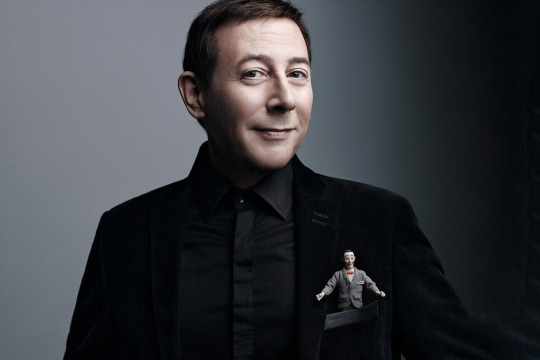
Reubens
Paul Reubens came up in the 1970s comedy scene in L.A. as a member of the The Groundlings. He and fellow Groundling, the late great Phil Hartman, worked on a lot of characters together. In 1978, Reubens created the character of Pee-Wee Herman, a man-child dressed in a suit and bowtie. It slowly started to catch on and soon enough he got an early HBO special in 1981's The Pee-Wee Herman Show. I rented it years later and it was wildly entertaining. Reubens himself had small roles in The Blues Brothers, an episode of Mork & Mindy, Cheech & Chong movies, and more.

Hartman and Reubens on Pee-Wee's Playhouse
In the 80s, there were a lot of comedians who created characters who were celebrities in and of themselves and the comedian was rarely seen outside of that character, i.e. Cassandra Peterson (a fellow Groundling of Reubens) as Elvira or Jim Varney as Ernest P. Worrell. Pee-Wee Herman was among the biggest of those comedic characters. When he appeared on MTV, hosted SNL, or was a guest on talk shows, it was Pee-Wee Herman who was the guest, not Reubens. But the character of Pee-Wee was so engaging: he was childish and but was wildly funny with physical comedy, and there was a real heart to him and had a moral compass that was admirable (i.e. running into a burning pet shop to save all of the animals). The 1980s was an era of comedians who had a unique voice literally and figuratively, i.e. Sam Kinison, Bobcat Goldthwaite, Emo Phillips, Gilbert Gottfried, and Judy Tenuta just to name a few. But Reubens was possibly the most unique voice of all of them.
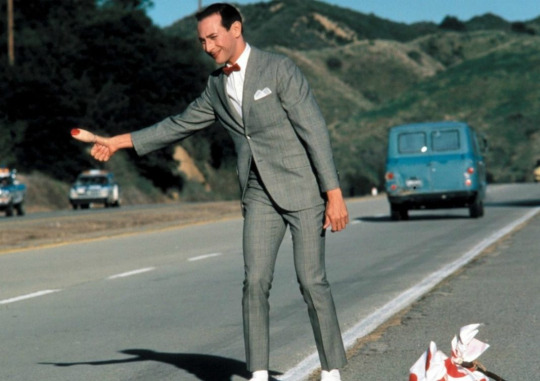
Reubens in Pee-Wee's Big Adventure
In Summer 1985, my Dad took me to the movies to see Pee-wee's Big Adventure , which was a true meeting of the minds of young director Tim Burton making his debut and Reubens. The plot was so simple, but yet it worked: Pee-Wee's bike gets stolen so he has to go across country to find it and along the way there's loads of hijinks and LOL scenes. To this day visitors of the Alamo ask where the basement is! The film is highly quotable and it's also a movie that everyone I knew my age also knew and loved. In the years that followed Pee-Wee had cameos in a number of films including Back to the Beach, Moonwalker, and Flight of the Navigator, which technically wasn't Pee-Wee it was Paul under the pseudonym Paul Mall, but the voice was obviously Pee-Wee. The follow-up movie was Big Top Pee-wee, in which Pee-Wee has a small farm and the circus comes to town, shaking up his relationship. The movie wasn't as bad as a lot of people thought, but it lacked the pure artifice of the last movie. I think people also didn't want to see a movie where Pee-Wee cheats on his fiancee for a acrobat...just not what you expect from a Pee-Wee movie and Tim Burton not directing hurt.

Pee-Wee and friends
But the Pee-Wee character really shined on TV, in the Saturday morning kids' show Pee-wee's Playhouse (CBS 1986-1991). I was still of the age of loving Saturday morning cartoons and shows when it premiered and it was loads of fun: Pee-Wee's wacky and fun playhouse surrounded with various friends, screaming the secret word, being imaginative, and learning from each other was worth tuning in each week. I loved the show and in 1988, I even began buying some episodes as they were released on VHS. I also began buying the toys, talking doll and memorabilia (sometime in the mid-00s I sold my collection to a friend). The genius in the show was that it was super funny, but without being hurtful or mean-spirited. So many talents got their start on the show too: Lawrence Fishburne as Cowboy Curtis, Natasha Lyonne, and behind the scenes you had music by Mark Mothersbaugh, and before-they-were-famous production assistants John Singleton and Rob Zombie. The series became so popular that in 1988, they even did a primetime special Christmas at Pee-wee's Playhouse.

Pee-Wee's Playhouse toys I had as a kid
It's impossible to talk about Reubens without his controversies and run-ins with the law. In 1991, he was arrested for indecent exposure during an undercover police raid of an adult theater in Sarasota, FL. CBS pulled the remaining reruns of Playhouse, toys were pulled from Toys R Us, his voice was pulled from rides at Disney. He was cancelled way before there was cancel culture. True, he was a children's show host on TV at that time. But he wasn't in character or costume and he was inappropriate in, well, an inappropriate place...which in a strange way made it kind of appropriate given the inappropriate location. Whatever your opinion is, he got a raw deal. As a TV host and on the set of his show, he was very good with kids and had really positive lessons. What he did was private and separate from the Pee-Wee character. But Reubens had the last laugh when he presented the 1991 MTV Video Music Awards to uproarious applause and asked "heard any good jokes lately?".
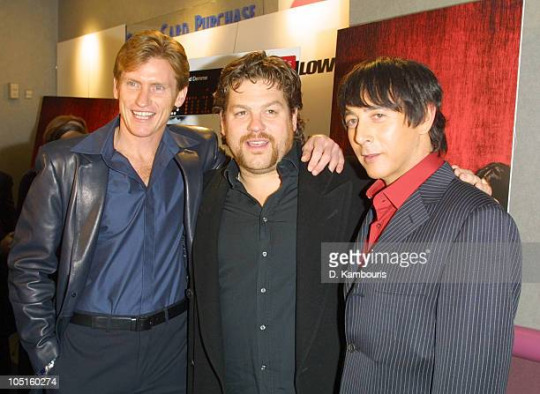
Denis Leary, Ted Demme and Reubens at the Blow premiere in 2001
Reubens did slowly return in some supporting roles separate from Pee-Wee and many of them were scene-stealers: as Penguin's father in Batman Returns, as a vampire in the movie Buffy the Vampire Slayer (one of the greatest vampire deaths ever), the voice of Lock in The Nightmare Before Christmas, as Spleen in the underrated Mystery Men, and as Derek Foreal in Ted Demme's Blow. As Derek, he was the comic relief in the crime biopic, but he also showed off his dramatic skills too. A few years prior to the 2001 release, I was an intern at Demme’s production company Spanky Pictures and the book it was based on was in development. I was blown away by Reubens' performance when I saw the movie.
In 2002 as Reubens' second act was in full swing, another arrest was made, this time it was child pornography charges. Reubens had a apparently purchased bulk collectible magazines of kitsch muscle magazines from the 1920s and some he didn't order were slipped in. I am not defending him, but I think there is an extreme difference between this type of thing and actual criminals like Kevin Spacey or R. Kelly. In 2004, the charges were dropped in exchange for a lesser obscenity charge.

Apatow and Reubens
In the years that followed, Reubens continued to have some small supporting roles including The Raconteurs' music video for "Steady as She Goes", as well as episodes of 30 Rock and Portlandia. Then something happened in the 2010s: Pee-Wee came back! First in some Funny or Die videos Pee-Wee Gets an iPad! and Pee-wee Goes to Sturgis. He, then, did a Pee-Wee live show in L.A. and then Broadway and one of the last ones became the live HBO special The Pee-Wee Herman Show on Broadway. There was also the funny SNL sketch with Andy Samberg where they got drunk on the town together. Interest in Pee-Wee continued and in 2016, there was the Netflix special Pee-wee's Big Holiday, produced by Judd Apatow. I can't say that was bad, but the bar was quite high and it was hard to live up to the nostalgia.
Reubens himself was a comic genius. That's a term I rarely use, but it is fitting for him. He understood comedy and in the last week people who knew comedy have praised him. He had a lot to do with my early interest in comedy. His films, TV and wacky (almost drug-induced) style will be remembered. Between MTV News shutting down and the deaths of Andy Rourke of The Smiths, Sinead O'Connor and now Paul Reubens it is a bad year for nostalgic Gen-Xers like me. But fortunately Reubens' work will live on!
#paul reubens#pee wee herman#rip#the pee-wee herman show#the blues brothers#cheech and chong#pee wee's big adventure#tim burton#back to the beach#flight of the navigator#big top pee wee#pee wee's playhouse#batman returns#buffy the vampire slayer#the nightmare before christmas#mystery men#blow#ted demme#the raconteurs#30 rock#pee wee's big holiday#comedy#film geek#tv
1 note
·
View note
Text
Jodie Foster: A True Veteran Actress
I recently had an interesting experience while having a conversation with a student and his parents about actress extraordinaire Jodie Foster. My student had asked about what movie I was watching and I told him that Silence of the Lambs was the current film. He is only 15 and had seen Foster in Hotel Artemis and Elysium but that was about it. What then occurred was very strange; each person in the area had a different experience and described when they first heard of Jodie Foster and what films she was in. It was fascinating because it was my teenage student, my 40-year-old self, the 60-year-old father, and the late 70s grandmother, all with different stories. I will relate the stories in the order they were related to me with the first name, age, and Jodie Foster experience for each, and hopefully the layers of talent will become apparent:
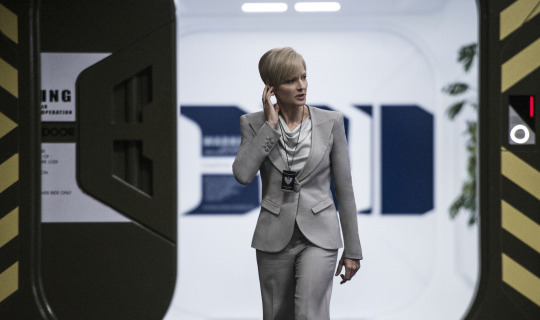
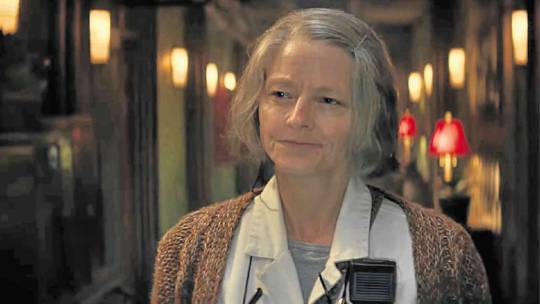
Julian, 15, Elysium (2013) and Hotel Artemis (2018)
So my student Julian had seen Jodie Foster in a couple of more recent movies but was not aware that she has done more directing work in the last 10 years. She directed on episode of Tales from the Loop (2020), an episode of Black Mirror (2017), a couple of episodes of Orange is the New Black (2013), and an episode of House of Cards (2014). Julian was not aware that there was a lot of old age make-up used in Hotel Artemis (2018) and assumed that Foster was older than she is, especially when I said she has been acting since the late 60s. I said that I first learned about her when I was a teen.
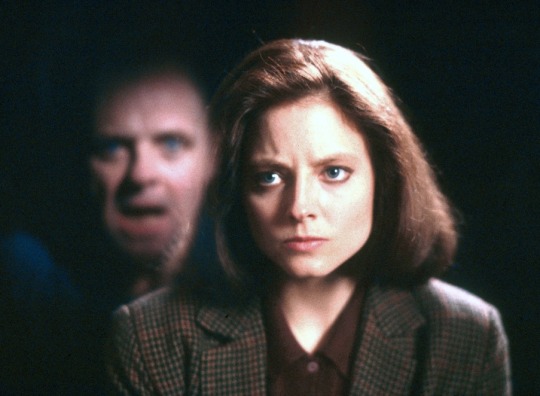
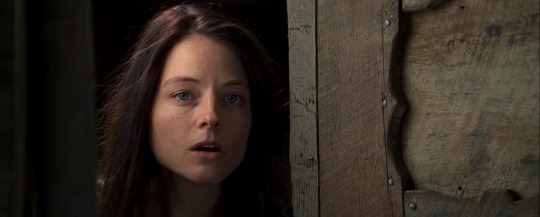
Al, 40, The Accused (1989), Silence of the Lambs (1991) , Nell (1994), Contact (1997), and Panic Room (2002)
Jodie Foster had been around in about one movie a year throughout the 80s, but she had a resurgence to her career, first with The Accused (1989) and then with The Silence of the Lambs (1991), both of which got her Best Actress Awards. In fact, she had two other movies come out in 1991, one which she played a prostitute, Shadows and Fog, and another in which acted as s a mother to a genius child while also directing, Little Man Tate. She remained relevant throughout my high school and college years so I assumed this was the high point of her career. I knew that she had been in the business for a while, but it wasn’t until I got older and studied film history that I realized how long it had been and how many legendary productions she was a part of.
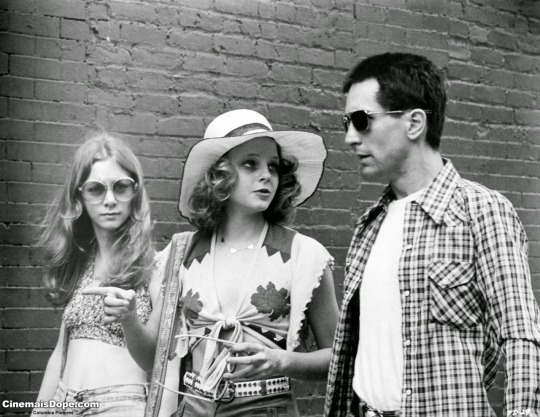
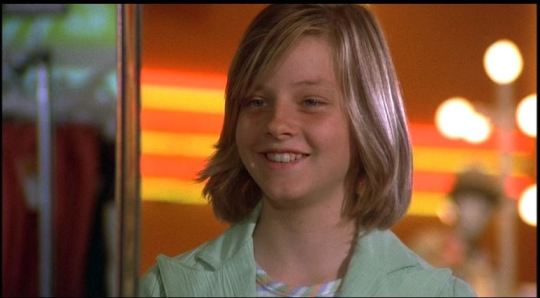
Will, 60, Freaky Friday (1976), Bugsy Malone (1976), The Little Girl Who Lives Down the Lane (1976), Taxi Driver (1976), and Echoes of Summer (1976)
That is not a typo, every single one of those films came out in 1976. My student’s father remembered Jodie Foster from when he was a teen and five movies came out featuring the actress in the same year. Take note of the pictures above; that girl in the center in the black and white photo is the same as the tomboy in the one below. In 1976, she played a girl that switched places with her mom for a day, a gangster’s girl in a child version of the story of Bugsy Malone, a genius girl that traps and kills a pedophile, a 14-year-old prostitute for which she was nominated for Best Supporting Actress , and finally a kid dying of a heart condition who has a last wish of going to Canada. Will said it felt like Foster was in every single movie that year...and she was fourteen.
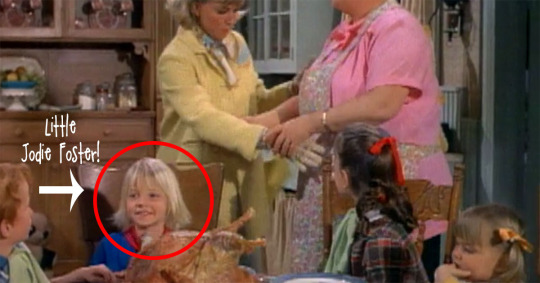
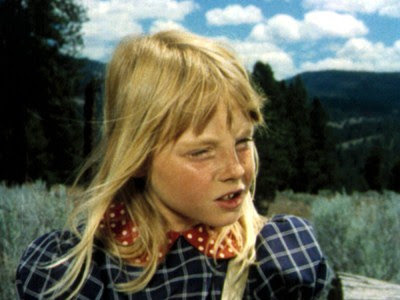
Carla, 78, The Doris Day Show (1969), Daniel Boone (1970), Adam-12 (1970), Gunsmoke (1969-1972), Bonanza (1972), and My Three Sons (1971-1972)
My student’s grandmother remembered Jodie Foster as being in a bunch of TV shows in the early 70s. It turns out that the actress has been working for half a century with 81 acting credits on the big and small screen. She is not even 60 and started working regularly when she was 7-years-old. She played age inappropriate roles to the point that she needed her older sister to be a body double for more racy scenes. All of us agreed that Jodie Foster is a spectacular actress that has major box office draw. She is an American cinema staple and I look forward to rewatching Silence of the Lambs as well as checking out any new projects she is a part of.
#jodie foster#the silence of the lambs#the accused#television#best actress#taxi driver#hollywood actress#actor/director#introvert#introverted#freaky friday#nell#elysium#hotel artemis
59 notes
·
View notes
Text
Favorite Media of 2020!
There was a large swathe of this year during which I was unable to concentrate on reading (as there probably was for a lot of other typically-frequent readers), so, as a result, I ended up listening to way more podcasts and watching way more TV shows. Not a bad thing, but boy did I read way less books than usual.
However, for the first time in a while, the amount of fiction I read was about equal with the amount of nonfiction I read. Last year’s reading resolution was to read more fiction, so...success??
I did read a lot of phenomenal fiction when I had the energy to do so this year.
Books - Fiction
The Martian - Andy Weir

This book is the hardest of the hard sci fi I think I’ve ever read. Every single aspect of it is minutely researched and calculated. The author literally wrote equations to write this book. The science is insanely impressive and yet...it never loses its sense of humor or humanity in the mix. In fact, they’re the thing that drives the entire story.
Warlock Holmes - G. S. Denning
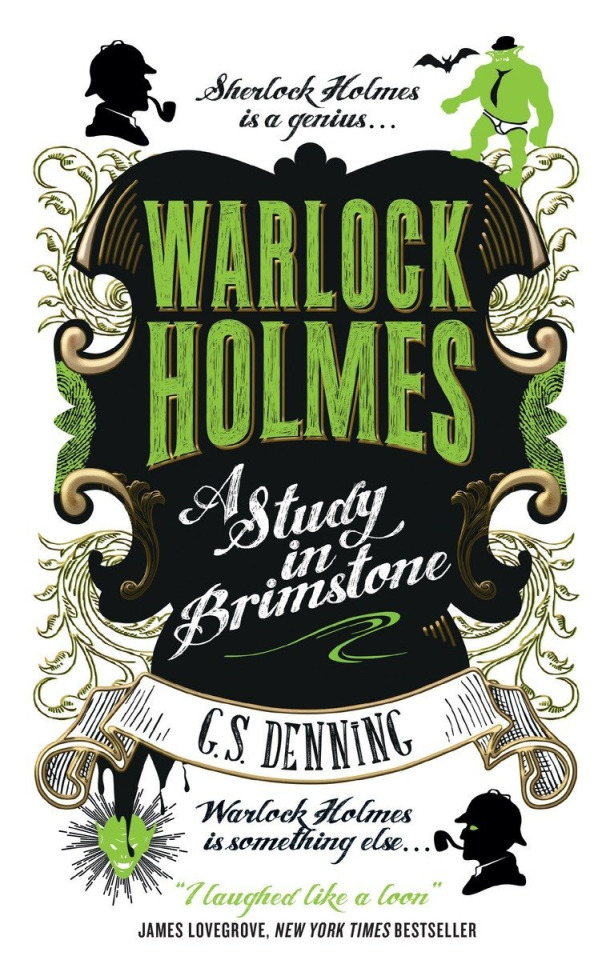
Way early in the year I was strolling down the fantasy aisle at the library, when this cover caught my eye. I took one look at it, went “oh, this looks silly” and...proceeded to devour the entire series in a matter of weeks.
It is very silly. Especially when it’s pointing out something that was silly in the original. There’s something so satisfying about Watson immediately answering Holmes with the correct number of steps in their flat when he’s trying to make his point about how most people don’t pay attention to things like that.
World War Z - Max Brooks
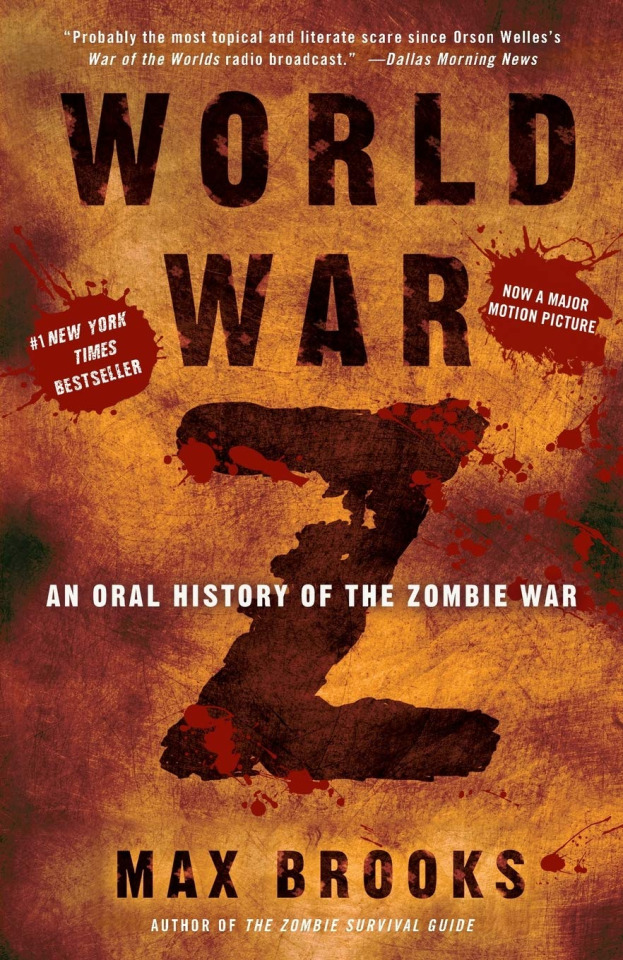
Every single scenario in here could easily support an entire book. A park ranger whose job it is to contain the yearly zombie spring thaw? HECK YES. I’d read tens of thousands of words about that. A Chinese admiral who defaults, steals the government’s premier submarine, loads it up with the families of his underlings and takes to the sea for years to live in the maritime economy that has sprung up in a world where everyone is trying to escape the shore? That could be an entire movie on its own.
Every chapter was more creative than the last and as a huge worldbuilding fan, this book was so, so fun.
An Unkindness of Ghosts - Rivers Solomon
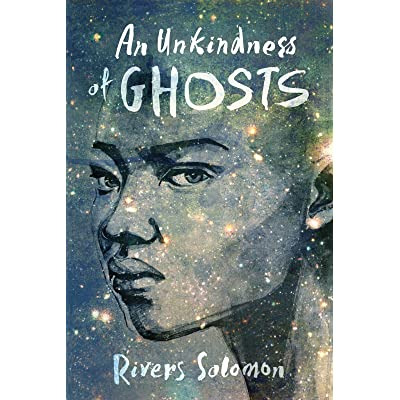
In which a queer, neurodivergent protagonist solves a mystery on a spaceship which is a microcosm of antebellum era politics! This had a beautiful, mysterious, wonder-inducing writing style and it was a joy to peer into the wildly differing minds of every single character.
Books - Nonfiction
Underland - Robert MacFarlane

In every chapter, the author visits a different hole. Basically.
It’s an exploration of caves, catacombs, mines, nuclear waste facilities and the hidden underbelly of every forest. It was fascinating. And fundamentally changed how I look at time.
Rejected Princesses - Jason Porath

After years of having enjoyed the web entries, I finally got my hands on the first book and was not disappointed.
There are the more entertaining entries, of course and the art is as charming as always, but what struck me the most were the more difficult stories. The deeper you go into this book, the more horrific it gets. The author does not hold back on the indignities suffered by the historical figures he writes about. It’s terrible...but also very, very illuminating.
The Gift of Fear - Gavin De Becker
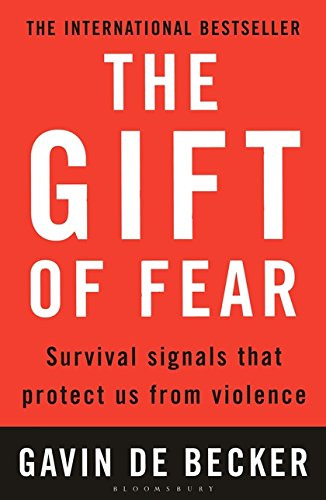
This book - while maintaining all the essential information in it - could be pared down to one sentence in a sea of blank pages and that sentence would be: trust your instincts. End of story.
But in a world where instincts are either customarily suppressed or going haywire, it’s not quite that easy, which is why I’m glad there is more to the book.
I picked it up thinking “ha ha, betcha can’t help a person with anxiety who fears all the time already” and...what it actually ended up doing was giving me the tools to differentiate between real fear and unfounded fear. And did help with the anxiety quite a bit.
Fanfiction
Watch Over Me - cakeisatruth
A Bioshock fic from the point of view of a little sister who is learning how to trust and be an ordinary child again. Dark and sweet. An excellent combo.
All That is Visible - Ultima_Thule
An exploration of a minor character in a well researched historical context? That’s my jam! How did they know?? A Tron fic about what it’s like to be a female programmer in the 70s.
Graphic Novels
The Adventure Zone - McElroys + Carey Pietsch
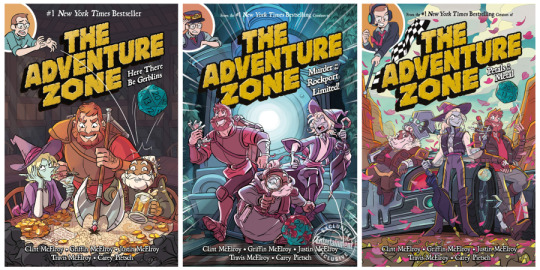
Yesssssssss! It was a running-to-the-library type event whenever my library got a new volume in. The jokes are so good, the art is so lively and the ways in which they added the details that the podcast couldn’t necessarily get across is *mwah*
Trail of Blood - Shuuzou Oshimi

Hoooooooly shit, the art style of this one!! It’s beautifully detailed and expressive, sure, but the real draw for me was how it changes with the emotional state of the main character. There’s this sequence in which he’s consumed with anxiety at school and all of his classmates become blurry and unfocused, until they can’t be recognized as humans at all, that particularly sticks with me.
It’s a horror story about a kid who witnesses his loving mother push his cousin off a cliff for seemingly no reason and is then obligated by her to keep the secret, which is eating him from the inside out. It’s so good, guys, please read it.
Level Up - Gene Lien Yang/Thien Pham
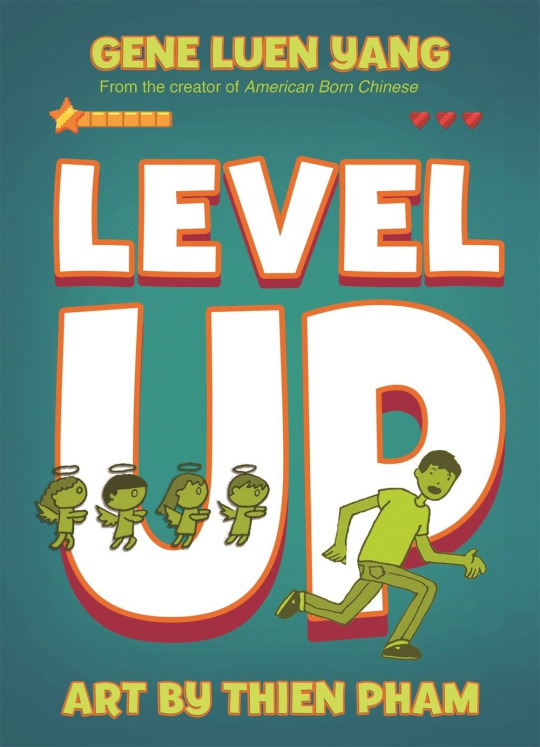
A story about a kid who is haunted by his late father’s desire for him to become a gastroenterologist. It’s funny and touching and the ending gave me what I can only describe as a feeling of exhilaration. Y’know that feeling when something unexpected but not out of left field, perfectly in tune with the narrative arc and gut bustingly funny happens, all in the same panel? That one.
Film
Searching

This is a fairly standard thriller about a dad trying to find out what happened to his missing daughter. It’s also found footage...but not in the usual way, which was what made it so compelling to me. It’s told through the dad’s phone calls, google searches, social media interactions, news footage, security cameras and webcams. It was such a cool way to tell a story.
Train to Busan

There’s a lot that’s already been said about this movie and I don’t think there’s much more I can meaningfully add to that. Suffice to say that ya gotta take care of each other if you’re going to survive a zombie apocalypse!!
TV Series
My Brother’s Husband

As close to a perfect adaptation as a person can get (barring the entire conversation in English which was...oof). I was so happy when they took it a step further and showed Kana and Yaichi actually getting to meet Mike’s family.
Zumbo’s Just Desserts
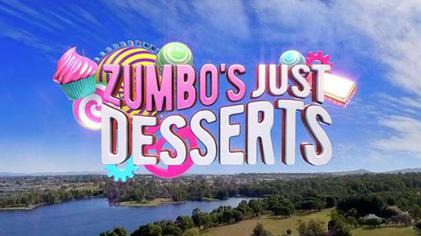
I watched a lot of baking shows this year. Like...a lot. They were my much-needed comfort viewing for the year and this one was my favorite, even over The Great British Baking Show (which I LOVE). Why? Because the pastry chef for whom it’s named makes such bizarre and wonderful desserts and fosters an environment in which the competitors do the same. I’ve never seen anything like a lot of the desserts that make an appearance on this show. Every single episode was an awesome surprise and so help me, this show had better get a third season.
She-ra and the Princesses of Power
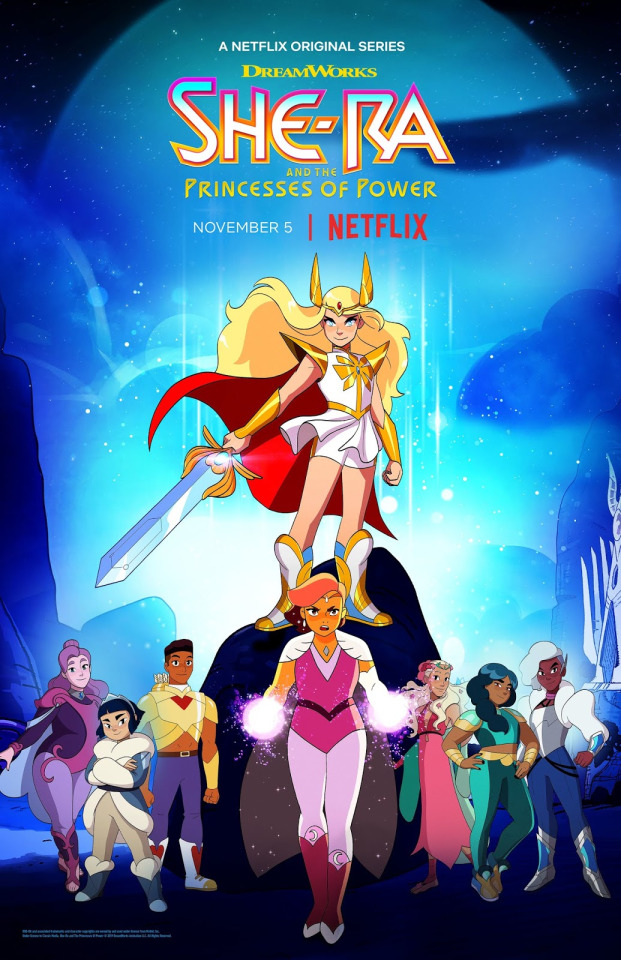
There’s also a lot that’s been said about this one, so I won’t say much more. Suffice to say: DAMN. That’s how you do an 80s toy tie-in cartoon remake.
Infinity Train
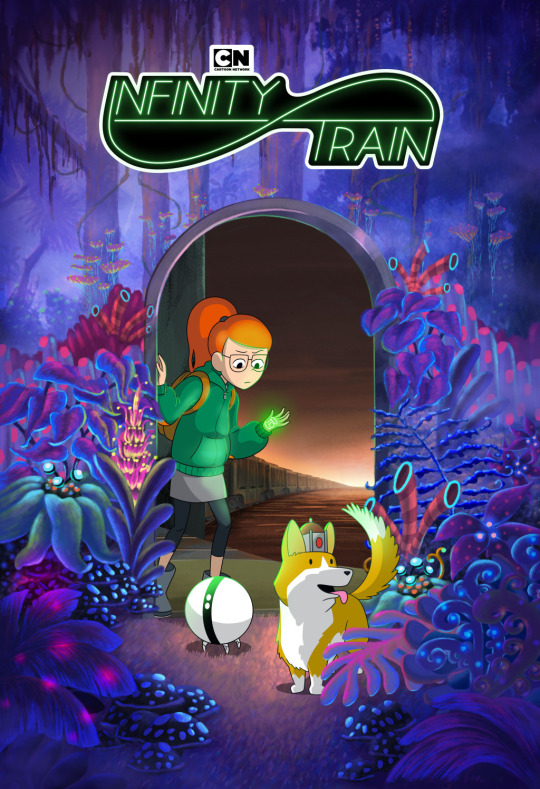
This show’s premise is probably the most unique I’ve seen in recent years. Its balance of comedy, horror and existential dread is also *mwah* I also love how much it trusts the viewer to figure things out on their own.
Primal
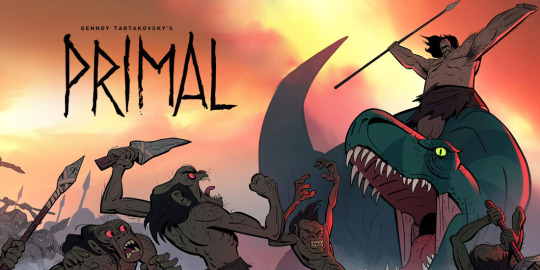
A late entry sliding in before the year ends! I finally got to watch the second half of the first season last weekend and it was EXCELLENT. The pacing, the brutal fight scenes, the adorable dinosaur antics, the animation, the quiet moments - *mwah-mwah-mwah-mwah-mwah*
The most emotional moment for me was the part in which the protagonists watch, with sorrow, as the rabid dinosaur who’s been trying to kill them all night dies an excruciating death.
Also it sets up a fascinating new plotline right before ending in a cliffhanger!! Another one for the ‘had better get a next season’ list.
Games
Night in the Woods
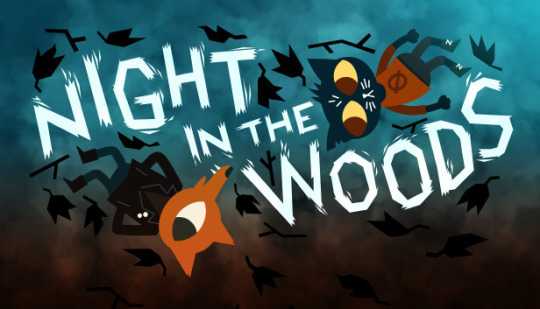
This is one that’s been on my to play list for a few years and I was so glad I finally got my hands on it. It’s like...The Millennial Experience (TM), the game. I felt so seen, playing it. The character writing was fantastic.
Prey
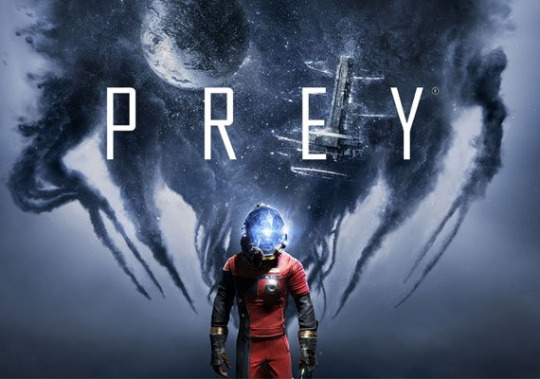
I don’t know why I put off finishing this for so long. I guess I wasn’t in the right alien killing headspace for a while?? Anyway, the setting is gorgeous, the alien biology is weird and cool, the ethics are delightfully murky and the interconnectedness of the station was really cool, especially in the OH SHIT moments at the end.
Podcasts
The Adventure Zone

I tried to narrow this down to one favorite arc, but found that I couldn’t do it. I love Balance for its comedy and creative energy. I love Amnesty for its drama and acting. I am loving Graduation for the depth of its world and the way in which the real story behind everything that’s happened is slowly unfurling. It’s a good podcast all around.
The Magnus Archives
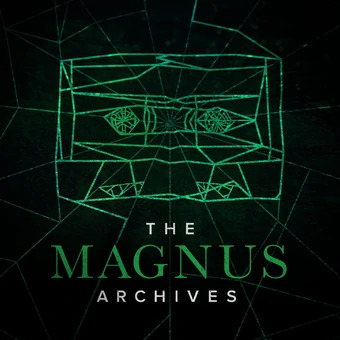
Who obsessively listened to every single season while playing Minecraft in about a month? Surely not me, nooooo. Of course not.
There’s also been a lot said on this one, so I’ll keep it brief. I’ve seen things in here that I haven’t really seen elsewhere in horror. My particular favorites were the creepy psychiatric hospital in which the horror comes not from the patients, but from the denial of the doctor to believe them about their mental illnesses and every single thing related to the Anthropocene. The one with the Amazonian village made out of trash - CHILLS.
#tma#taz#prey 2017#night in the woods#infinity train#warlock holmes#she-ra#zumbo's just desserts#a thought
10 notes
·
View notes
Text
Continuity
I’m still reading Star Wars comics from the original Marvel run of 1977-1986. Last night, I made it to the Return of the Jedi adaptation, so now I’ve read all the issues set between that movie and Empire Strikes Back. As I expected, these comics (#45-80) feel a lot more like authentic Star Wars stories than the pre-ESB issues (#7-38). The biggest plot hole that I noticed was that Luke still has his lightsaber throughout this period, despite losing it on Bepsin.
It occurred to me later that this wasn’t necessarily a mistake. There’s a deleted scene from ROTJ which shows Luke assembling his new lightsaber right before the mission to save Han Solo from Jabba the Hut. This strongly implies that Luke didn’t have a lightsaber of his own between Episodes V and VI. This was further supported by the ROTJ radio drama, produced in 1996, which incorporates the deleted scene into the story. There, Luke expresses frustration with how difficult it is to build a lightsaber, and then he finally realizes that he should have been using the Force to assemble the pieces. I haven’t read the novelization of the movie, but maybe it was touched on there as well.
Later sources indicated that building your own lightsaber is the final ritual for completing your Jedi training. This is shown in the 2002 Clone Wars cartoon, where Barriss Offee assembles her own saber on Ilum, under the supervision of Luminara Unduli. I’m pretty sure this scene was inspired by Darth Vader’s line in ROTJ, when he observed that Luke’s training is complete after checking out his badass green lightsaber. The implication is that building your own lightsaber is difficult enough that Luke would have to be a Jedi Knight just to pull it off.
But in the early 80′s, none of that lore existed, and it would be a simple matter for writers to assume that Luke had no trouble at all getting a spare. What I find strange is that no one bothered to explain where this spare lightsaber came from. It’s like the writers just assumed he never lost the first one, but that’s crazy.
Really, the artists on the original Star Wars comics never seemed to be able to keep track of the lightsabers to begin with. In the early comics, they paid no heed to the color schemes or hilt designs at all. Not that I would expect late 70′s artists to really worry about props from a movie that had just come out, but they kept coloring all the lightsaber blades at random, and drawing the hilts way too short and thick. Luke and Vader looked like they were holding soda cans. The art started to get more true to the movies when Tom Palmer got involved, but one thing I started to notice was how the artists would draw Luke and Vader’s lightsabers on their belts, even when they were holding them, ignited, in their hands. It was like the artists recognized the lightsaber hilts as part of the characters’ costumes, but they didn’t understand what they were. I can’t really blame them for this, since the big column of light was what really drew everyone’s attention in the theaters, and it wasn’t like they could look up hilt schematics on Wookieepedia like you can now.
Anyway, it struck me as kind of interesting how something minor like that can start off as an oversight, and then be easily corrected, or magnified into a major plot hole. It’d be pretty simple to explain Luke’s between-movie lightsaber.
Obi-Wan Kenobi had a spare tucked away somewhere, and Luke had been keeping it in storage just in case something like this happened.
Yoda had a spare, and Luke took it with him when he went to Bespin, and put it inside R2-D2′s lightsaber compartment for safe keeping.
Luke found a new lightsaber on a mission.
Luke built a new lightsaber to replace his old one, then lost that guy, requiring him to build the green one in ROTJ.
Luke found/constructed a replacement weapon, but it’s actually a knockoff “laser sword” and it doesn’t work as well as a genuine Jedi design, but it got the job done until he could do the job right.
I find it curious that no one ever bothered to tell any of those stories, though. The Expanded Universe era of Star Wars multimedia seemed determined to sew up as many continuity problems as possible. Some writer in the 2000′s did a story to establish that Jedi would swap lightsabers as a gesture of mutual respect, just to explain why Mace Windu’s action figure has a different lightsaber design than the one he has in the movies. I’m not too worried about this stuff, and I don’t think Jo Duffy or David Michelinie were too worried about this stuff when they wrote Luke carving up Stormtroopers in Star Wars #45-80, but between 1994 and 2008, there were people working for Lucasfilm who were paid to worry about this stuff. I’m genuinely surprised that no one ever got around to penning Star Wars: Luke’s Spare Lightsaber: The Lobot Chronicles: Dark Tidings.
It’s the little things like this that get lost in the shuffle, I’ve found. When you read a Star Wars novel or comic book, the major characters are always very consistently portrayed, and the story always sticks very closely to the groundwork laid down in whatever movies were around at the time. Star Wars #45-80 excelled at this. Every issue was either about the good guys searching for Han Solo, or dealing with a crisis big enough to pull them away from the search for Han Solo. I was disappointed that they didn’t spend much time at all having Luke work on his Jedi training, or trying to make sense of Darth Vader being his father, but I think Marvel knew the next movie would address that, so they knew not to wade too deep into that stream.
The stuff that gets changed the most is the minor characters. I read one issue where they basically established that Wedge Antilles never made it off the base on Hoth in ESB. He and “Nice Shot” Jansen had to take cover in the AT-AT Luke blew up, and then they lived in what was left of the base while they waited for the imperials to clear out. He was stranded there for months, and it was a pretty cool story, but I’m betting that later Star Wars writers decided to ignore this, because they wanted to use Wedge in other stories during that period.
General Tagge’s another interesting example. He was the guy on the Death Star in Episode IV, the one who warned that the Death Star was vulnerable while the Rebels had the stolen plans. Tagge’s kind of a walking continuity error to begin with, because everyone kept getting him mixed up with Admiral Motti, the guy who sassed Vader and got choked out for his lack of faith. In the Archie Goodwin run on Star Wars, Tagge was killed in the movie when the Death Star exploded, but his brothers and sister turned up as recurring villains with a grudge against the Rebels and Vader alike. Flash forward to 2015, when Disney took over Lucasfilm, and in the new continuity, Tagge survived the Death Star’s destruction because he happened to leave right before it went to Yavin IV to get blown up. This was done mainly to set him up as a rival to Darth Vader in the 2015 Darth Vader comic. I guess they figured there was no reason to invent new characters when they could just salvage some of the officers from the movie. Tagge feels more authentic than his siblings because we actually saw him on film. He’s a “real” Star Wars guy, while rest of his family are just cartoons. I think that’s the attitude anyway. Back in 1978, they were probably eager to create new characters because they had tons of world-building to do. So the 2010′s Marvel comics don’t square with the 1970′s Marvel comics at all, especially where the Tagges are concerned, but Darth Vader’s dealings with them feel pretty consistent.
The reason I bring up all of this is because I used to think that the continuity in Star Wars was never terribly complicated. When production of The Force Awakens got started, Lucasfilm announced that they were rebooting the whole Star Wars canon, declaring all the Expanded Universe content as “Legends”, which no longer counted as official continuity. The only hard canon sources from now on were the movies, the Clone Wars TV series, and anything published after that announcement. Naturally, all the post-Return-of-the-Jedi stories would be off the board, which only made sense to me, seeing as Force Awakens would contradict it. But I figured the other stories could still be made to fit together somehow, since none of them had anything to do with Rey or Kylo Ren or the First Order, or whatever.
But really, it’s been like that all along. The novels and comics would introduce some idea, and others would build on it, and then George Lucas would override it with his next project. Then the writers would have to pick up the pieces. The 2008-2013 Clone Wars TV series trampled on a lot of continuity from the 2002-2005 Clone Wars books and comics, primarily because George Lucas worked on the TV series, and he was the final word on this stuff. That announcement in 2014 pissed off a lot of Expanded Universe fans (so much that they bought a bunch of billboards to complain about it), but it was kind of inevitable. They’ll probably have to wipe the slate clean again around 2040 or so, because there’ll be enough new movies that the comics and novels won’t align with them.
I sort of half-joke about my own fanfiction getting this kind of treatment. My goal is to write stories that could fit into the established continuity, but I can only work with the continuity I know. With Dragon Ball, that was easy, until Dragon Ball Super got underway, and Akira Toriyama started writing new stuff. It was pretty easy to write my own female Super Saiyan, until DBS introduced a couple of their own, and now I have to wonder if they’ll say or do something that might contradict my own take. Likewise, this Broly movie might establish some new lore that I need to take into consideration. I can write new material to work around those things, but the stuff I’ve already written is pretty much locked in. My private joke is that in any of these new animations, a character will just stare at the screen and coldly announce that “Mike’s fanfic never happened.”
But that’s pretty much what Lucasfilm has been doing to the novel and comics writers for over forty years. “Splinter of the Mind’s Eye” would have been the official sequel to Star Wars if Empire Strikes Back hadn’t been funded. Instead, Dengar and Bossk looked at the screen and said “Alan Dean Foster’s novel never happened.” Return of the Jedi killed every Luke/Leia shipper’s hopes and dreams. “Oh, those fanfics never happened, my young friend,” Ben Kenobi said from beyond the grave. Attack of the Clones wreaked all sorts of havoc on Boba Fett’s backstory. The Force Awakens wrecked the Skywalker-Solo family tree. “Han and Leia only had one kid, and I’m gonna kick his ass!” Rey shouted asskickingly. And on it goes. I read that one writer resigned after they retconned all the stuff she had set up about Boba Fett’s home planet, but that’s the way the game is played, unfortunately.
Me, I’m just writing my stuff for fun, when it comes down to it. I like to think all the continuity can be fit together, but the reality is that there’s too many redundant pieces, so they can’t all be part of the same picture. You can either have Tagge or his brothers, but not both. You can decide to keep Ben Solo or Jan and Jeice Solo from the EU novels, but not both. Or you can do an AU, I guess. They’re all AU’s when you get down to it.
I suppose that, no matter what, I prefer my own assumption that Luke just didn’t have a lightsaber between Empire and Jedi. I’ve read too many stories about how there’s more to a Jedi than his lightsaber, and how the best Jedi never use them at all, so it makes sense to me that Luke had to make due without one, and use the loss to force him to refocus on his training. While the others searched for Han, he was doing cool Jedi homework that he should have been doing on Dagobah, and he purposely waited until he was finished before building a new lightsaber. That just makes too much sense to me, even if some other version is presented. But the other stories are still fun to read. They don’t have to be canon to be enjoyable.
#/#//#///#////#/////#star wars#writing#i still cannot believe those guys blew four grand on billboards#like someone at disney was going to see those and publish the next round of eu novels#'holy crap! a billboard! those nerds mean business!'#the post rotj eu stuff was trash anyway#they killed off chewbacca in those#that's all you need to know#the sequel trilogy has plenty of chewbacca for everyone#they know what people want#and it's chewbacca#not 70 year old boba fett running around with his grandkids#not jaden skywalker-solo-organa-fett-thrawn marrying starkiller from force unleashed#i do wish they'd write some more sith novels#but that was always an option
7 notes
·
View notes
Text
Do you or have you ever owned a cup with your name on it?
Nope.
What’s the most expensive crafts tool that you own?
I don’t have any expensive craft tools.
Have you ever woven baskets of any kind (wicker, paper, cardboard etc.)?
No.
How do you like Great Balls of Fire by Jerry Lee Lewis?
I’m familiar with the song, but I wouldn’t say it’s a favorite song of mine or anything.
Speaking of Jerry Lee Lewis, have you seen the biopic about him?
Nope
How about the biopic about Tina Turner?
Nope.
Do you like the TV-show Frasier?
No. The Hallmark Channel plays a few back-to-back episodes of The Golden Girls at night and then afterwards a few episodes of Frasier before I Love Lucy. I always change it when Frasier comes on.
What’s something you know by heart?
A lot of things, I suppose. Lyrics to many songs for one.
How valuable does a coin have to be for you to bother to pick it up?
I’d probably stop to pick up a quarter.
What would be something you would wait in line to get for free?
Coffee.
In Finland people wait in line for free buckets.
Oh.
Has there ever been a leak anywhere in your house?
Yes.
Have you ever slipped in the shower?
No.
Have you ever made any decorative crafts? If so, are they displayed?
Nope.
Is it very humid where you are right now?
No.
What is the most suggestive thing someone has said to you?
Uhhh. I don’t know.
Do you have friends who you playfully flirt with?
No.
Doesn’t the Z in the Bzoink logo look like an L to you, too?
No.
Did you ever take that 5000 question survey that was circulating Tumblr?
I took most of it. I still have yet to finish it. It would get overwhelming and I’d take breaks from it, which usually resulted in me forgetting about it entirely. It’s been awhile since I did one of the parts.
Have you ever had to change a zipper in your favourite article of clothing?
No.
Do you prefer buttons or zippers in general?
Zippers.
Did you grandma have a box full of pretty buttons?
She had that cookie tin, you know the one, with sewing supplies and whatnot. Why do all grandparents have that?
What’s the most exotic spice in your spice rack?
I wouldn’t say there’s anything “exotic” in there.
Do buttons tempt you to press them?
No. I’m more afraid to if I don’t know what it’s for.
Do you have a favourite television host?
Dr. Phil.
What’s your opinion on celebrity chefs?
I don’t care.
Back when it first started, did you watch ANTM?
Not when it first started, but I watched a few later seasons. I watched the last 2 latest ones. The one where it came back and Rita Ora replaced Tyra and then the last season that was on where Tyra came back.
Did you know, that there was even a Finnish version of ANTM?
Nope.
Are you accident prone?
Not usually.
Have you ever broken something really valuable?
Yes.
What do you see as timeless?
A lot of the songs I like that are from the late 60s, 70′s, 80s, 90s, and early 2000′s.
What is something that you own, that has sentimental value?
A lot of things.
Have you ever had your own website?
I had a freewebs or whatever that I made before as a fansite.
What’s your favourite board game?
I love board games in general.
How about your favourite card game?
Cards Against Humanity, ha.
What’s something that you finished recently?
My cup of coffee.
What’s the smallest town you recall visiting?
This little unknown town in my state where my grandparents stayed once while they were visiting (they live out of state, but travel in their RV every summer to visit). I don’t remember why they chose that particular town that year.
What’s the longest distance you’ve had to go to work or school?
Not far at all. My college was local and less than a 10 minute drive away.
Would you learn a new language, if you didn’t share one with your lover?
Sure. I guess I’d have to in that case.
Do you have friends who are constantly tagging you in challenges on FB?
Not challenges, but I have a friend who is always tagging me in some giveaway thing they’re entering on Instagram or Twitter. It’s actually rather annoying.
When it comes to chocolate, do you prefer nougat, jelly or caramel filling?
I’m not a fan of fillings in my chocolate, really. It depends, though.
Are you more concerned about winning than just participating?
No.
Has somebody you know taken their own life?
No.
What is a number that has some significance to you? Why is that?
8. I don’t know why, but it’s been my favorite number since I was a kid.
Do you prefer onions, leeks or chives?
Chives.
What’s the most adult thing you have to do every day?
I can’t think of any “adult” thing I have to do everyday. The most adult thing I do I’d say is pay bills.
What’s the most immature thing you like to do every day?
I don’t think I do something everyday that would be considered “immature.” *shrug*
Have you seen the movie, Clue? If so, isn’t it fab?
Nah.
Do your cheeks get flushed easily?
Yes. I get warm easily.
Do you blush easily in general?
Yes.
Are there any social cues you miss entirely?
I’m usually pretty good with that stuff.
When someone doesn’t smile back at you, what’s your first thought?
It makes things awkward.
Is there a person who melts your heart just by looking at you?
My doggo. ha.
Have you ever had tom kha kai?
Nope.
Have you, or anyone you know ever been rude to a server?
I never have, but I know people who are.
What’s something you’re opinionated and very vocal about?
Meh.
^When’s the last time you had to verbally defend your stance?
I’m usually one to keep quiet about that stuff.
Have you ever played BitLife?
Nope.
What’s something you regularly order online?
I do a lot of shopping online. Usually for clothes or ordering food.
When’s the last time you made a penpal?
We had one in 3rd grade.
Do you often make friends online?
I used to.
Do people ever try to get something from somebody through you?
No.
As in, they ask you to ask the person they should be asking in the first place. If that makes sense.
It’s happened, but it’s not something that happens often.
What do you think when you see a couple holding hands?
Sometimes I’ll think, “aww” and other times I don’t give it much thought.
Gay couples and old couples make me go, “Awww!”
Okay.
Is there anything you’re forced to share with someone else?
No.
What’s something stripy that you own?
I don’t think I have anything.
How about something polka dotted?
I don’t think I have anything like that either.
What is something you find absolutely appalling?
Lots of things.
Do you like elevators?
Not particularly, but I don’t have a choice if I’m somewhere with stairs.
What’s the first thing that comes to mind when I say “midnight madness”?
Nothing, really.
What is a country you would never want to visit?
Hmm.
When you’re angry, does it ever get physical?
No.
What do you do, when you’re immensely happy?
I’d have to really think about the last time I was “immensely” happy.
What made you scream out loud the last time you screamed?
I don’t recall.
Can you hear your neighbours through the wall?
Sometimes.
What is something that frustrates you to no end?
My current situation.
Do you wear shoes indoors?
No.
Who is your favourite stand-up comedian?
I don’t have one.
What’s the weirdest video youtube has suggested to you?
Who knows.
What’s the funniest infomercial you’ve seen?
Those ridiculous ones where they over exaggerate and the person like trips over nothing and knock everything over or something. You know the ones.
Is there a drink that just goes right through you?
Coffee and water.
Is there a food item you can’t eat because it doesn’t agree with you?
Spicy food. :( I used to eat spicy food all the time, but after I had surgery on my intestine things weren’t the same.
Do you playfully compete with someone about something?
When playing board games.
Would you rather swim or run?
Run. I can’t swim.
Do you like the smell of tar?
No.
Have you ever been to a sauna?
Nooo, and I’d never want to.
Does your doorbell ring unexpectedly often?
No.
Is your favourite fictional character a human, an animal or something else?
Human.
Have you ever helped a stranger? If so, what did you do?
Yeah like with directions. Although, I don’t know how helpful I really was. I’m actually the worst with directions.
Do you share hobbies with any of your friends? What do you do together?
What friends.
Do you have any flags on display? If so, what flag(s)?
I have a big Swedish flag on my wall.
2 notes
·
View notes
Text
Liberated Audio Reviews
Blake's 7 - Liberator Chronicles Vol. 4 Review
RELEASED MAY 2013
Recorded on: 22 February, 18 April and 3 July 2012, and 4 January 2013
Recorded at: Moat Studios
Review By Robert L. Torres

Promises by Nigel Fairs
'Saurian Minor. A dead rock in space.
Cally is alone with Travis, Blake's mortal enemy, both trapped on this desolate world - and someone has brought them here for a reason.
As they delve into the past, a long-hidden secret that links them both is uncovered.
Gradually, the truth about Scetona Clorensis will be revealed...'
This is a superb two hander/dual focused story starring Jan Chappell as Cally and featuring the return of Stephen Greif to the role of Space Commander Travis.
From the moment he was introduced alongside Jacqueline Pearce's Servalan in the Series A episode 'Seek-Locate-Destroy', I have loved the character of Travis. He was the Javert to Blake's Jean Valjean, and I was pleased as punch to hear Stephen Greif's dulcet tones give life to this character once more.
As an aside, I have always preferred Greif's portrayal of the character over that of Brian Croucher's. Nothing against Brian Croucher as a performer, as I feel he did great in 'Robots of Death' and the Kaldor City audios. However, Stephen Greif gave Travis a nuanced and layered performance, which gave his obsession with bringing Blake to justice a certain subtlety in its intensity... All of which was sorely lacking in Croucher's portrayal.
The story itself, which is very well written by Nigel Fairs, allows both actors to showcase aspects of their characters we never got to see portrayed onscreen while still remaining true to what was shown onscreen. Its interesting that this story is basically a sort of return match for Travis and Cally, and a great opportunity for Cally to get some payback following on from the events of the aforementioned 'Seek-Locate-Destroy'. Jan Chappell and Stephen Greif do exceptionally well with the material, as it was nice to see their antagonism focused and concentrated without the presence of Blake and company. It was rather nice having the tables turned between them, and for very specific reasons.
I loved how this story explored the events that ultimately led to Cally's introduction to the series in the episode 'Time Squad'. And it was also rather nice to gain some backstory on Travis and I especially loved how the dual focus for their stories was tied to the character of Scetona Clorensis.
9 out of 10 Plasma Bolts
All in all, a great opening story to volume four.
Epitaph by Scott Harrison
'When the Liberator picks up a distress call from a stricken ship, Jenna and Vila teleport across. For Jenna, it's the chance for a reunion with a fellow smuggler.
But the cry for help is not what it appears, and Jenna will meet the surviving members of her family.
The reunion will take her on a deadly mission - one from which not everyone will come out alive...'
This is another fantastic story, this time focused on another one of my favorite characters from the first two seasons: Jenna Stannis, once again played by the lovely and talented Sally Knyvette.
Before getting into the story, I have to say that I thought Jenna was awesome right from the start. However, I felt that she wasn't given enough to do or much to work with over time. It was very disheartening to see this beautiful, badass ace pilot be reduced to, as Sally Knyvette herself put it, "the Liberator Housewife".
I felt it was quite unfair to her as an actress that her character got the short end of the stick in terms of character development, agency and plot relevance. Which is why its no surprise she left after Series B.
Kudos to BF for doing everything in their power to right this terrible wrong even before crafting this brilliant Jenna-centric story.
In Volume 1's 'Counterfeit', there is a point in the story where Blake describes a moment where Jenna actually posed as Supreme Commander Servalan for one of their missions. And you have no idea how much I would have loved to have seen that happen onscreen.
As an aside, credit to Nigel Fairs and Simon Robinson for the music composition work they've done on the Blake's 7 range. They manage to recreate the otherworldly retro future soundscape created on a Casio Keyboard that was very indicative of late 70s early 80s era low budget scifi on TV in the UK.
Anyway, this story sees Jenna reunited with her brother and sister-in-law, forcing her to deal with the ramifications and consequences of her decision to join Blake's fight against the Federation. Its a great story that is well supported by Michael Keating as Vila, as it allows Jenna to be the badass babe she was always meant to be. The plot provides Knyvette with some great character exploration, as well as some great introspection over whether being a stronger person equates with being a better person. As a bonus, the story even sows the seeds for Jenna to have her own Travis-like nemesis in the form of Marshall Cade.
9 out of 10 Plasma Bolts
If Knyvette had been given more material like this during her time on the show, she probably wouldn't have left.
And don't worry... The Marshall Cade plot thread will be picked up again in the full cast audio 'Mirrors'. But that's a review for another time.
Kerr by Nick Wallace
'Supreme Commander Servalan believes she has a vital insight into the Liberator crew - a clone of Avon.
He looks the same. He sounds the same. He even appears to think the same.
And he offers to spring a trap that will bring down Blake and his crew.
But can the clone be trusted?'
We close out Volume Four with yet another excellent story.
The central focus of the story is once more on Supreme Commander Servalan, played to perfection by the late Jacqueline Pearce. It is here that we witness Servalan's latest plot to ensnare Blake and the crew of the Liberator from the perspective of the Supreme Commander herself. The plot itself involves utilizing a clone of Avon to devise a winning strategy, which also involves an old ally from Avon's past.
The notion of utilizing clones is familiar enough to anyone that saw the Series B episode 'Weapon' (ideas and concepts that will FINALLY be followed up on in the upcoming Worlds of Blake's 7 boxset 'The Clone Masters').
Despite the fact that LC Volume 4 indicates that this story is meant to take place during the events of Series A, it doesn't really feel like a first season story. For one thing, Servalan didn't officially meet the Liberator crew until the Series B episode 'Pressure Point'. For another, its during Series C and D that we have the back and forth sexual tension between Avon and Servalan. As such it wouldn't make a lot of sense for Servalan to specifically have a clone of Avon created for one of her schemes before she even met him. So, setting this story between 'Pressure Point' and 'Trial' makes a lot more sense, especially given what transpires in the story itself.
Its an excellent story that showcases Servalan's fascination with Avon fairly early on, and highlights well the similarities and flaws in both Avon and Servalan. Both are intelligent as well as ambitious. Both tend to have ulterior motives and are not above employing subterfuge, guile, deceit and manipulation of others in order to achieve their goals and agendas.
While Avon often knows he is the smartest person in the room and often finds most people annoying (usually Vila), he doesn't completely dislike people. But his problem is that he doesn't completely trust people. And it seems that even his clone, Kerr, shares that particular character flaw.
Servalan shares with Avon a profound sense of confidence that borders on arrogance. But what compounds that arrogance is Servalan's smug, self-centered sense of superiority. She treats people as little more than disposable pets, useful and able to provide amusement, but otherwise are unimportant.
In addition, her egocentric narcissism essentially has her view everything and everyone as beneath her. She believes all and sundry are meant to serve her will without question or discussion, and rudely dismisses any attempt made by those she sees as lesser to engage with her socially or intellectually.
The only one she feels could even be CLOSE to her equal is Avon. And yet, even with a clone of Avon, Servalan cannot help but treat him as little more than a dog on a leash rather than as a person.
But of course, we all know what happens when a dog is mistreated too often by its owner... Don't we?
10 out of 10 Plasma Bolts
A brilliant story that also nicely foreshadows (in a retroactive manner) certain events in Series D, and may even provide some valuable context and insight into Avon's actions and mindset during the final moments of the series finale.
Final score for Liberator Chronicles Volume 4 in its entirety is 9 out of 10 Plasma Bolts.
An outstanding step up in quality that demonstrates Big Finish's enduring policy of maximizing potential in both character and story development that had otherwise been left unfulfilled. Highly recommended.
0 notes
Text
Kinda tagged by @cole-saberhagen - I don’t know why I did this
rules: answer these 85 questions and tag 20 people. Tagging whoever wants to sit through this!
— what was your last…
1. drink: Water
2. phone call: To my mum, telling her I’d be late home today, and just moaning in general
3. text message: To my friend, about next year’s module choices at uni
4. song you listened to: Little Sister - Trixie Mattel
5. time you cried: umm, the other week from laughing I think?? from sadness, idk
— have you ever…
6. dated someone twice: lol, no
7. kissed someone and regretted it: Yep
8. been cheated on: No
9. lost someone special: Yeah
10. been depressed: Yeah
11. gotten drunk and thrown up: Nope! I absolutely hate being drunk, and have a phobia of vomiting so I can blissfully avoid it :D
— fave colours
12. Purple
13. (dark) Red
— in the last year have you…
15. made new friends: Yeah
16. fallen out of love: with Ewan McGregor no
17. laughed until you cried: I cry all the time tbh, unless I’m sad. like literally, I yawn and I look like I’ve just been told something devastating
18. found out someone was talking about you: yeah, it’s only been something bad twice though.
19. met someone who changed you: yeah
20. found out who your friends are: I think so?
21. kissed someone on your facebook friends list: No
— general
22. how many of your facebook friends do you know irl: All of them
23. do you have any pets: one cat!
24. do you want to change your name: Not really, this probably sounds weird but I just don’t care about my name tbh
25. what did you do for your last birthday: I can’t actually remember, although the birthday before that my family was camping and everyone ditched me to take my sister fishing and I’m still bitter
26. what time did you wake up today: 6:30, so I screamed internally and woke up again just after 9:00 and was late for uni
27. what were you doing at midnight last night: Watching B99
28. what is something you can’t wait for: Sunday! I’ve got the day off work because of Easter, so I get to start my two weeks off early!
30. what are you listening to right now: I’m listening to Spoils of War, Pt. 2 - Ramin Djawadi because I’ve been writing an action scene and I wanted some tense action music to kinda reflect that.
31. have you ever talked to a person named tom: Yes
32. something that’s getting on your nerves: uni, atm. Each lecturer has completely different standards about how assessments should be written and it can be really unfair and confusing sometimes.
33. most visited website: Tumblr or Reddit
34. hair colour: Blond
35. long or short hair: Short
36. do you have a crush on someone: always
37. what do you like about yourself: that I’m actually kinda clever?? that probably sounds kinda snobby but normally I just go through life thinking I’m dumb but I know my stuff, most of the time
38. want any piercings: not really
39. blood type: I have no idea! Let’s hope I don’t need to know anytime soon!
40. nicknames: I don’t really have any tbh, feel free to come up with some though
41. relationship status: Single
42. sign: Leo
43. pronouns: He/Him
44. fave tv show: B99 currently, probably Westworld when it comes back
45. tattoos: I have ideas, but I’ll probably never go through with them.
46. right or left handed: Left
47: ever had surgery: A couple of times, I had some teeth removed to make room for braces a couple of years back. I’ve also had my arm bent back into shape, and a couple of nasty moles removed. Nothing major though!
48. piercings: No
49. sport: lmao
50. vacation: I’ve got lots of places I want to go really. Mexico, Egypt, Rome, Athens, India, to name a few.
51. trainers: I haven’t really worn them since I left school :/
— more general
52. eating: I’ve finished two packets of biscuits within the last two hours and I am fully regretting it
53. drinking: I’m looking mournfully at my empty water bottle as I type this
54. i’m about to watch: a 3 hour video covering the latest episode of Telltale’s Batman game, because while I love the story, I cba to play it
55. waiting for: May 25th, because then I’m done with uni until October
56. want: uhhhh, to go back in time and tell myself not to eat two packets of biscuits
57. get married: it’s not a goal of mine but honestly if Tom Holland showed up at my house in the morning and asked me, I’d be down that aisle so damn quickly
58. career: I have a job in retail but it’s not really a career :s
— which is better
59. hugs or kisses: Hugs
60. lips or eyes: Eyes
61. shorter or taller: Taller
62. older or younger: (slightly) older
63. nice arms or stomach: don’t make me choose
64. hookup or relationships: meh
65. troublemaker or hesitant: I don’t really mind either way
— have you ever
66. kissed a stranger: No
67. drank hard liquor: No
68. turned someone down: Yes, I feel bad but not for long
69. sex on first date: No
70: broken someone’s heart: At least twice
71. had your heart broken: Yes
72. been arrested: Nope
73. cried when someone died: Yep :(
74. fallen for a friend: Once, and I wish I could have stopped myself lol
— do you believe in
75. yourself: most of the time!
76. miracles: ehhh, sometimes??
77. love at first sight: no
78. santa claus: no
79. angels: no
— misc
80. eye colour: Green
81. best friend’s name: I don’t really wanna say their name because privacy and all that, but they know who they are
82. favourite movie: I rewatched Dinosaur yesterday for the first time in years and ohhhhh I forgot how much I loved that movie
83. favourite actor: obligatory Tom Holland, but other than that I love Cate Blanchett and Angela Bassett
84. favourite cartoon: Scooby Doo was my childhood
85. favourite teacher’s name: I can’t really remember any of my teacher’s names, but I know most of them were pretty cool people
2 notes
·
View notes
Text
A Completely Incomplete History of the Magical Girl Subgenre in Manga and Anime, pt. 2

Welcome back to my occasional, completely unscientific, very self-indulgent look at the evolution of the magical girl subgenre! In my first post, I said that the subgenre can be loosely divided into three generations, starting with series like Sally the Witch and Majokko Megu-chan in the ‘60s and ‘70s. In this post, I’ll describe the second generation of magical girls: the new crop of shows starting in the early ‘80s that added some interesting elements that would transform the subgenre. Come join me below the break, gentle readers!
First, a quick recap. When talking about such a specific segment of pop culture, it’s helpful to have a definition to narrow one’s focus and keep things on track. In my first post, I attempted to define the magical girl subgenre as best I could; what I came up with was a series in which the main character(s) are girls, typically teenagers or pre-teens, who have access to magical or otherworldly abilities in what is otherwise a normal, real-world setting, which are used in conjunction with personal strengths and virtues to solve problems and/or achieve their goals, and which they must keep concealed from other people who aren’t in on the secret. Again, it’s not the most scientific definition—it’s a pretty broad net, including some works it probably shouldn’t and excluding a few it should—but it’ll do for this analysis.
Series like Mahoutsukai Sally and Majokko Megu-chan in the ‘60s and ‘70s were popular, running for multiple years and getting translated into other languages and spreading to other markets, but compared to other series they were modest successes. They didn’t have the cultural impact and staying power of other series from Toei around the same time—Cyborg 009 or GeGeGe no Kitaro in the late ‘60s, or Mazinger in the early ‘70s. And while Toei kept periodically making magical girl series—for example, Mahou Shojo Lalabel in 1980—the formula did not substantially change. The second generation of magical girl would come from a different studio, a newer contender in the world of anime: Studio Pierrot.
Toei Animation was (and is) one of the original giants of anime, having been founded in 1948. Studio Pierrot was founded in 1979 by former employees of other studios, and was trying to make a name for itself. It had already hit upon a pretty successful franchise with its adaptation of Urusei Yatsura in 1981, and was starting production on a number of new series. (Urusei Yatsura also sort of fits the “magical girl” definition, and has proved one of Pierrot’s most enduring and beloved properties, but I’d argue that it’s not nearly as important in the history of the subgenre as the series I’m about to describe. Material for a future post, I suppose.)
For one of these new series, Pierrot decided to use the strategy of “media mix,” an idea that’s been around in Japanese pop culture since at least the 1960s but which had only recently acquired a name. To quote Anime’s Media Mix: Franchising Toys and Characters in Japan by Marc Steinberg, media mix is “the development of a text across numerous media, among which anime plays a key role in popularizing the franchise; the dependence on other incarnations to sell works within the same franchise; and the use of the character as a means of connecting these media incarnations.” Basically, the idea is to build a franchise by using characters or ideas across multiple media, something that would reach perhaps its ultimate form in the Pokemon franchise a decade later. In this case, Pierrot would promote the music of a newly-acquired idol singer, Takako Ota, by making her the voice of the main character in a new anime series, Magical Angel Creamy Mami (Mahou no Tenshi Kurimi Mami), which premiered in July of 1983.
The “idol” is a specifically Japanese celebrity type, a young female starlet who generally appears on TV shows, in magazines, and especially in pop music. They’re usually presented and sold on the strength of their cute, pure, “girl next door” image, which means that their image is tightly controlled and heavily managed. It’s sort of the Hollywood idea of the “ingenue,” turned up to eleven and corporate-controlled. Now, if you remember, in my first post I noted that you can trace the development of the first magical girl series directly to the American sitcom Bewitched. These shows were putting their own spin on a fairly simple narrative: a girl with magic powers in a mundane world, dealing with simple problems and the occasional, unthreatening, cartoonish villain. In the same vein, you can trace the development of the second generation of magical girls to the introduction of this new pop-culture figure, the idol.

In Magical Angel Creamy Mami, Yu Morisawa is a normal 10-year-old girl, until the day she helps a small alien in his giant, invisible spaceship. For her help, she’s granted a magic wand with a variety of ill-defined powers and two helpers: talking cat-like creatures named Negi and Posi. Yu uses her powers to transform into a glamorous 16-year-old version of herself, who is quickly discovered by a record company and turned into a pop star by the name of Creamy Mami. She must navigate the demands of stardom while also occasionally solving strange magical problems and helping her friends.
I can’t claim to have any special insight into the minds of the show’s creators, but it seems pretty clear to me that Creamy Mami was tailored to fit the image of Takako Ota specifically, and the pop idol in general. The idol must be fresh and innocent even while being perfectly at ease with the demands of celebrity—both naive and media-savvy simultaneously—so our heroine is ten years old, but able to transform into an older, more mature form. She must be talented, but not seem ambitious—she must seem as though she has been plucked from her home without any preparation or training—so Yu is literally discovered by accident and pulled on-stage without even knowing she’s expected to sing, and uses magic in order to perform. The lengthy process of makeup and wardrobe is simplified into a glamorous transformation sequence: instant beauty, no hard work required! The idol is part of a massive pop-culture machine, but must seem like a completely ordinary girl who is never pressured by stardom, so the series has a hefty dose of comical magic antics and wacky side characters without any major consequences for our heroine. (The only recurring antagonists in Creamy Mami are a rival singer who resents the new, younger, cuter Mami, and an unscrupulous paparazzi named Snake Joe.) The overall premise of the series, with our main character being an idol herself, meant that Takako Ota’s musical talent was heavily featured, with one of her songs in the course of most episodes, in addition to both the opening and ending themes.
Many of the elements of the modern magical girl already existed prior to Creamy Mami—for example, transformation sequences were a part of series like Fushigi na Melmo and Himitsu no Akko-chan, as was the main character being a normal girl given magic powers rather than an inherently magical girl, and the cute funny sidekicks have been around since as early as Ribon no Kishi—but I would argue that they acquire a new importance and resonance when combined with the image of the idol. The glamor and pageantry of pop culture synthesizes nicely with the fantastic elements of the magical girl, while the dual nature of the celebrity—and in particular the idol, expected to be both untouched child and glamorous star—becomes something literally otherworldly, an amazing other self given by a being from the sky. By choosing a pop idol as both the main character and chief voice actress for Creamy Mami, Studio Pierrot had created a fusion of pop-culture archetypes that would become a huge success. The second generation of magical girls had begun.

Creamy Mami ran for 52 episodes and several original video animations (OVA), proving quite popular for the new studio. It finished in June 1984, and Studio Pierrot immediately followed up with similar series, each lasting for about a year: Persia the Magic Fairy (Mahou no Yosei Persia), Magical Emi the Magic Star (Mahou no Suta Majikaru Emi), and Pastel Yumi the Magic Idol (Mahou no Aidoru Pasuteru Yumi). Each of these series had the same basic premise—young girl is given some kind of magic power by a magical being and uses it in her otherwise normal life—although surprisingly, despite the success of Mami (and the title of Yumi), none of these later series re-used the premise of the character being a pop idol.
(I hear some of you cry: “That’s it? Four series, each a year long, all from a single production company? That’s what you call a generation?” And it’s true! By the standards I lay out, the second generation of magical girls is extremely small. But I would say that these four series, Mami in particular, are crucial to the history of magical girls. Think of this as a vital transitional period for the subgenre, a relatively brief moment in pop culture that would soon be superseded by newer, more popular works—the equivalent of Archaeopteryx linking dinosaurs and birds, these series bridge the gap between Sally the witch girl and Sailor Moon. Additionally, I’m mostly talking about series and developments in chronological order; while this period in the mid-80s is the birth and peak of the second-generation magical girl, there have been later series that fit this category.)

So what are the new elements added by the second-generation magical girl? As I see it, there are two: first, the ordinary girl and the magical girl are two distinct characters which require a visible transformation. As I said in the final paragraph of my first post, while the magical girl has always had to hide her abilities, only starting with this generation does she hide her identity behind another full-fledged persona. The opening credits of Mami show Yu and Mami’s faces spinning around like opposite sides of a coin. Creamy Mami is in fact even more separate than most other examples in the subgenre; not only does she look completely different from Yu, she is specifically described as six years older than her “normal” self. Again, this is the archetype of the pop idol given a fantastic spin; the “celebrity” is a different person from the “person.” (Think, for example, of Hannah Montana!) Connected to this first point, second, an emphasis on costume, pageantry, and physical transformation into a more glamorous self. This is also at least partly due to improvements in animation allowing for more impressive spectacle, but the creators certainly made good use of it. Mami is dynamic and colorful, obviously far more so than its black-and-white precursors. It is also more toyetic than previous magical girl shows, par for the course for a media mix show; Mami uses a magical compact and wand to transform, plastic replicas of which could be bought as accessories, and stuffed animal versions of her fairy companions were available as well. (To be fair, Mami was hardly the only series from this period to be merchandised so heavily.) To what degree the pageantry influenced the desire to make toys, or vice versa, I can’t say, but they certainly go hand in hand from this point on.
There are also elements of this generation that have become staples of magical girl series—the cute sidekicks, the magic trinkets—but I think those are not truly essential, or rather, that what is essential about them is included in my second point above. To put it simply, the second-generation magical girl is surrounded by more stuff—a wand, some talking cats, magical accessories—all of which add to the pageantry (not to mention the merchandise).
There’s another element which I don’t think is necessary for or specific to the second-generation magical girl, but which also deserves a mention: Mami and other shows are aimed at a slightly older audience than Akko-chan or Sally, and the characters are children who often have to navigate adult worlds. Mami is in the music business; the main character in Magical Emi is a young girl who participates in her family’s magic shows. Even in shows where the character is not specifically participating in an adult sphere, they still find themselves in the position of having to act like adults: in her very first episode, Persia tries out her new magic by transforming into a policewoman and tricking her friends. These characters have a child’s perspective on adult problems, and while they can sometimes help the adults in their lives, they are still often flummoxed by the mysteries of the grown-up world. I think this is largely a matter of changing pop-culture expectations, a recognition that older girls—relatively older, that is, pre-teens and teenagers—were watching these shows, and would want to see characters closer to their own age, or at least dealing with similar problems. Again, I don’t think this is a defining feature of this generation of magical girls, but it’s something that will come up in other series and which should be noted.
That covers the second generation of the magical girl subgenre! And boy, are my fingers tired. Join me for the third installment, in which we finally reach the series that would define “magical girl” in both Japan and the rest of the world, and which would leave an indelible stamp on the genre—and anime as a whole—that has lasted to today. You know the one I mean.
#magical girl#magical girl history#mahou shojo#creamy mami#studio pierrot#scsg!#persia the magic fairy#magical emi the magic star#pastel yumi the magic idol
117 notes
·
View notes
Text
LUCY’S REPLACEMENT
S4;E19 ~ January 17, 1972
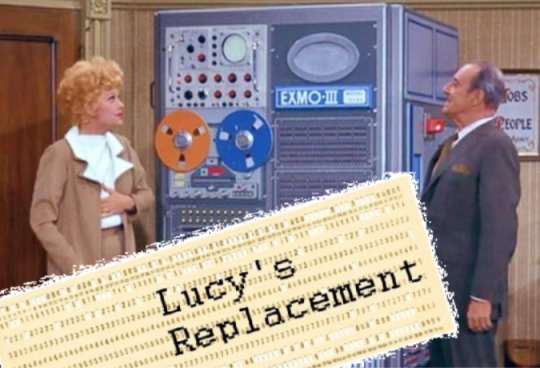

Directed by Coby Ruskin ~ Written by Fred S. Fox and Seaman Jacobs
Synopsis
Harry gets a computer and fires Lucy, who then gets a job in a typing pool at an insurance company. When she starts to miss Harry, Lucy and Kim sabotage the computer to get her old job back.
Regular Cast
Lucille Ball (Lucy Carter), Gale Gordon (Harrison Otis Carter), Lucie Arnaz (Kim Carter)
Guest Cast
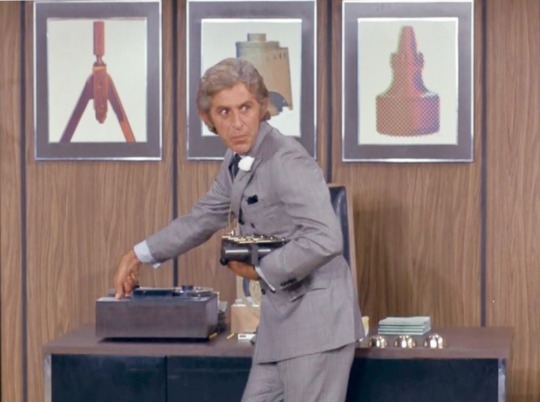
R.G. Brown (Mr. Conrad, Insurance Office Manager) appeared on “The Andy Williams Show” (1963) and “The Rich Little Show” (1976). He will do one more episode of “Here's Lucy.”
The character's name is only used in the final credits.
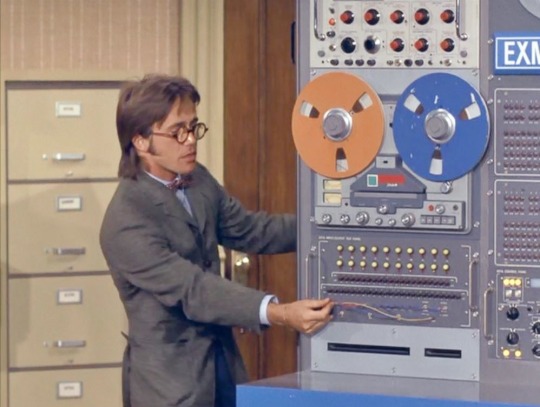
Phil Vandervort (Joe Hackley) appeared in two episodes of “The Lucy Show” where he met Lucie Arnaz. The two were married from 1971 to 1977. This is the second of his three episodes on the series.
Joe Hackley is an electronics major who Kim is dating (occasionally). Lucy calls him “that funny looking guy with the glasses.”
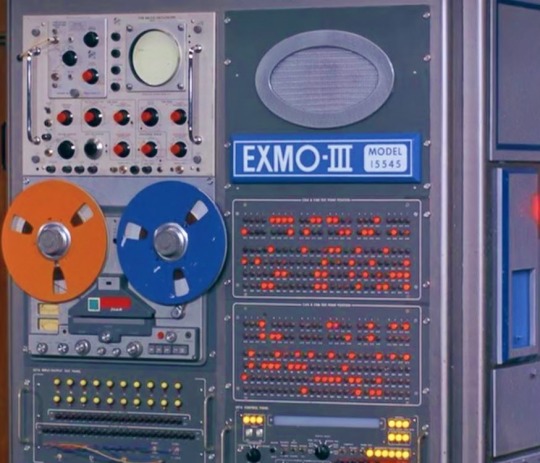
EXMO-III [Experimental Model #3] Model 15545 was designed by ‘Al Rylander.’
It is established that EXMO is a ‘he’. EXMO speaks, but his voice is uncredited.
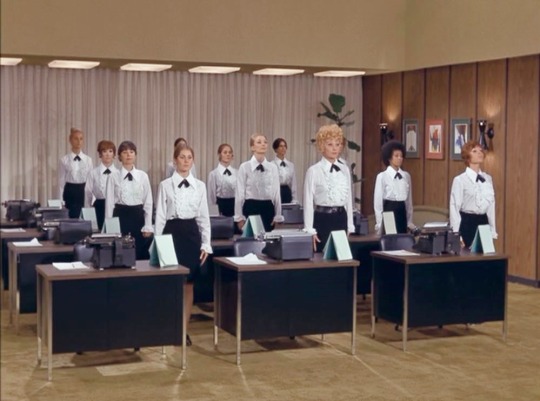
The 11 typists at the insurance company are played by uncredited background performers.
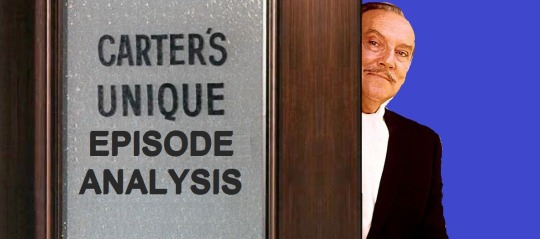
Coincidentally, two weeks before this episode aired (but well after its filming in late 1971), the first scientific electronic pocket calculator, the HP-35 was introduced by Hewlett-Packard and priced at $395 (equivalent to more than $2,400 today). Although hand-held electronic machines that could multiply and divide had been made since 1971, the HP-35 could handle higher functions including logarithms and trigonometry.

For this episode (only) Lucy Carter wears her hair in a bun similar to the way Lucy Ricardo did. Lucille Ball's hairstyles are credited to Irma Kusely.

Lucy calls the behemoth computer “a left-over from 'Star Trek'.” This is the first mention of the space series that was first produced by Lucille Ball at Desilu. Four days after this episode first aired, the very first convention of ‘Trekkies’ took place in New York City.
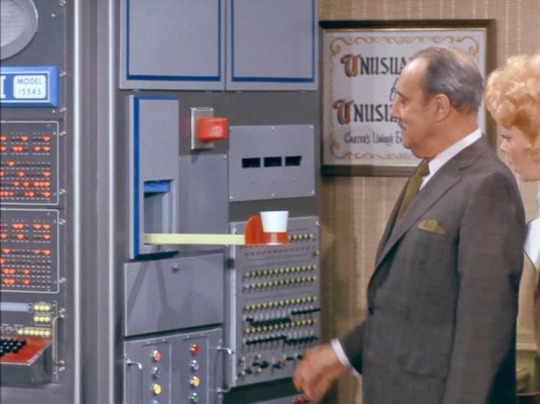
Harry credits the creation of the computer to his friend Al Rylander. Rylander was Gale Gordon's 'go-to' name during dictation to Lucille Ball on both “The Lucy Show” and “Here's Lucy.”
Harry mentions Lucy's son Craig, despite the character no longer being part of the series.
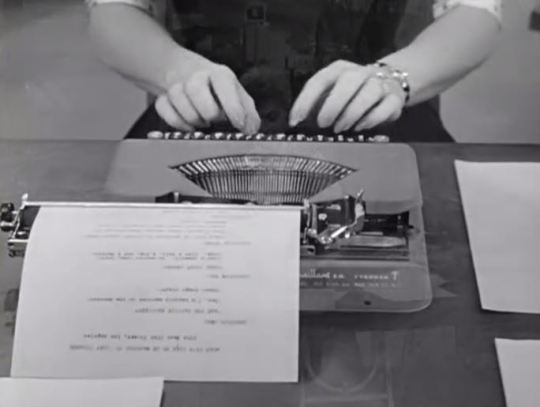
Regarding Lucy’s typing skills, Harry facetiously calls Lucy “the high priestess of hunt and peck.” Hunt-and-peck is a method of typing where one looks at the keyboard and only uses the index fingers to depress the keys. The traditional method of typing has the fingers gently resting on the ASDF JKL; keys with eyes on the material being transcribed or the typed paper, not the keys.
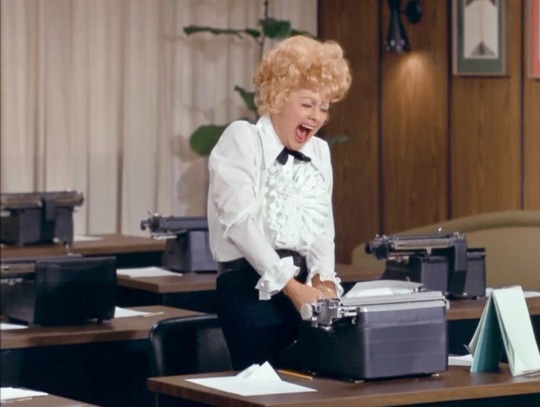
Lucy goes to work in the secretarial pool at The Great Pacific Insurance Company.
In “Lucy's Vacation” (S3;E17) Kim says that Harry has fired Lucy 14 times. This episode brings the total up to 17!
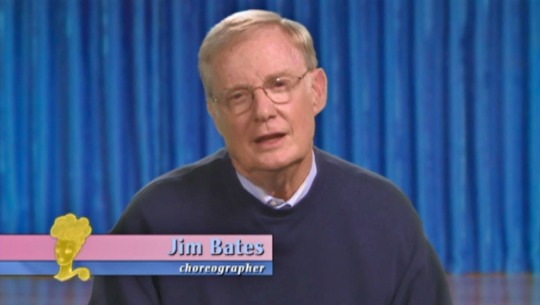
The coordinated typing sequence was ‘choreographed’ by Jim Bates, who introduces the episode on the series DVD. It is performed to "The Typewriter", a novelty instrumental piece written by Leroy Anderson in 1950, and first performed by the Boston Pops. The song was recently seen on Amazon TV's “The Marvelous Mrs. Maisel” using archival footage of a performance of it by Liberace in the late 1950s.
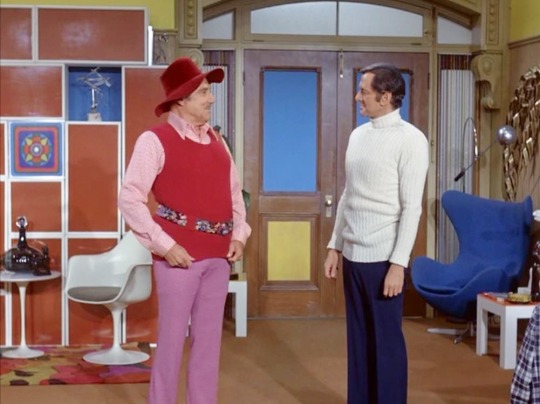
Kim calls Harry and EXMO the odd couple. “The Odd Couple” was a popular television series (based on a 1966 play of the same name by Neil Simon) that starred Tony Randall and Jack Klugman as mismatched roommates. It aired on ABC from 1970 to 1975. Tony Randall guest starred on “Here’s Lucy” (above) during “The Odd Couple’s” first season.

After being sabotaged by Joe Hackley, EXMO squirts coffee and cream in Harry's face, thereby fulfilling one of “Here's Lucy's” staple comedy bits: Getting Harry wet! Off screen, Lucy nicknamed Gale Gordon “Old Soggy Crotch”!
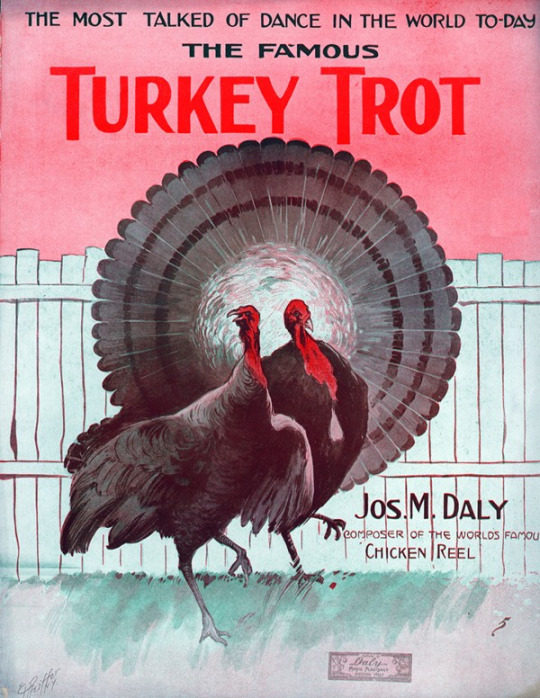
When Lucy walks in on a still-reeling Harry after EXMO has nearly electrocuted him, Lucy asks if he is “trying to bring back the Turkey Trot”. The Turkey Trot was a dance done to fast ragtime music popular from around 1900 to 1910. The basic step began with four hopping steps sideways with the feet apart. The dance fell out of favor by 1915.
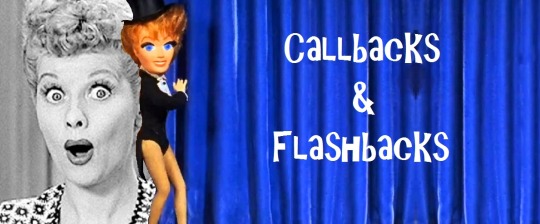
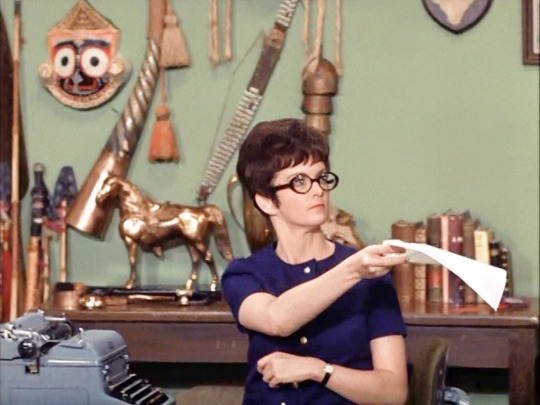
Fast and precise typing was demonstrated by Wanda Clark in “Lucy Protects Her Job” (S2;E14). Clark was also Lucille Ball's real-life secretary.
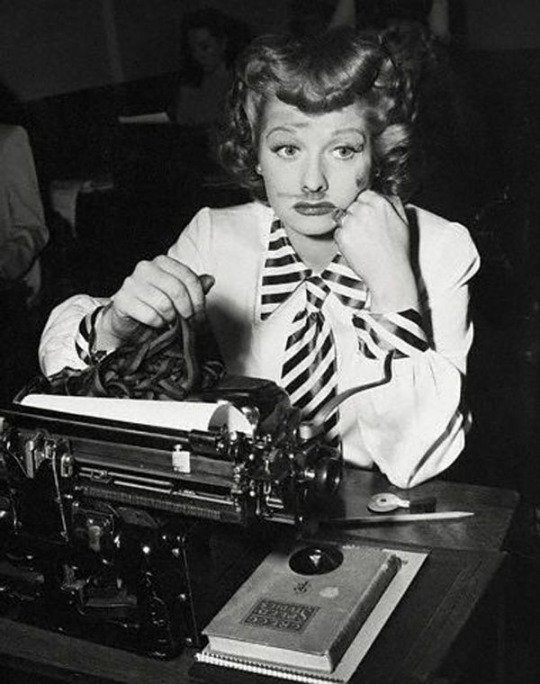
Lucy also had trouble with typewriters in the 1949 film Miss Grant Takes Richmond. In the film, Lucille Ball played Ellen Grant, the worst student at the Woodruff Secretarial School.
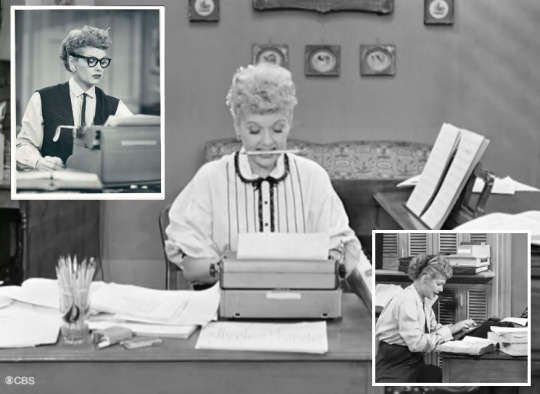
Although it wasn’t revealed until 1957′s “Lucy Takes A Cruise To Havana” (LDCH S1;E1), Lucy Ricardo also went to secretarial school (with Susie MacNamara) and wrote an operetta, novel and a play using a typewriter!

Lucy Carmichael was also a skilled typist and became secretary to Mr. Mooney at the bank, where typing was part of her job.

While working for Mr. Mooney, Lucy Carmichael had a human replacement played by Ruta Lee in “Lucy's Substitute Secretary” (TLS S5;E14).

One of the world’s first computers was mentioned on “I Love Lucy” in “Lucy and Bob Hope” (ILL S6;E1) in 1956! UNIVAC (UNIVersal Automatic Computer) was an early computer made by Remington Rand that at the time was used mainly for weather forecasting, but would also correctly predict that outcome of the 1956 Presidential election.

UNIVAC was mentioned again in 1964 in “Chris Goes Steady” (TLS S2;E16). Viv says that UNIVAC “couldn’t have come up with a better match” than Chris and her new boyfriend, Ted.
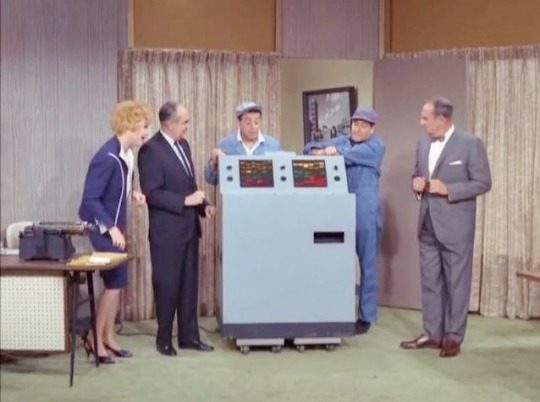
In 1966, ten years after Hope’s ad-lib mention of UNIVAC, Mr. Mooney (Gale Gordon) installed a computer at the Westland Bank in “Lucy, the Superwoman” (TLS S4;E26)...
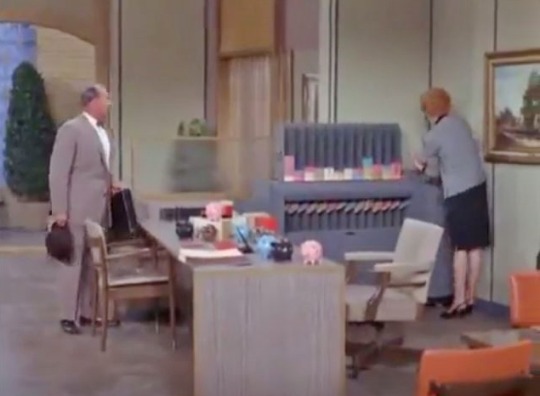
...as well as another one in “Lucy and Bob Crane” (TLS S4;E22).
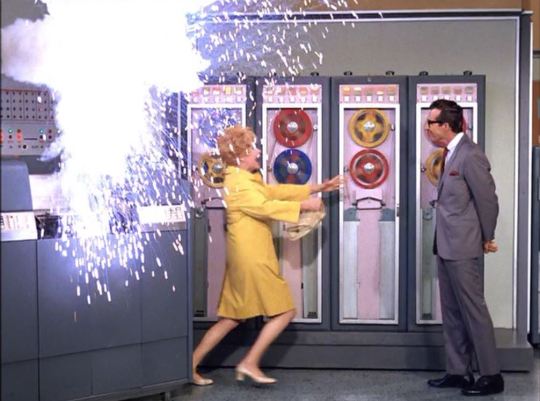
On “Here’s Lucy,” Computer Dating was the subject of “Lucy the Matchmaker” (S1;E12) in 1968. The comic payoff of most episodes featuring computers was having them short-circuit and run amok!
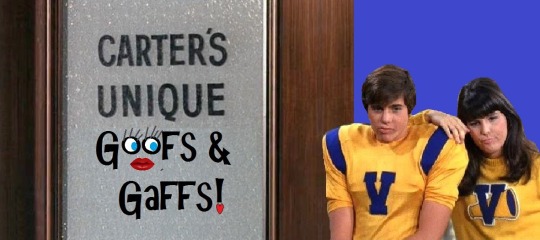
Logistics! In the office, the door at the left that is usually a closet, now allows Kim, Lucy and Joe to pass through to the outside hallway. Similarly, the door on the right, sometimes a bathroom, is here called the storage room. The exits are used as per the requirements of the plot without regard to prior episodes.
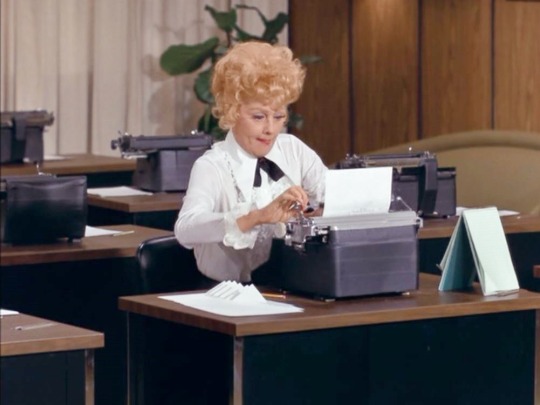
Props! For the high speed typing practice session, the spare paper is dog-eared to make it easier for Lucille Ball to pick up.
Sitcom Logic Alert! Time flies when EXMO announces it is 2:02pm. Less than 80 seconds of screen time later, EXMO announces it is 2:05pm! At the end of the scene, EXMO announces it is 2:09pm, yet less than 5 minutes have elapsed since he announced it was 2:02! Is is ironic, that on the table just behind EXMO is an hourglass, one of the oldest time-keeping devices known to man!
Knowing Your Place! In the first office scene, EXMO is positioned against the wall behind Lucy’s desk and the shallow table normally there has been removed. In the second office scene, Lucy’s desk has been moved to the side, EXMO has been moved forward and the shallow table has returned! That’s a lot of moving of some very heavy furniture!

“Lucy’s Replacement” rates 3 Paper Hearts out of 5
The worry that computers would replace people was a common TV trope of the ‘60s and ‘70s. The episode contains a short but wonderful scene between Lucy and Kim that feels especially real. Lucille Ball shows her joy of working with her real daughter as Lucie exits. There are also genuine displays of emotion between Lucy and Harry. Maybe it is her Lucy Ricardo-like hairstyle, but the comedy here is very reminiscent of “I Love Lucy.”

#Here's Lucy#Lucille Ball#Gale Gordon#Lucie Arnaz#computer#Coby Ruskin#Fred S. Fox#Seaman Jacobs#R.G. Brown#Phil Vandervort#EXMO III#Rylander#The Typewriter#The Odd Couple#Star Trek#typists#secretaries#1972#CBS#TV#Desilu#The Lucy Show#I Love Lucy#UNIVAC#Computer Dating#typing pool#hunt and peck#turkey trot#Miss Grant Takes Richmond#Wanda Clark
2 notes
·
View notes
Text
Video Killed The Radio Star
“We hear the playback
and it seems so long ago
And you remember
the jingles used to go”
- The Buggles

My mom asked me to help her set up an Apple TV a while back, and it made me realize how far we have come as far as entertainment options go. I remember the day my dad came home and announced he saw that they were installing cable TV lines in the neighborhood. He was about as excited as I have ever seen him. It meant we increased our channel roster from about five to over thirty! There was a network that played sports 24 hours a day! We could watch movies at home uncut and uninterrupted. I wanted my MTV and now I got it! It may seem quaint to someone who wasn’t there at the time, but it was an incredibly cool and mind-blowing experience when you consider how our viewing experience exponentially changed with the installation of that little black cable.
As I was setting up the Apple TV, and all of the incredible options that come with it, I did not feel the same as that day in 1983 when I could now watch Nickelodeon and Australian rules football to my heart’s content. Sure, the explosion of viewing options within cable and streaming services are just awesome, but sometimes it seems too much. The immediate gratification of it all is disappointing as well. The concept of binge watching seems to take away from the anticipation we used to have from the episode we waited all week for (or all summer for a cliffhanger). That anticipation would start with the show’s theme song, which I feel is a real lost art. Just the act of hearing that familiar tune along with credits and scenes of the stars of the show was almost as exciting as the show itself. It may make me seem old and out-of-touch, but I really miss those days when we lived without DVRs and on demand viewing and got real theme songs to kick off your entertainment viewing experience.
But instead of rueing over days long lost, let’s celebrate some of those old shows (that ironically are all over Hulu and Netflix) that were not only great programs, but had the type of theme songs that really made you feel good when they came on. It meant something that you waited for all week was about to arrive, and for an hour or two you could lose yourself in a world away from your own. I now present to you my ten favorite tv theme songs and their shows, in no particular order:
1) All in the Family - In fall of 1973, CBS put forth what is considered the finest lineup on one night in television history. On Saturday nights, people stayed home for three straight hours of unparalleled entertainment. This was the start of it all at 7:00 (all times I give you are Central). There was no better lead off than Edith and Archie sitting at the piano singing “Those Were the Days”. How cool is it to have your lead actors sing the theme song live. All In the Family was so great it had a separate ending theme. You can read plenty elsewhere about the groundbreaking episodes that went on in between, but the theme music from this series gets us off and running.
2) Rockford Files - This show always opened with a unique montage of a client of Jim’s leaving a message on his answering machine. What followed was what I consider the best music composition on the list. Written by Mike Post, it is a funky, hard driving and timeless theme just like the Pontiac Firebird he drove. I like this song so much it is often in my normal rotation on many of my daily playlists. The program was great, for sure my favorite detective show of all time, but I would tune in just for this song.
3) Hill Street Blues - This is another Mike Poat theme, but couldn’t be more different than Rockford’s theme. Jazzy rather than funky and smooth versus hard driving, the piano of the song seemed to sum up everything this show was about. I recently caught up with some episodes on Hulu recently and forgot how ahead of its time this show was. Before Hill Street Blues, police dramas tended to tie things up neatly before the hour ended. This show, like life, didn’t always work out so well. The sadness of the lives in the people in the show is tinged throughout the theme. But, you also hear some hope in the final chords, and I think that what the show was all about. It told us that life could be a grind and full of despair, but there are also a lot of good people trying their best to ease suffering and make this world a better place. That’s a lot to pack into one theme song, but this one hits all the right notes.
4) M*A*S*H - This was in the 7:30 slot on the CBS Saturday lineup and was put there to boost its ratings in its second season. As hard as it is to believe in hindsight, the show struggled to find its audience in its first year. For many folks, the opening theme was their first introduction to this unique medical/war comedy/drama. Like the show, the theme (titled “Suicide is Painless”) was taken from the 1970 movie of the same name. The TV version dropped the lyrics and became one of the most instantly recognizable themes ever. The show that followed is very good too. I must confess that I am a bit of a M*A*S*H aficionado and the second season was one of their best (I’m partial to the McLean Stevenson/Wayne Rogers episodes). If you haven’t watched the show in a while, give a couple of episodes a spin (now on Hulu). I’ll bet dollars to donuts you are whistling the theme the rest of the day.
5) WKRP In Cincinnati - A terribly underrated show with an equally underrated theme, the quirky gang at WKRP were always good for some laughs and DJs spinning great records. While the theme song is fantastic (“...baby just think of me once in a while” is such a great line), the real soundtrack of the show was the late 70s/early 80s rock and roll in the background of each episode. Unfortunately, due to licensing issues, you don’t get those songs in the reruns, but the crazy storylines and big laughs that come with them still make this series worth your time. As a side note, the lyrics in the theme at the end are pure jibberish. The writer of the song used nonsense words as placeholders but the producers kept them in as a bit of an inside joke about how hard rock lyrics are to understand. I think that perfectly sums up what WKRP is all about.
6) Mary Tyler Moore Show - Who can turn the world on with a smile? Mary no doubt did it every Saturday night at 8:00. I have vague memories of this show the first time it came around as first run episodes, but found it later in reruns and discovered what a true gem it is. The characters were quirky and unique without being oversimplified and the acting of the supporting cast was brilliant. Any show with Ed Asner, Ted Knight and Betty White is going to end up being our gold. As for the theme song, I think it is the most hopeful and happy on the surface, but it always struck a sad note with me. There always seemed to be a back story with Mary in the show that we weren’t always getting that hinted of difficult times before she got to Minneapolis. The song echos that and her throwing the hat up at the end seems to tell us that no matter how rough things were, or might end up, she’ll keep that smile on her face. Not a bad lesson for all of us to follow.
7) Three’s Company - In the interest of full disclosure, I did not watch this show when it first aired. It was banned from my house by my mother because it was “stupid”. Once I left the house for college, I wanted to start trying new things and testing my independence in this world, so the first thing I did was devote every weeknight from 10:00 to 11:00 to the Three’s Company reruns on Channel 32. What I saw was certainly a bit stupid but far from a waste of time. Arguably, the show included some of the finest physical comedy of it’s day and was a great showcase for actors like John Ritter, Norman Fell (Mr. Roper) and Don Knotts. Admittedly, the premise and some of the themes of the show have not aged well, but I never saw anything but an intent to have fun and provide a few laughs. That was conveyed in the theme song which was as light and airy as the breeze coming off the Pacific while standing on the pier in Santa Monica. For me, just the sound of that song brings back a memory of living in the college dorms and starting off an independent life full of promise and possibilities. Each episode of this show felt the same even if each could have been solved in the first two minutes with a simple question or statement like “No, Mr. Furley, Jack is getting a Mexican pot to cook in, not the kind you smoke”. I guess though, that wouldn’t have been all that funny.
8) Barney Miller - This one is on here purely for the bass line. The notes are unmistakeable and leads into a full jazz combo with killer lead guitar. The funk you hear in the theme follows along with the show. The detectives at the precinct seemed to take what initially seemed to be mundane aspects of police work and turn every epsiode into a funky life lesson. I read somewhere that real cops think this is the police show more true to life than any other they have seen. I’m guessing it was because they drew up characters so real to the point where you would think of them as people first and not some exaggerated character as most police are drawn up on TV. The whole thing just worked and really was quite funny. The episodes hold up very well in reruns as well, so if you have never given it a try, I think you’ll find that it is as good as any other cop show you have seen recently.
9) Bob Newhart Show - Anchoring the CBS Saturday night 8:30 slot is another jazzy instrumental that is a great theme, but in this case the show behind it was the real gem. Just like Barney Miller, The Bob Newhart Show took the fairly mundane aspects of life - whether it be at the office or at home - and mined them for laugh after laugh. For those who are finds of Mr. Newhart (Loyola, Class of ‘52), this is no surprise. Bob could literally turn a phone call into absolute hilarity. His choice of profession on the show was perfect as well - for those who don’t know he played a psychologist. As someone who has spent a lot of time in the offices of mental health professionals, I can tell you first hand that the only portrayal that I have seen that is true-to-life is the one on this show. The group therapy sessions are always the real gems and this show nails exactly what they are like. I can’t it explain it much further, just go get a copy of the first season of this and watch it and you’ll know what I’m talking about. Also, this show gets credit for one of the best wacky neighbors - Howard the pilot played by the incomparable Bill Daley. Of all of the shows on this list, this is the one that I would recommend you check out before all others.
10) The Love Boat - The show was pretty lame though I can be talked into watching anything that could have Sonny Bono, Vincent Price, and Chart as guest stars on the same night. The theme, however, was a winner. Sure it was cheesy, but it fit the series perfectly and always gave me the impression that I would know I made it in life if I could take a cruise on a boat like the Pacific Princess (I haven’t so I guess that I’m still waiting to make it). Another reason that I love this show is that I have fond memories watching it with my Grandma when we would occasionally stay over at her house on Saturday nights. Her smart comments about all of the washed up actors and how bad they looked or untalented they were was the real entertainment of the evening. Plus, just the fact that she let us stay up late to watch it was a real treat in it of itself. She would make us popcorn and let us have a soda and we could just live it up. It’s funny how the most simple things in life end up being the most memorable. I’d give anything right now for an hour again with her and that show. Gosh, what fun.
Honorable mentions include the themes from Hawaii 5-0, The Golden Girls, Cheers, Sanford & Son, The Greatest America Hero, Good Times, The Odd Couple, Welcome Back Kotter, and Miami Vice
Now, I know that I’m being a real old-timer here by bringing out these ancient shows, but I will challenge you to a different binge-watching experience before passing judgment on my list. Just You Tube the ten opening theme songs/credits that I list here and watch them in order. You don’t even have to watch whole episodes of these shows (though if you the time you should). I guarantee that you will get a feel for what it was like when these shows were first on the tube. Or, if that’s too much work, I made you a playlist with a few other favorites:
https://open.spotify.com/playlist/2J8rLlC3FIAvaCLmQg95vT?si=fpgJ8wYaSH-V0M0gP12rvA
I am now at the ending point of this post. It’s always hard for me to come up with a good finish to one of these. I now realize that I need a good theme song. I guess that is going to be hard to convey in written form and also because I don’t have one, but hum something catchy in your head and play it across images of the great times you just had reading this blog.
Until next time....
Jim
P.S. - The last hour of “The Greatest Night in Television” on CBS was occupied by the Carol Burnett Show. A fantastic program, but not my favorite theme, so it did not make the list. Still worth checking out if you find it on somewhere if only to watch the cast crack up at Tim Conway’s antics.
0 notes
Text
‘Fargo’ Uses Pop Songs Better Than Any Show On Video
FX / Warner Bros..
As prestige TV proceeds to ape the conventions of theatre, a growing number of TV shows have stepped up their match once it comes to a device near and dear to my own heart — with pop music. Many of the Very Best and most talked-about displays on television do this very well: The Americans, Big Little Lies, Better Call Saul, Mr. Robot, Legion,Halt & Catch Fire. But there is one series that really does it a bit better than the rest, FX’s Fargo.
Filmmakers and showrunners utilize pop songs. The most basic objective is to immediately set a time interval — Duran Duran for its ’80s, CCR for those ’60s, Donna Summer for the ’70s, Nirvana for its ’90s, and so forth. Considerate artistswill really incorporate the audio as either a Greek chorus signaling themes that are significant or simply as a window to the lives of the characters. Or they’ll revel in the possibilities which arise when you choose a part of activity and mix it with a tune, which can elevate an otherwise flat sequence to the dizzying heights of a dance number.
Fargo, notably in its second season, has escalated in using tunes as storytelling devices, in addition to finding ways to create musical sequences that looked and sounded unbelievable on-screen. Throughout the show’ forthcoming season, I’ll be writing weekly columns dedicated to the way Fargo employs music in each episode, exploring the ways that tunes deepen (or perhaps detract from) the storyline. (I’ll also inquire into the obscure tracks which will inevitably pop up on the soundtrack, for people without ready access to Shazam.) Before that, here are five good moments from the first two seasons.
Season 1, Episode 2: Eden Ahbez, “Full Moon”
Scene: Mr. Numbers and Mr. Wrench get rid of a body in an ice-covered lake.
Fargo did not really hit its stride for a series that cinematic scenes to pop music in distinctive ways until its next season. However, this incident from early in season one shows Fargo‘s flair for digging up obscure tunes and doing something subversive together. Ahbez is a cult figure who achieved his greatest triumph in 1948 when his song “Nature Boy” has been conducted by Nat King Cole, who flipped it into a No. 1 hit. “Nature Boy” was reflective of Ahbez’s proto-hippie life — he wore his hair long and grew up a Jesus beard to choose his normal garb of sandals and white robes. (Ahbez was also living beneath the “L” at the Hollywood sign all over the time which “Nature Boy” became a hit.) On his own, Ahbez recorded profoundly strange, ethereal music including his starry-eyed, spoken-word vocals, as typified by the strangely hypnotic “Full Moon.”
On paper, “Paper Moon” shouldn’t go with a spectacle where a guy his killed by two hit men. But much like the Billy Batts sequence in Goodfellas, which uses Donovan’s similarly hippie-dippy “Atlantis” while Robert De Niro and Joe Pesci celebration Frank Marino’s head in, the mix of violence and serene audio functions in a yin-yang sort of manner, conveying the pathology of people that commit horrible acts with cool efficiency.
Season 1, Episode 9: “Green Tambourine” by the Lemon Pipers
Scene: Super-criminal Lorne Malvo, posing as a dentist at Kansas City, hosts a party at his home.
“Green Tambourine,” a likably trashy bubblegum oldie which went to No. 1 in 1967 and has been the only real hit by ersatz-psych group the Lemon Pipers, could typically be an unusual choice to score a celebration scene that happens in 2007. But it’s perfectly suited for Fargo, that informs stories which take space during hyper-specific periods of time which also somehow appear to exist slightly out of time.
Lorne Malvo, particularly, seems like he could be a commodity of every year between 1989 and 1961. It is a part of the character’s life, “there really are no rules” influence on the entire world around him, represented in a small way by reviving the outdated “Green Tambourine” at a scene which takes place 40 years following the song’s original cultural instant. For Malvo, “Green Tambourine” represents normalcy and mediocrity — it’s his way of appearing like a regular individual while slyly commenting on how boring he thinks ordinary folks are.
Season 2, Episode 1: “Children Of The Sun” with Billy Thorpe
Scene: Rye Gerhardt pushes to face a quote in a diner.
In an interview with The A.V. Club, Fargo music supervisor Marguerite Phillips explained that the series’s creator Noah Hawley “wanted me to research prog rock and Krautrock” as a musical motif for the next season. Though I prefer to believe that it’s also regarding the pervasiveness of AOR this could be related to the year’s sci-fi overtones. (As a native midwesterner born in 1977, a number of my earliest memories have been scored by pomp-rock riffs and ridiculously wiggy keyboard solos.)
Apparently, Billy Thorpe’s anthemic “Children Of The Sun” was among those very few songs ever written to the script of the second-season premiere. While mostly forgotten now, Thorpe did exist around the periphery of FM radio from the late night ’70s, that gave him sufficient exposure for the Australian rocker’s 1979 concept listing Kids Of The Sun to hit the top 40 in the album chart. In addition to subtly foreshadowing the preponderance of UFOs at Fargo‘s sophomore year, “Children Of The Sun” seems like the sort of song you’d hear in the radio late at night whilst riding shotgun on a lonely street road near the edge of Minnesota and North Dakota in 1979.
Season 2, Episode 7: Lisa Hannigan, “Danny Boy”
Scene: Bear Gerhardt implements his niece, Simone
The biggest hurdle for Fargo the TV series has been overcoming comparisons to Fargo the film. A show that was confident would have worked to play down the Coens’ influence. However, Fargo has rather embraced not only its cinematic supply material but the entire Coen brothers oeuvre, though in a manner that’s more reminiscent of an inventive remix than a slavish cover. In the next season, this interpreted musically by having modern artists perform versions of classic tunes related to Coen brothers movies, such as Blitzen Trapper’s shoot the normal “I’m A Man Of Constant Sorrow” (out of O Brother Where Art Thou) and White Denim’s redux of Kenny Rogers and The First Edition’s “Just Dropped In (To See What Condition My Condition Is In)” (in The Big Lebowski).
In the case of “Danny Boy,” which initially uttered the remarkable shoot-out series from Miller’s Crossing, the Irish singer-songwriter Lisa Hannigan was called on to execute a distinctively lovely rendition for arguably the most funniest scene at either season of Fargo. For a callback to the Coens, “Danny Boy” stands alone as a memorable audio queue on Fargo. It might, in fact, even top Miller’s Crossing, where the use of “Danny Boy” enrolls as marginally jokey. But on Fargo, the song’s sentimental depiction of familial love and the death of generations gets the death of Simone doubly awful.
Season 2, Episode 10: Black Sabbath, “War Pigs”
Scene: Everything goes to hell in Sioux Falls.
Here we’ve got a tune that strikes on every one of the bases for tune usage that is good. It’s a strong personality option for Hanzee — that I could easily imagine him listening to Paranoid non-stop whilst serving several tours in Vietnam. It comments on the activity. It will help to set the time and place — nothing epitomized evil in communities at the ’70s and ’80s including Black Sabbath, whose music and iconography served as shorthand for the mania from Satan worshippers that are mostly non-existentent.
But place of the and re-watch the sequence another 37 times. There’s something to be said for having a song because it seems incredible when juxtaposed against terrifying action that’s unfolding on a split screen. Much like the Scorsese-esque “Locomotive Breath” chain in the next season’s seventh episode, “War Pigs” gets over on sheer cinematic audacity. It looks cool since it looks freaking cool.
from reviverradio http://www.reviverradio.net/fargo-uses-pop-songs-better-than-any-show-on-video/
4 notes
·
View notes
Text
New Post has been published on WilliamBruceWest.com
New Post has been published on http://www.williambrucewest.com/2017/08/25/west-week-ever-pop-culture-review-82517/
West Week Ever: Pop Culture In Review - 8/25/17
In movie news, there was quite the controversial casting this week, as the color lines blurred for some comic book adaptations. First up, it was announced that English actor Ed Skrein would be portraying Japanese character Ben Daimio in the upcoming Hellboy reboot. Now, according to what I’ve read, Daimio’s Japanese heritage heavily influences the character, so this whitewashing of the character doesn’t seem to be in the best interest of the character. I mean, after the problems with whitewashing in Doctor Strange, Ghost in the Shell, Aloha, The Great Wall, and Ni’ihau, you’d think Hollywood would avoid shit like this. Yes, movies are made to make money, but it’s not like Skrein is a bankable star worth slotting into the role, so it doesn’t make a lot of sense. Usually this is done for the film’s STARS. Damon, Johansson, Stone. This is a secondary character, so it really wouldn’t have hurt them to seek out an Asian actor. Normally I’m just like “Well, Hollywood’s gonna Hollywood”, but this decision just doesn’t make a ton of sense.
Next up, 24: Legacy’s Anna Diop has been cast as Starfire in Warner Bros’ Titans series, slated to air on DC’s upcoming digital service. Some folks are saying they should’ve cast a Latina, but she’s gonna either be painted or CGied in orange, so it’s not like it’s gonna matter at the end of the day. Personally, if they wanted authenticity, I think they should’ve cast an actual orange alien princess. Right now there are just too many unknowns for me to get excited about this. I mean, DC announced the digital service without a lot of information. What’s gonna be on it? What will it cost? How much of the DC library will be available to be housed on it? As for Titans, this is the show TNT passed on. Ya know, the home of such illustrious shows as The Librarians and The Last Ship. I mean, they’re basically just about a notch up from what we got in the 90s from Universal’s Action Pack lineup. If Titans couldn’t fit anywhere on that schedule, then it probably just isn’t “ready for primetime” yet.
Speaking of aimless Warner Bros decisions, they announced 2 different Joker movies this week. First up is an origin tale, directed by Todd Phillips of Old School fame, and produced by Martin Scorsese. Hmm, one of those things is not like the other. I mean, why would Scorsese touch something helmed by the dude who gave us Road Trip? And who even WANTS a Joker origin story? First of all, it’s reportedly not even going to be part of the DCEU, so why confuse the audience with a story that won’t even really “count” in the grand scheme of things? Nobody needs a standalone origin of a take on a character they’ll likely never see again. This is just as foolish as Sony’s Don’t-Look-For-Spider-Man-To-Appear Venom movie. Next, the guys behind This Is Us (SO hot right now!) and Crazy, Stupid, Love are working on a Bonnie & Clyde-style Joker and Harley film, with Jared Leto and Margot Robbie reprising their roles from Suicide Squad. Since this would sort of negate the empowerment that Harley gained by the end of Squad, it’s believed that this actually means that the planned Gotham City Sirens film, also slated to star Robbie, is now dead. Honestly, I could do without either of these movies. I found Leto’s take on Joker to be…interesting, but Less is More with that character. Plus, I don’t really think the DCEU would be strengthened by this sort of movie. It’s not the world-building they need to be doing right now, as they haven’t even figured out the core of their star characters like Batman and Superman yet.
In TV news, Christopher Sebela’s comic Heartthrob has been optioned as a TV series by Felix Culpa – a production company launched by actress/Elvis’s granddaughter Riley Keough. Now, comics are optioned every day, and the final product never comes to fruition, but I hope this series sees the light of day. I’m actually a big fan of the comic, which is published by Oni Press. Set in the late 70s, it focuses on Callie, who’s received a heart transplant while the process is still in its infancy. Given a new lease on life, but still told she’s basically living on borrowed time, she decides to change her life when she meets Mercer, a charming guy with a shady side. She immediately falls for him, and he teaches her how to be bad, like rob banks and commit other crimes. She gets off on the rush. Pretty soon, however, she realizes that Mercer isn’t real. No, he’s actually the ghost of the guy whose heart is now in Callie. So, it’s a Bonnie & Clyde story where Clyde’s calling the shots from the afterlife. The book is published in “seasons”, so the first 5-issue miniseries wrapped up back in early 2016, while season 2 is hitting stores now. If you’re looking for a new comic not from the Big Two, I highly recommend it.
youtube
In music news, Taylor Swift did a whole social blitz to announce that her next album would be called Reputation, and would be released Nov 10th. On top of that, the first single was released last night, with rumors that the video will premiere at Sunday’s MTV Video Music Awards. Ya know, the same awards hosted my Taylor’s enemy Katy Perry. Yeah, that should be pretty interesting to watch. Anyway, the new song is called “Look What You Made Me Do”, and I’m not too impressed. It lacks a real hook, while the chorus itself is basically spoken. I feel like it has all the ingredients for a great song, but it’s not living up to its full potential. If this is an indicator of what to expect on Reputation, though, I’ll admit I’m curious. It can’t be worse than Perry’s Witness.
youtube
Speaking of Katy Perry, we got the premiere of her video for “Swish Swish”, which was reportedly her diss track against Taylor Swift. After a lot of backtracking and sucking up, though, it seems Katy wants to put that feud behind her. That’s why this horrible video does everything it can to take the bite out of a song that was never really that biting to begin with. I mean, just look at it – Molly Shannon? Terry Crews? Even Nicki Minaj was clearly CGied in, as I’m sure she didn’t wanna be anywhere near this shitshow. The sad thing about the Perry/Swift feud is that Katy bailed on it the minute she realized the Swifties were a more powerful lobby than she had thought. Nobody was feeling her SNL performances, and Witness didn’t exactly fly off the shelves. She realized that she can’t really survive by making enemies, so suddenly she became conciliatory to save her ass. Plus, it’s kinda lame that this blood feud started just because Taylor stole a few of Katy’s dancers for her tour. Anyway, you’ll never get those 6 minutes back. You’re welcome.
I had the pleasure of joining my buddy Zac for his new podcast, The Zac Shipley Show. He’s treating these first few episodes as pilots for ideas he’s wanted to try, so our ep was called Streaming Pile, where we talked about the worst things we could find on streaming services. I talked about a Star Trek: Voyager episode where formerly perky pixie Kes returns all middle-aged and bitter. You should check it out, and give a listen to his other episodes while you’re there!
Song of the Week
youtube
I’ve been a big Maren Morris fan since she released “My Church”, and I was really into her next single, “80s Mercedes”. With this song she continues not to disappoint, as I love the groove on this thing. Listen to the bassline. It’s not a dance song, yet you can do a MEAN two-step to it. Hell, I think you could even do a casual version of The Hustle to it. This will definitely go to #1 given time.
Things You Might Have Missed This Week
NBC’s planned reboot of Xena: Warrior Princess – which would’ve featured a full-on lesbian relationship between her and Gabrielle – is officially dead, as they said “it didn’t warrant a reboot”. Man, if only other studios would realize this about some of their projects…
Director James Gunn mentioned in a Q & A session that the 3rd Guardians of the Galaxy film would set up the next 10-20 years of the Marvel Cinematic Universe. Yup, you’re just now realizing your own mortality. I’ll give you a minute to deal with that.
Speaking of Gunn, he’s attached to write the pilot for (and possibly direct) a reboot of 70s series Starsky & Hutch. This adaptation is supposed to be similar in tone to CBS’s upcoming S.W.A.T. and not comedic in tone like the 2004 Ben Stiller & Owen Wilson movie.
Surprising every critic in Hollywood, Netflix has renewed the maligned comedy Friends From College for a second season.
Known for controversial publicity stunts, Alamo Drafthouse is reportedly organizing a Clowns Only screening of the new adaptation of Stephen King’s It.
We got a new poster for Thor: Ragnarok. So many colors!
Michael K. Williams has reportedly been cut from the Star Wars Han Solo film, as Ron Howard’s reshoot schedule conflicted with another role that Williams had accepted.
There are, like, 8 different Knight Rider reboot treatments floating around Hollywood, but the latest rumor is that one of those productions is looking at John Cena as Michael Knight, with Kevin Hart as the voice of K.I.T.T. Of course, it would be a comedic adaptation, a la the popular Jump Street franchise.
Super Troopers 2, the sequel to one of the most overrated films I’ve ever seen, will hit theaters April 20th, 2018.
Anne Hathaway and Rebel Wilson will star in Nasty Women, which is a female-led reboot of the Michael Caine/Steve Martin classic Dirty Rotten Scoundrels.
Independence Day: Resurgence‘s Jessie T Usher will star in Son of Shaft, with Samuel L. Jackson potentially reprising his role as John Shaft (from the 2000 reboot film), the nephew of the original John Shaft, played by Richard Roundtree, who is also in talks to join the movie. Man, that gave me a headache.
youtube
Always on the cutting edge, here’s Sesame Street’s parody of 2017’s song of the summer, “Despacito”
According to the creators, the Netflix series Stranger Things will most likely end after its fourth season
The actress formerly known as “Andrea Zuckerman”, Gabrielle Carteris, has been re-elected to a 2-year term as the President of the Screen Actors Guild-American Federation of Television and Radio Artists (SAG-AFTRA)
Ryan Gosling will host the season premiere of Saturday Night Live, with musical guest Jay-Z, on Sept 30th.
Jamie Bell is developing a Jumper TV series, based on the 2008 film about teleporters
Suicide Squad 2 is reportedly being fast tracked, but I hope they fast track it right into the garbage. I mean, I enjoyed the first one, but I don’t need a sequel.
youtube
I like Nick Kroll, even though I never saw even a second of Kroll Show. Anyway, he’s got a new animated series about puberty called Big Mouth coming to Netflix and after watching this teaser I am ON BOARD!
We’re a month away from the premiere of Star Trek: Discovery, and it was revealed that it will be rated TV-MA, for Mature Audiences. Now, it doesn’t mean there’ll be tits and phasers, but it does mean they can tell more complex stories. That said, I still feel like they don’t truly understand the source material.
After a scathing essay from his ex-wife went public, accusing him of adultery and other generally shitty behavior to women, Joss Whedon went underground and the fan site, Whedonesque, shut down after 15 years.
youtube
We got a new teaser for Netflix’s The Punisher. With the rate I’m getting through these Marvel shows, I’ll probably get to it just before Evie goes off to Hogwarts.
There was a national solar eclipse this week, which was the first occurrence since 1918. I’m sure you might’ve heard something about it. It was kind of a big deal. Folks were pimping out special cardboard glasses on Craigslist for insane amounts of money, and the American President made news by looking directly into it. It seems that it had a strange effect on different folks. For example, Netflix viewership went down 10% as people went outside to view the phenomenon. Not everyone understood what was going on, bless their hearts. At work, a frantic parent called in and said “Y’all watching the news? You hear about this eclipse? Is it serious?!” Apparently she thought it posed some sort of danger to her kids and the school. No, ma’am. It’s just a beautiful sky ballet. Anyway, the eclipse was EVERYWHERE. I didn’t get to see totality, but it was still nice to stand outside for a bit on a nice day. What am I saying? I hate the outdoors! Well, it was nice to not have to work for a few minutes. You couldn’t escape the Eclipse Fever at the start of the week, so that’s why the Solar Eclipse of 2017 had the West Week Ever.
#80s#Batman#Comics#Country#DC#Indie#Knight Rider#Marvel#Movies#Music#Politics#Pop#Race#Star Trek#Star Wars#Television#West Week Ever#Wrestling
2 notes
·
View notes
Photo
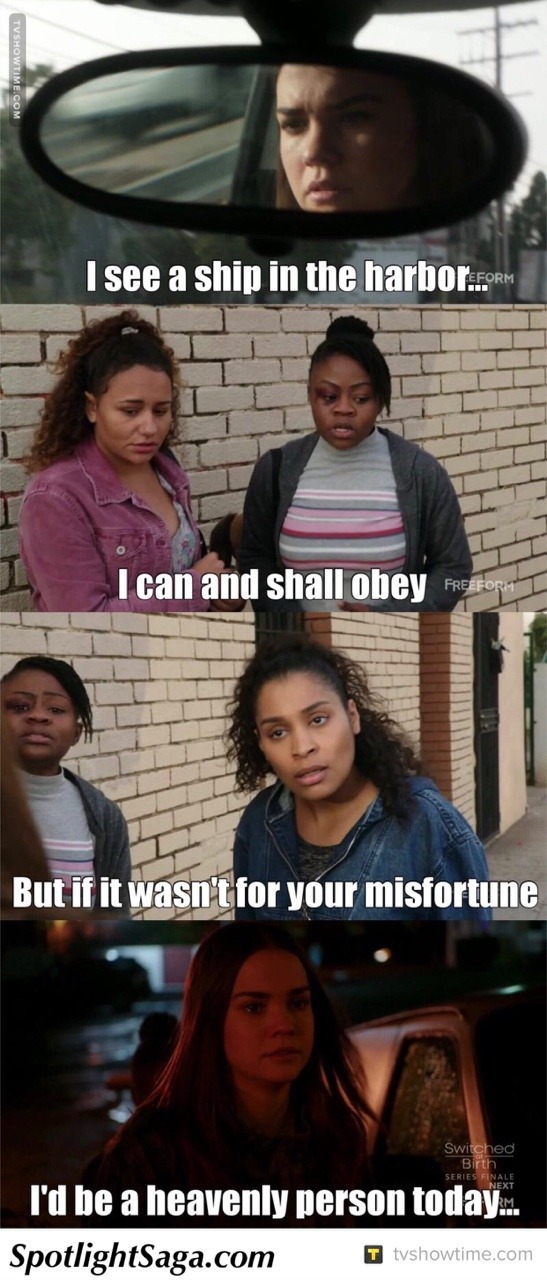
Kevin Cage of @spotlightsaga reviews... The Fosters (S04E20) Until Tomorrow Airdate: April 11, 2017 @freeform Ratings: 0.720 Million :: 0.30 18-49 Demo Share Score: 8/10 **********SPOILERS BELOW********** In the late 70's and early 80's the novel 'Sophie's Choice' was made into a feature film starring an always captivating Meryl Streep. Because we are all about avoiding cross-spoilers at Spotlight Saga, and we will soon be taking on film (2016's Australian film 'Lion' is up first!), even though it's an old film I won't be giving away what Sophie's choice actually was... But let's just say, it was a tough one. Now, in no way am I comparing the quality of the film and novel, 'Sophie's Choice', and Freeform TV's 'The Fosters', but they do share more than some of us would like to give them credit for. Over the years, the notorious film title became a notorious catchphrase... I know to some of you that have seen Sophie's Choice or have read the book will probably think this is a little crazy, but test my theory here... The average person in 2017 believes that 'Sophie's Choice' has to do with abortion, and in a manner most would probably pass off as 'reaching', it kind of does... But that's what I'm getting at here. It's become a blanket term for a woman put in a position, forced to make a difficult decision... How people interpret it from there is all spread thin somewhere between knowledge and folklore. What I'm trying to say is that I think we just might have a new expression on our hands... No, it won't carry the same weight or meaning as 'Sophie's Choice', and no 'The Fosters' is no Academy Award winning title, but it's had its moments. Anyone sensing what I'm getting at here? We have 'Sophie's Choice' that means one thing... And now we have 'Callie's Choice' which takes on a whole new meaning. We've seen 'The Fosters' struggle with consistency over its 4-Season run, but I've quite enjoyed S4 as a whole... Especially S4B. The season has had its clunkers but if I average out its scores I've given it over the course of the entire run... Season 4 averages out at about 6.5/10, and while that's not exactly critical acclaim, for 'The Fosters' it's a strong 6.5... At times, the writing can be a bit sloppy, and sometimes you get the wrong director or tv executive or producer to translate the material and put their own particular brand of perspective on hot button issues. It can feel like they are shoving liberal Hollywood agendas down your throat, and no one likes to be preached to by a television series no matter what their stances are on an issue... But since the episode (S04E15) 'Sex Ed', the series seems to have slowed down its pacing a bit, allowing each issue, arc, or subplot to be properly nurtured and creatively explored. Suddenly we are seeing both sides of the coin, and when 'The Fosters' is firing on all cylinders not only can it be a great tv show, it can be an incredibly socially relevant, modern portrait of the here and now... It's when they drop the soap, and really focus on the understated writing on the wall that I truly appreciate 'The Fosters' as a series for all it's worth. I can understand a lot of people's concerns, especially with Callie... And that's what I really want to center on here. She can come off as unlikable for an older audience... Many of us see a self-destructive girl who looks for the nearest bullet when she starts to lose control. But even before that critical point, she shows unhealthy behavior. TVShowTime community member and reviewer @EmpressBeastie put it best when she referred to it as a 'Hero Complex'. That's exactly what it is. Some people may be quick to write it all off as halphazarzd writing, but I think this episode really truly showed us both why the younger audience may defend and see Callie as some sort of hero, as demonstrated with her earlier beachside conversation with Jude... As well as how an older, more life-worn viewer may see a scared little girl, who's extremely damaged and fragile, and has a gut reaction to 'take one for the team' or put herself in situations where she could be considered a martyr in a desperate attempt to turn weakness into strength. It's almost a Catch 22... Almost. It's 'Callie's Choice'. Sometimes it's hard to really dive into all the things that are going on in 'The Fosters'. It's chaotic, but doesn't that make sense that it would be? You have 4 foster children, 2 of which were adopted late in their lives and a fifth child who is a biological son of what is now a lesbian couple... Who's biological father is now shacked up with the biological mother of the first adopted Foster twins. There's a lot of love, but it's seriously fucking complicated, man!!! It may seem like I love to compare the two, but I actually don't... It's just that 'The Fosters and 'Switched At Birth' are both series on Freeform TV that have similar teen drama beats that both share a common denominator in what I could only describe as shows that are always trying to dig in at taboo, but socially relevant issues. They both attempt to push the envelope, but 'The Fosters' is just flat out better at it... Mainly because when everything is going right with the show, you have so many unique perspectives and pairs of eyes to see things in different lights. It's simply more diverse and therefore hits the high notes much more often. I'm hard on these shows because I have to be. If you're going to be bold enough to take on all these extremely heavy issues, then goddammit, you better make sure that you do it right. Overall, I'm calling S4 of 'The Fosters' a success. Sure, Callie is yet again in another fucked up position, but at this point it feels like that's exactly where she's supposed to be. The real challenge going forward will be much like the road Noah Centineo has paved in lieu of his severe brain injury for the character of Jesus (which he has done so well for such a young actor)... Will Callie be able to heal? Will this be a cycle, a character flaw, a predisposition that she will have to learn how to live with... Or will she step up and become a different person? There's more than one way to grow, but never think that we as human beings can't fall down a rabbit hole over and over again... Because we can, I've done it myself time and time again. As cheesy and as cliche as it sounds, it's not about how hard or how many times you fall down, it's about how you pick yourself up off the pavement. It's gonna leave scars, but if you're doing it right, all the stupid mistakes we make in our lives will lead us to be stronger more insightful human beings... But we'll still be us, you can't change that.
#The Fosters#The Fosters 4x20#the fosters season 4#the fosters freeform#freeform#Freeform TV#Until Tomorrow#Teen Drama#Family Drama#Peter Paige#Brad Bredeweg#Teri Polo#sherri saum#hayden byerly#Noah Centineo#David Lambert#maia mitchell#Danny Nucci#Cierra Ramirez#Annika Marks#Daffany McGaray Clark#John Marshall Jones#Jared Ward#Amanda Leighton#Mark Totty#levi fiehler#Hugh Scott#rekha sharma#Mercedes Colon
1 note
·
View note
Text
Episode #125: Tom Barton, “The Biggest Problem Investors Have is Things Change…and They Don’t Change”
Episode #125: “The Biggest Problem Investors Have is Things Change…and They Don’t Change”
Guest: Tom Barton. Tom is the Founder, President, and General Partner of White Rock Capital. He helped build the first multibillion-dollar short-selling hedge fund at Feshbach Brothers in the 1980s, where he exposed dozens of stock frauds. Then he became an early-stage investor, going long on health foods and satellite TV. Now he runs White Rock Capital, where much of his focus is on investments in gene-therapy firms.
Date Recorded: 10/04/18
Run-Time: 1:25:50
To listen to Episode #125 on iTunes, click here
To listen to Episode #125 on Stitcher, click here
To listen to Episode #125 on Pocket Casts, click here
To listen to Episode #125 on Google Play, click here
To stream Episode #125, click here
Comments or suggestions? Email us [email protected] or call us to leave a voicemail at 323 834 9159
Interested in sponsoring an episode? Email Jeff at [email protected]
Summary: In Episode 125, we welcome famed short-seller and early stage investor, Tom Barton.
We start by going way back, after Tom graduated from Vanderbilt. He walks us through his early career experiences which helped him sharpen his business analysis skills, as well as his operational skills. He developed a great understanding of different industries, yet also what it was like to actually work in them. This was the foundation for the short-selling career that was soon to begin.
In 1983 Tom went to work for a wealthy Dallas family, and in the process met one of the original fraud short-sellers, nicknamed “The Mortician”. Tom knew nothing about stocks at that point, but under the guidance of his new mentor, realized that his analytical skills aligned perfectly with sniffing out short-selling candidates. He reasoned “isn’t it easier to spot something that’s going to fail than be certain on something that’s going to succeed?” He then began digging into the research, and finding slews of fraudulent companies.
What follows is an incredibly entertaining story-after-story of the various frauds Tom sniffed out (and made money on). There was a company claiming it could change the molecular composition of water… one deceiving customers about building-restoration after fires… a biotech claiming it could cure HIV… By the time 1990 rolled around, Tom’s returns were over 80% and he had generated a couple billion dollars.
There’s a great bit in here about “The Wolf of Wall Street” (Stratton Oakmont). Tom is the guy who took them down. Related, the “Wolf” himself snaked an apartment out from underneath Meb a few years ago out here in Manhattan Beach, CA. The guys share a laugh over this.
Eventually the conversation morphs from short-selling to when Tom’s strategy changed to going long. It involves managing money for George Soros, and some of Tom’s early long winners.
This dovetails into how Tom got into biotech, which is where he’s spending lots of time today. Tom tells us about his introduction into gene therapy, then successes with the company Intrexon. He talks us through some small companies he’s been a part of that have already sold for huge paydays…for instance, one purchased by Novartis for $9B.
This is a must-listen for any short-sellers, market historians, private investors, and biotech investors. And Tom’s most memorable trade is a doozy. This one involves buying puts for a hundred and something thousand dollars…which he sold for $13M.
These details and far more in Episode 125.
Links from the Episode:
0:50 – Welcome and introduction to Tom
1:23 – A look at the early part of his career
6:17 – Transition into being a short seller
9:20 – Why shorting was so much easier in the 80’s and 90’s
14:00 – The response to their strategy in the beginning
17:44 – Stand out shorts and the work that went into them
28:27 – Pushback on betting against fraudsters
31:56 – Involvement with Stratton Oakmont (The Wolf of Wall Street)
36:06 – Another short-selling experience with a real estate group
40:00 – Transition to long investing
44:08 – The importance of where you get your ideas
46:57 – Tom’s global investment strategy
52:45 – Tom’s interest in healthcare
1:06:31 – Tom’s look toward the future
1:13:38 – Behavioral underreactions
1:13:44 – From Alchemy To Ipo: The Business Of Biotechnology – Robbins-roth
1:16:56 – Important – find the single best source of information
1:20:50 – Most memorable investment
1:23:42 – Tom’s plan to raise his profile
Transcript of Episode 125:
Welcome Message: Welcome to the “Meb Faber Show” where the focus is on helping you grow and preserve your wealth. Join us as we discuss the craft of investing, and uncover new and profitable ideas, all to help you grow wealthier and wiser, better investing starts here.
Disclaimer: Meb Faber is the co-founder and Chief Investment Officer at Cambria Investment Management. Due to industry regulations, he will not discuss any of Cambria’s funds on the podcast. All opinions expressed by podcast participants are solely their own opinions and do not reflect the opinion of Cambria Investment Management or its affiliates. For more information visit cambriainvestments.com.
Meb: Welcome podcast listeners. Today we have what I expect to be an incredibly entertaining and fun episode for you. Our guest helped build one of the world’s first multibillion-dollar short selling hedge funds at Feshbach Partners in the 1980s, where he got to expose dozens of stock frauds. And then became an early stage investor going along on lots of stocks, and private companies, and health food, and satellite TV’s. Now he runs White Rock Capital family office, where he’s spending a lot of time thinking about biotech. We’re thrilled to have him on the show welcome Tom Barton.
Tom: Thank you, thanks for having me on.
Meb: So Tom, I figured we’d use your career arc as jumping off points to talk about a few different topics that are near and dear to your heart, including short selling, and private investing and everything else. But maybe bring us back to the beginning, I think you are a Vandy guy, I’m actually going to be in Nashville next week. So podcast listeners come on out to Topgolf I’m giving a talk there. But walk us through it. You did your MBA I believe, were you a short seller out of the womb? How did you get into this world?
Tom: After I graduated from Vanderbilt in the late 70s, the first job I took was in New York City for W.R. Grace. Back then Grace was actually a really great diversified conglomerate. And I worked directly for staff that was right under Peter Grace who was the CEO, chairman, he was basically pretty much a dictator of W.R. Grace. And I did all the confidential work, so if they were gonna acquire anything, divest anything, make any major changes within the company, they would come to our staff. So no, I didn’t get to make any great strategic decisions, but I had to do all the work, and I had to do all the financial work, and the marketing strategic kind of analysis, for literally hundreds of companies.
Because if you looked at Grace back in those days, first of all, they were an industrial company, and they were in things like Cryovac which is the plastic wrap that goes over all the steaks. And they own 90% of so many other markets, and they had dominant shares in industrial natural gas kind of industries. And at that time, you weren’t getting a very big multiple. So they started diversifying. They started buying all these consumer product companies, and restaurant chains, and sporting good stores. Most of these don’t exist anymore or they were sold off, so I had to do all the analysis. So pretty much I worked 19 hours a day for about three years, and kind of learned every industry.
That was like an excellent place to start, excellent place. But during the process, it became very funny because I was reasonably close to Peter Grace, and he said to me one day he said, “Hi Barton” he says, “You’re the only guy who works for me that will come back and tell me how crappy everything is.” And I go I don’t know, I go out there and I look at the stuff. And look I’m pretty young back then I’m like 25, and I go it’s pretty obvious this is like really in a lot of trouble.
He says, “Well this is what I’m gonna do, I’m gonna send you to 20 cities over the next 20 years, and you can clean up our garbage stuff. Every time we have a problem I’m gonna send you to the next place.” And I went home that night, and I went “That does not sound like a good job at all.” So that was pretty much the end of my W.R. Grace days, I just could not… I couldn’t imagine going to 20 cities. You can imagine the cities they would have sent me to also. So I left. I went to Dallas started a firm with another guy it was a manufacturing firm, it turned out we ended up building most of the fixtures for Blockbuster video. If you remember the kind of crazy fixtures they had in there, we just kind of morphed into a very unusual kind of manufacturing business. specialised on that.
Somewhere in the process, a European company came in and bought me out, and I got my first pretty much tall capital. It was a decent amount of money back then, but it’s not huge, but it was certainly enough to let me be independent if I wanted. And after that which is we’re talking a period of… this whole thing from Grace, let’s say 1977 to ’80 then ’80 to ’83. In ’83, I was done with that segment of my life and I knew how to run companies, I knew how to analyse companies.
I understood about balance sheet, P&L, cash flow, but I also understood what it was like to actually be in a plant and have to count inventory and actually collect receivables. So I got this really great combination of understanding all these industries, then actually having to work in one, where I actually had to build a company, make payroll and all those kind of things. So it was a really good combination, and then my whole life changed and I started become a short seller in 1983.
Meb: By the way, do you know that there’s still a Blockbuster video in Alaska? I think there’s only one left I can’t remember why there’s one in Anchorage, but it’s probably like a museum at this point.
Tom: You know, a really good friend of mine back then who I met because of the quality of data we came up with was Alan Abelson, who was editor for “Barron’s”. So I still think he’s the single best writer, and the most accurate guy that I’ve ever dealt with in the press. And he was talking about the collapse of Blockbuster video about 10 years before it finally collapsed. And you know, when Netflix first came out, they’re we’re gonna put them away, It took a long time. But you know, it was a really interesting company and they had a niche, they just didn’t get out of it fast enough.
Meb: We talk a lot about that with the high expensive fee mutual funds long-only world that’s kind of the closet indexers at some point. I think all those are gonna go the way of the Dodo, but we haven’t… don’t know when that’s gonna happen. We often talk about is there gonna be a Blockbuster-Netflix moment with those, or is it just gonna be a generational transfer? I think it’s probably the latter. But anyway off topic all right, so you’ve got some pretty good operational experience and pretty good practical experience analysing companies.
Did you just kind of wake up one day and say you know, I feel grumpy I didn’t have any coffee, I’m gonna start looking into some of these crappy companies and betting on them to go down? What was kind of the transition? What was the next phase?
Tom: Interesting enough when I was younger, I never woke up grumpy, so that was good.
Meb: I wake up grumpy every single day. I crawl out of a coffin, my dog licks me in the face, and I crawl to the coffee machine. I always laugh at people talking about their very intentional mornings where they do a lot of meditation, and I just don’t have that gene. When my genome gets sequenced we’ll find I have the grumpy morning coffee Gene, okay so…
Tom: As you get older it’s gonna get worse, I’ll just tell you that. So in 83, I went to work for a very wealthy Dallas family, and they had all these investments. But they only had one investment that just was printing money every year, it was from a guy that was actually right next door to us. This guy Rusty Rose, and I went over and I met Rusty for the first time, and anyone who’s older will know about Rusty, anyone who’s younger would not. But Rusty was one of the original fraud short sellers and probably the best of all time.
A Stanford Harvard guy, unfortunately, he passed away a few years ago, but Rusty was so good at short selling that they actually gave him the name the mortician. And so if Rusty shorted your stock, it was going to go to zero because he didn’t mess with anything that wasn’t like really a fraud. And nothing that you would actually even cover a buck. So I went over and I met Rusty, and I knew nothing about stocks, I knew nothing about Wall Street even though I’d gone to business school. I took out a monetary policy but I didn’t waste any time on the stock market or the like.
So he explained short selling to me and I said, “Wait a minute, my best attribute is to be able to do detailed research, and to find things that are having problems, this seems perfect for me.” And back then, in particular, I felt like the number of businesses that were founded that a larger percentage failed than businesses that succeed and also is it easier to spot something that’s gonna fail than to be certain on something that’s gonna succeed. So I said this is great, I said, if you’ll find ideas, I’ll do all the research for you.
It was just right down my alley where I can make the phone calls, I could do the spreadsheets, I could read all that stuff. I have a really good… probably the best thing about me is common sense. I just have kinda like this fairly simple approach to judgement of good and evil, and I tend to get it right, so it’s just kind of the perfect place. And I just started working next to Rusty. I was in the office next to him, but Rusty would come over and say “We oughta look at this company.” And I would look at it, and I go start making calls, and I could not believe how many companies out there were 100% frauds.
Now you gotta understand this was a unique time in history, and you cannot reproduce… all your listeners, you cannot reproduce this kind of strategy again. This is something that could work in the ’80s in the early ’90s. It cannot work today, you’ll understand why. Because back then it was simple to do a fraud, you could do a fraud… and there were so many companies that were either investment banks like the , D.H. Blair, Stratton Oakmont which I’m sure most your listeners have heard of because of the “Wolf of Wall Street.” We can talk about that, I turned Stratton Oakmont over to the FBI.
But there were companies that would float these IPO’s and the whole businesses were fraud. But that was back in the day, you couldn’t even find stock symbols. I mean literally someone would give me the name of the company, I couldn’t find a stock symbol for two or three days. And it was also… there was nothing online. You couldn’t get 10K’s annual reports, quarterly reports, you couldn’t get any of those. So you had to go to a company like Disclosure, and Disclosure would actually print these documents out to you. So the only way you could ever figure anything out about a company is you’d have to get really get a hard copy read and go through.
So was a very slow process, and there was no overt sense of a public guardian. Like you know, right now someone tries to commit a financial fraud, the public is everywhere and they’re tweeting about it and the whole deal, back then total crickets. And so a guy could launch something, he could run the stock from $2 to $19, nobody even know about it. And we got very, very good at finding those, and it turned out we would find those things because we would start tracking certain investment banking houses, if you wanna call that you know. And those houses were not shy, and you know, the SEC would go in and slap them on the hand and give them a fine.
But the SEC wasn’t really refined in that area of going after frauds, and so the SEC had to actually learn the process of how to do it. And we can talk about that in a second, but the number of frauds that we ran across were enormous. And basically, we never got beat, so we could do 100 shorts, and we would win 100 times. Now, it’s not that we wouldn’t suffer some pain in the process, but we never got beat, we were never short, and also we were not shorting overvalued companies at all.
So just to give you an example back then, there was a company that was called Instant Hot Water, and Instant Hot Water the claims were very, very simple. It doesn’t even matter whether these claims were accurate, but just understand the level of the story here. The claims were that everybody knows that hot water molecules stand up cold water molecules sit down. So this guy claimed that he had an instrument or basically an electrical motor that he could put wires into water, and he could flip a switch and molecules would stand up, so he called it Instant Hot Water. And that was a public company, and that actually traded, well obviously that was just a total fraud.
There’s another company called S. Taylor which was Snooki Taylor which is a company that claimed that you could go down the black sand beaches, and you know, you see the sparkling on the beaches well that’s silica, that’s not gold. But they would tell people it was gold and they drag these things down along the beach. And at the end of capturing black sand, they would throw it around, they’d open up the bottom, and sure enough gold would come out of the bottom. Well, it’s pretty obvious how they did that right, they stuck gold in the bottom.
So the earliest days, the first 200 or 250 or 300, or 400 companies, we did, were all like that. They were just completely made up garbage companies. And it turned out that we got very good at finding them, we got very good at doing the research on them. We actually wrote a book on how to do research on frauds. Now we didn’t publish it. I still have it my office. It was like 200 something pages. So an analyst who come in and figure out how you would actually find a fraud, investigate a fraud and the like. But we got so good at it that we would just find a fraud, we call the SEC. I had several guys at the SEC in Washington, and I would pass these frauds along to them.
I’d give them all the work, and for years they really couldn’t quite figure out what to do with them. But by about 1986, ’87, they started really figuring it out, and so you could present them the data, it was always black and white, and within a fairly short period, they’d go investigate them. And then it would take a little bit longer to close them down. So this became an incredible business. I think I started with a million and in four years, I’d turned it into 15. And I wasn’t really pressing it hard, but it’s just like we were just never gonna get beat.
Meb: And so like the process was you would put on a short say SEC these guys are clearly a bunch of fraudsters. It reminds me of an old phrase my grandmother would use which is using some elbow grease, so actually doing some like hard work meaning and kind of value-added digging around, a little harder today with a disinfectant on the Internet. And so you would put on a short and most of these I assume were terminals. Like they would essentially go to zero or go away, what was then the process? So you did this for a little while, you built up this 15 million capital and did people start to wake up to this at all? What was kind of progress?
Tom: Even in the early days when I really was… I mean I was pretty happy with that kind of result. I then merged in with Feshbach Brothers. Now Feshbach Brothers was still a small firm. It only had about $100 million in capital at the time, but there were three brothers there, and the three brothers were absolutely brilliant, but no formal education at all, zero formal education. They were really, really smart guys. And we started swapping ideas because they knew Rusty Rose, and we just got along really well, and we merged our firms together.
And then we raised a little bit of money. I mean basically, we wouldn’t have to do anything except accept money coming in because our returns were crazy. My return each year was always over 80%. This went for gosh I don’t know, nine years or so something like this. I mean our returns were phenomenal. And by the time we got to 1990, we had a couple billion dollars, and I believe from the data that I’ve read, and I’ve never tried to substantiate it, the entire hedge fund industry was about 10 billion. So at one time, we were 15 to 25% of the entire hedge fund industry, that’s how early we were in the process.
So we built up to a couple hundred people, but it just a completely different time because we had 26 people in the accounting department. We had to write the original software that’s now Advent which is used by almost every hedge fund that does any form of shorting. We had to write that software, we actually wrote that at Feshbach Brothers. And that became what is now Advent which virtually everybody uses. We should’ve kept that company because there was really no way to handle large numbers shorts, large number accounts, and the like.
We helped Merrill set up their short selling box, which basically for your listeners if you short a stock you have to go borrow it. No one really knew how to do that in mass. We helped Merrill Lynch do that. So we were very instrumental in developing the short selling industry into something… well developing into industry and then having systems in place so you could do it in large amounts of dollars. We were early about that.
But I think what then naturally developed besides the fact that we had a large amount of capital, we also were lucky to run… I mean we had the crash in ’87 which I never vote for a crash. But if there’s gonna be a crash it might as well be short, so I would prefer the world not crash, I’d prefer to make it on the long side. So I am never looking for bad things to happen. I remember we were short, I think it was Jet Blue at the time or no, it was Value Jet. And it was a terrible, terrible airline, and they had all kind of maintenance issues, and they were buying planes that were just for $2 million, and it was nothing but trouble.
And I remember the company went away, but they had to have a plane crash in the Everglades, just a sickening feeling to end up making money on people doing poorly. But generally, we weren’t on the Value Jet side were more on just terrible, terrible businesses.
Meb: I think a lot of people listening to this, that’s kind of amazing too you know, the ’80s and ’90s rip-roaring bull market. And to think that in a time when U.S. stocks, in general, were performing so well, that there were still these sort of inefficiencies and frauds out there that you could find opportunities despite the huge headwinds of an upmarket is pretty amazing. Are there any other like kind of stories that come to mind you know, as you guys were doing all this research. Are there any ones that stand out?
Tom: There’s a few that I think are really, really interesting when you start doing frauds of businesses that don’t exist that’s one thing, but when you start doing fraud of businesses that exist, some people might claim that Tesla is a fraud, I don’t think it’s a fraud. But Enron would be an example of a real business, that was a real business that really didn’t exist right. When you start off doing complete scams like Instant Hot Water, and even the very famous ZZZ Best that we turned over to the SEC, which was Barry Minkow, he went to jail. We could talk about that, you know, the Drexel Burnham.
Meb: What was that business? It’s great name.
Tim: Well ZZZZ Best was probably the highest profile fraud back in the ’80s. It was a Drexel Burnham deal, and they basically claimed that they were going to all these buildings and they would do restoration after fires. And what they would actually do is… and they tricked everybody, including Drexel, but they didn’t trick us for one minute, was that they would go out to these buildings that were under construction and rehab and the like, and they would hang up their helmets, their construction helmets and their T-shirts, and they’d bring in the bankers and people like that. And they’d see all their stuff laying around, and then they would leave, and then they would take all their stuff out.
You would think it would be pretty easy to figure out that there weren’t that many big fires. I remember when the MGM caught fire a long time ago in Vegas. That was like a major story. So I remember calling the people at MGM and go your carpet restoration how big was that? Thinking, wow I mean that’s an entire hotel almost. It was like $3 million. These guys were claiming they had carpet restoration business of $10 and $15 million. It was just insane you know, and it was easy to track because you figure out the towns that they were in, then you call the Fire Department, the Fire Department would say there were no fires. But they were fooling Drexel Burnham, and they were fooling the public.
And so the SEC raided them. They ended up… Justice Department went after Barry Minkow who’s gone to jail, come out of jail, gone to jail, come out of jail, I think he still might be in jail. But real businesses like that became very, very interesting. And then my first biotech… wasn’t really biotech it was a pharma business was one in my own backyard in Dallas, which was probably the most fun I ever had on any company. Which was called Carrington Labs. And Carrington Labs claimed in the ’80s that they had a cure for HIV, well basically a cure for AIDS.
None of us even knew what AIDS were, so we had to do all this research to even figure out what AIDS was. And then we had to do a lot of work on Carrington Labs even though they claimed that they were curing AIDS with aloe vera. But I remember the funniest story was they had one doctor in Fort Worth, and he was curing all these people. And I remember calling him and by that time I knew what the symptoms were of AIDS, and saying look, if you had these kinds of symptoms, these symptoms, he would go, “If you had those symptoms you definitely have AIDS.” And it’s like, “I’m curing and all these people of AIDS.”
And so he would ultimately give you names of people that he was curing, and you would go follow these people, and you would find out that they were passing away. So it’s a tragic story, but you’re trying to figure out maybe this company really has a cure for something that is very public… I mean the profile of AIDS back in the ’80s it was so high right. And then you know, ultimately we found these people are passed away, we go back to him go, “Yeah, well these people have passed away.” And he’ll go “Yeah, I cured them, and then they go back and catch it again.”
It was such a joke, but what happened from Carrington Labs is that they were huge money guys, one of the second guys at one of Ross Perot’s companies EDS, second or third guy. I think it was actually the third employee, he was promoting all of this stuff. So you know, they called the SEC on us, and the SEC did nothing because they said they were trying to run a real company. But then there was a huge congressional review, and the congressional review was about us at Feshbach Brothers. And there’s a book out, there’s like about a 400-page book about this congressional review of short sellers, because all short sellers back then had to be criminal, right? I mean we were making up these stories about these great companies.
And I remember… and they asked me to come and testify I would not go, because they had like six companies testifying in front of Congress, and all six of them were complete frauds. But it didn’t matter to Congress. They didn’t have the slightest idea. They just had one congressman who wanted to go after short sellers. And so I remember the funniest thing was they said that me, Tom Barton constantly use the name Joe Barton making calls, and Joe Barton is my partner, he’s also my brother right. And so they wanted to say that I used the name Joe Barton, and we had a congressman in Texas Joe Barton. So they said I was impersonating a congressman. They didn’t even know I had a brother named Joe.
And so Congress is up there talking about how I’m using this name of Joe Barton, and it was really kind of a hilarious thing but they made a big deal out of it. And they were gonna try to go after everybody and bring criminal things, and it basically went away. But Carrington was really funny, and they were just… I don’t know how many of these names you wanna go through? I remember… here’s a very simple one. We were short Home Shopping Network back then, and of course, HSN has survived.
But back then we were very concerned because their inventory numbers were huge. They would carry 90 days and 120 days and 160 days of inventory, and we figured out the inventory that they were carrying wasn’t any good. Because Home Shopping doesn’t carry inventory right. They’re supposed to bring inventory, put it on the air, it goes away. If it doesn’t go away, they put it on the air one more day and then it hopefully goes away. Then they discount it. You don’t carry inventory for Home Shopping Network, but they were carrying 160 days, so obviously they were buying a lot of bad stuff.
And Home Shopping Network almost went away, as a matter of fact, I’m not sure it may have actually filed bankruptcy and come back out, I don’t recall. But this is the level of research… but I’ll give you one more story on the short side and the level of research it took and how we actually use that today. Because this is I think is… it’s an interesting story and I referred to a recently in “Barron’s “interview that we did, but I gave a small snippet. But we’re short of a company Endo-lase, and Endo-lase had a laser that was one of the first medical device lasers, and it was about a million bucks which means only a few hospitals back in the ’80s could even afford a million dollar laser.
And their sales were enormous, but their accounts receivable were over a year. Which you don’t have to be a genius to know there’s some problem there. So we called the company. We said, “Hey your accounts receivable are over a year what’s going on?” It happened to be a New York company right up here on Columbus Circle, and the guy there who… the end of the story is he ended up fleeing the country. He said, “Look, we sell them to the hospitals. It takes them a long time to pay for them, but our cost of capital is so low that lets us sell them, we collect them over a year or two years. It doesn’t really matter, it’s basically financing.” And we said, “Okay,” and hung up and I didn’t believe the story.
So I told my analyst, “Identify every hospital in the United States that can afford a million dollar laser.” There were 200 and something. We called all 200, all of them. We said, “Hey you ever bought this laser?” “Nope, never bought the laser. Nope, never bought the laser. Never bought laser.” So we called the company back up, “Hey 200 hospitals, nobody bought the laser.” “Oh yeah, we sold them to all these hospitals. Come up and you can look at our books.” Okay so I go up and I have a guy go with me because I think that possibly it’s a mob-related deal they’re gonna kill me. And a lot of things we shorted were a mob-related, and we can talk about that briefly in a second.
But when I looked at the books and sure enough their accounts receivable for all these hospitals that we had called. And he said, “See we sold them all.” I made him go back call all the hospitals, and sure enough none of them had bought it. So they were just making it up. I think Arthur Andersen was the auditor back then, for people who remember the name, Arthur Andersen. But it didn’t matter could be an Arthur Andersen, Price Waterhouse, it could have been any of those guys. They were all being taken by these kinds of guys.
So we had to do a lot of work, and so we basically figured out that they were made by Messerschmitt, the German company. We talked to Messerschmitt, we said, “How did the lasers get here?” “The lasers came by boat.” “When do they get here?” “They come here on a Thursday, we ship them so and so, we get them, they’re paying us for the lasers. We really like Endo-lase.” So then we have to call the dock in New Jersey, and we talk to a guy there and he says “Hey these lasers are coming in.” He says “You’re lucky because this laser has its own number. If it’s tennis shoes I cannot tell you what’s coming in and where, but this laser I can tell you exactly when they come in. We get them every Thursday, third Thursday of the month.”
I said, “That’s great.” So we had a private investigator, he went down watched the truck pick up these lasers and they took these lasers, and they’re storing them in his grandmother’s house in the garage. Well, you can imagine now that we have that answer and that story what do you think the SEC is gonna do? Do you think it’s hard to short a stock? Remember there is no uptick rule then, you think it’s hard to short the stock? Do you think you worried about shorting the stock? No. So you just call the SEC and go, “Okay, this is where the lasers are coming in. Go over there the address, open up the garage, that’s where all the lasers are.” And that’s kind of what happened and the guy who ran it, Michael Clinger, he skipped the country and he went to Israel, and he’s had some other run-ins with the law since then.
But this is the kind of work that you’ve gotta do, you just can’t look at the top. You can look at the top and go one-year of accounts receivable, but that’s not the way you’re going to have a certainty of 100% that you got it right. Those are only kind of shorts I do, so I would not be the guy that you’d wanna call on Tesla. I’ll give you an opinion on it, but I’m not the guy that you will call on Tesla.
Meb: Meanwhile that grandma had an amazing garage sale selling lasers to the whole neighbourhood.
Tom: Actually she didn’t collect for him either. I think they were just hauled away and returned.
Meb: So we talked about lasers, it seems like betting against the mob would be kind of a questionable target for your own personal life expectancy. I mean how many times would these companies push back? Would you ever get any threats? Being a short seller is so hard even today where half of the country thinks short selling is un-American. But how often would the companies react kind of aggressively or angrily or anything else, anything come to mind?
Tom: Yeah, first of all, let me tell you what is un-American, promoting companies with stories that are false, whether you’re long or short, that is un-American. Trying to figure out whether people are telling the truth, that’s very American okay. Risking your capital is very American. Very un-American, starting rumours about companies that aren’t true to drive it down or drive it up, very un-American okay. So I just wanna clear that because you can’t put all short sellers in the same category because it’s not fair, it be like putting all people in the same category.
There are terrible short sellers out there that just start rumours and then do these hit and runs, and I punch those guys in the nose okay. I hate those guys, but there are other guys who do really detailed work and they help the market.
Look in the old days these companies that were run by mob contacts you know, New Jersey, New York, Salt Lake City, Salt Lake City was huge, Newport Beach, some great parts of the country, West Palm. The places you would expect maybe a little bit more mob involvement, when something went bad they used to beat up each other, they used to go get the guy who do the promote and beat him up. And there were cases we heard about that, where guys were… the big promoter the guy from the SEC would say to me “Yeah he got beat up” and the like.
I never was really that worried about it because to them it’s just… or to guys like the D.H. Blair, it’s a lot better just to go to the next one. They probably made money on it anyway. Okay, let’s go do another one, it’s better than just bringing more and more attention to yourself. So it wasn’t much of a concern, but it became a little bit more concern in the early ’90s, and I had really good security guy. I started bouncing things off him, he was really good. He was Ross Perot’s guy. As you know about Ross Perot, Ross Perot knew something about security, and I would bounce these things off he’d go “Forget it, forget it, forget it, forget it, forget it.” Then I had one. He’d go “No, that’s a real one.”
And so after that I just decided you know, I’d made enough money doing this and also what advantage is there to be public about all this stuff? So I just pretty much went underground and since ’93, I’m almost unheard of. And that’s pretty much the reason, it wasn’t really the threat from them, it was just when you get a certain level of publicity you get a certain issue that goes with it, right. So I just decided the publicity was not that good, but really in the late ’80s in the ’90s, I couldn’t walk anywhere, I could not go to a ski slope without people stopping me, I was that well recognised.
You know, in New York I couldn’t go anywhere, and I had all the speaking engagements and stuff. But you know, the great thing is that’s before Google, so if you go back and Google me you don’t find that much stuff. So you know, I went underground in ’93. Now I’ll tell you this, it’s not really advantageous to business, it’s a lot better to business if you have a high profile because everybody’s calling you seeing deals. Then all of a sudden you go underground that’s not great for business.
Meb: Well, I joked with your earlier that you have probably my favourite website I’ve seen in the past decade which it has I think… it looks kind of like Berkshire. It has like two lines of… all white page with two lines a black type, so my favourite. You know, you mentioned earlier a quick reference to Stratton Oakmont and I think that name will probably ring a bell with a lot of our listeners. Maybe talk to us a little bit about your experience and an involvement with that shop?
Tom: That whole movie “Wolf of Wall Street.” I saw it and I laughed the whole time okay. It’s a very entertaining movie that is not the way the story went at all. I mean the story was very, very simple of a firm that was running stocks up, selling the stock they owned, and instantly the stock collapsing. It was a very simple pump and dump, very similar to what another 20 firms were doing at the time, and it became very obvious after doing a lot of work, a lot of work, similar to the kind of work I’ve described before, that these guys just wouldn’t file 13D so they could own 80% or 90% of the stock. It would look like there was a lot out the float, they could trade it back and forth, and then once you’ve got a stock to a certain level… Actually today it’s called momentum investing when it gets to a certain level then everybody wants to own it, and then they sell and everybody is held holding the bag, right.
Stratton Oakmont was nothing more than that, was just another one that was pumping out crappy deals. We knew about them. We turned it into the SEC. Ultimately had discussions with the FBI over it, and then they were raided and that was it.
It wasn’t any more exciting, sexy, then any other story except somebody decide to do a movie, and if they said, “Well this guy didn’t file with 13D, which means you own more than 5% and he owned 90% and therefore they could control the stock, that aren’t much of a movie right. I saw the movie. I was just in hysterics because you know, I’m not aware any of that stuff happened. Sinking a boat, and crashing a car like that, I’m not aware of any of that.
Meb: You need a little Hollywood to spice it up, there’s actually a personal angle to this with me where I live in Manhattan Beach California. And back in the day when I was in my late 20s, had a couple roommates we were… maybe early 30s can’t remember at this point. We were trying to get a new nice apartment and had put in a bid and the landlord accepted, and then called us back a day or two later and said, “Actually I’m gonna rent out someone else.” We said what are you talking about? He said, “Yes, but I’m renting it out to this guy who his life is gonna be in a movie based on… and he’s gonna be portrayed by Leonardo DiCaprio.” And I said, “Oh my God.” So I lost an apartment to him. He’s been on my doghouse shit-list ever since regardless of the bucket shop he ran. I’m just mad because we lost the apartment.
Tom: I’ll tell you a really funny story, to me it was very funny at the time talking about the mob and stuff. I came to New York. The SEC asked me to come to New York and speak to the district attorney in Manhattan which I was more than happy to do. And I came and I get in a room and he comes in, very recognisable okay, and there are three or four SEC guys there, and they’re very interested in this one particular firm. So I start telling them all about it and they’re all real interested. All of a sudden, the attorney gets up and he goes “I gotta go,” and I go “What do you mean you gotta go? We’re only like 30 minutes into thing?” He goes “Hey we caught a guy at the post office opening up letters and he stole recently four subway tokens, and that’s a felony.”
He actually left this meeting where we’re talking about all these mob guys rigging these stocks to go get a guy who had stolen four subway tokens. I thought at that time boy, I’m not really sure how you rank these in terms of crime, but it was kind of a crazy thing. It’s like I thought… I looked around and said “I don’t think my story is that important but we’re talking about…” subway tokens back then they were probably 25 cents it was like a dollar maybe $2. And they had taken off so that’s my mob thing.
There was another story that was real funny too in a certain sense. It was a company Koger Equity and Koger Property, I think they were the largest class B building owners in the country or certainly one of them. And the guy RR Koger was just really well known in Florida. And we got a call that “Hey you need to look at the transfer of these assets because they’re transferring assets back and forth.” And so what they were doing is you know, real estate prices were starting to fall in Florida, surprising okay. There’s a period that they fall and a period they rise, and what Koger Equity and Koger Property were doing is they were selling properties to each other, but Koger Properties would buy one for 10 million then sell it to Koger Equity for 25. Then Koger Equity would have bought a property for 30 million and sell it back to the property for 50 million.
So they were trading properties back and forth and each time they would make that trade they book a profit right. And the value of their assets would go up. So we figured it out. We turned it into the regulators. They raided the companies, companies went to zero. About a year and a half later, I get a call from an attorney in New York he says, “We would like…” and it became known that I was the one who turned him over. It was either in the press or something of the like, or they got it from the SEC I don’t know. I’m not certain.
So the attorney calls me he says, “We represent RR Koger. We would like to come down and interview you. I said, you do not wanna come down and interview me, he goes “No we do.” I said, “No, you don’t you’re gonna waste my time would be the biggest mistake in your life.” He goes “No, we do,” and so I try to block it about four different times and finally it got scheduled. So I was gonna have to do a deposition in Dallas over these companies that went to zero. So at that time, the attorney that’s gonna represent me was an ex-SEC guy, really great guy, really funny guy Tom Vonstein [SP] was a great guy, and super smart.
So he says, “Okay Barton,” he says,” You know, you gotta be prepared for this.” I said, “I don’t have to be prepared. Let’s just meet with them.” They come down to Dallas, and it was the most amazing thing because when the door opened five attorneys came in, they were all in their late 50s, full silver hair, three-piece suit. It’s 100 degrees in Dallas Texas at the time. These guys looks like the TV show. First guy comes he’s more powerful, then the second guy comes in, and he is more powerful, the third guy comes in, it’s that kind of deal. And they’ve got these briefcases that probably cost $10,000 a piece and they sit down.
I go in, in a t-shirt, shorts, and tennis shoes, and no socks okay, and I go in and I sit down at the table, and I put my feet up on the table right in front of them okay. And they’re very serious, and I’m laughing with Vonstein and they’re gonna record it, and they’ve got the cameras there, and the stenographer. And incidentally, they had the judge on the line too because they thought that I might become a problem, they were going to use the judge to force me to answer questions about it right.
So we sit there and they go, “Okay, we’re gonna start this thing, judge you ready?” “Yes, I’m ready.” And roll the cameras and take the notes and they start the thing. And the guy says to me… he goes, “Please state your name,” and I go, “I’m not giving you my damn name. You don’t need my name you know exactly who I am. But I just wanna tell you before we get started…” Now I’ve been doing this 10 years, so I had a reputation okay. I said, “I just wanna tell you before we get started, your client is the number one white collar criminal I’ve ever run up against.” At that point, the lead attorney says, “Hold on just a second please.” And all five of them get out, and all five come back in they go “Mr. Barton thank you for your time that’s the end of the interview.” That was the whole thing And do you know what they were trying to do? They were trying to show that if I could figure it out by looking at public documents, that anyone could figure it out, so therefore it was not a fraud.
Meb: You clearly had this niche, you were successful in finding these frauds. At some point you also started investing on the long side too. I know you were managing money for Soros at some point. Was there a transition? Was it something you just started doing both at the same time?
Tom: No, at the end of literally 1990, short selling in this form and fashion was over. It’s just that so many of these houses that were pushing these frauds were gone. Remember the S&L and the bank crisis came up? We were sure short every S&L that walked because we just were… we were short almost all the banks because they had 10 times their equity in real estate and real estate was all collapsing. And the short businesses I had just described over the last 45 minutes was over, so D.H. Blair was gone. All these slimy brokerage firms were gone. The SEC was on top of it, and literally, we couldn’t find hardly any more of these. They were no more Instant Hot Waters.
And you know finding a Koger Equity, Koger Properties that’s a tough gig okay. It’s tough to do the work on that and find those that are that big. It’s so much easier to find a company that really doesn’t exist, it has a big stock price. So it was over, and in 1990 we had a great year at Feshbach back. In ’91, we did not have a good year because all the shorts were going up. And most of the… not most but a good amount of our money wanted us to stay short and we just couldn’t stay short. And so we actually had liquidations in ’91. And we actually told our clients who said, “Look we’ve gotta go long because we can’t do this anymore. We’re just telling you it’s over. Momentum investing is now hot. If you’re short a company, short squeeze is really important.” They were just starting to list stocks. I’m not sure they were listing there, but people knew what the short interest was.
At some point, they start they started publishing short interest. And so really the source of shorts was gone, so Feshbach Brothers had to completely morph and we were just not going to morph that firm. So my brother Joe and I, we left and we set up our own kind of family office in ’93. However, we didn’t change offices because we were always in Dallas. The Feshbach Brothers had headquarters in Palo Alto. We were always in Dallas, so we didn’t have to do anything but change the name on the door.
I remember walking in and my secretary was there, she’s been with me for 35 years, and I said, “What are we gonna do? What are gonna call the firm?” And she says, “Well you know, how about White Rock Capital because we’re near White Rock Lake?” I go, “That’s great,” and that’s how White Rock Capital got started. It started in ’93, and the first thing we did was we ended up calling a great contact we had at the Soros, and Soros immediately gave us money and so we were off and running in a completely new business. That happened in ’93.
We were forced… I would have never, ever left that niche in the market if the niche was gonna continue, never left it. I also would have never left the niche of shorting S&L’s because every S&L was gonna go to zero okay. But you know, the biggest problem investors have is things change. They have an outlier situation, short selling of frauds, and they’re great at it. And then it changes and they don’t change, now to Chanos… You gotta give Jim Chanos credit because Chanos has been a short seller all his life.
And so Chanos is a go-to guy to write a big check to be short. So Chanos has had a lot of really great years when the market allows it. And then not great years if he’s short only if the market doesn’t allow it right. But you know, to his credit he made a lot of money, and he stayed there, but I was never interested in shorting overpriced stocks. I don’t want to really make a living shorting Tesla. I don’t.
Meb: It’s hard.
Tom: Well it’s not that it’s just hard, but I’m a black and white guy. If I don’t have the answer, I pass. That’s a critical thing. Because if somebody say short IBM, I go I cannot get my arms around IBM. I can’t do it.
Meb: I think that’s a good lesson because so many investors, they wanna have an opinion on everything, and we’re always telling investors say look there’s tens of thousands securities around the world, you don’t have to have an opinion on Tesla or bitcoin or whatever it is. You can just put it in the too hard pile and move on to something that’s a lot simpler and clearer. But investors because of the news flow or just the drama and excitement of a lot of these stories and obviously Tesla, Tesla has it all it’s an exciting story, but we always tell people it’s like you just pass. You don’t have to have an opinion on every single investment.
Tom: Well you know, the other thing is you’ve gotta figure out where you’re gonna get your ideas from. Now we figured out at a early, early stage the best place to get ideas is from retail brokers, not institutional brokers, not Wall Street research, not TV, not the “Wall Street Journal,” great sources, not for us. Why retail broker? Because a retail brokerage generally has as his customer a CEO who runs a real company. So he’s actually got the best sources because he’s probably… some cases you can find a retail broker that has high-net-worth clients, those clients are running businesses. And those businesses by talking to those guys are the very best sources.
So I love when I run across a doctor, and a doctor says to me, “What do you think about so and so?” And I go. “I don’t know, you’re one of the leading oncologists in the world. What do you think about all these companies? They’re oncology gene therapy companies right.” And so almost all of the investors that are out there have access to people that are geniuses and leaders in their field. And so we actually had to train in the earliest days retail brokers to say, “Hey when you’re talking to so and so about their business how about asking them, are there any frauds out there?” And that’s how we started getting a lot of frauds.
And so you don’t have to be an expert on everything, but even more so, you have to decide where you’re gonna get your ideas from and chasing things like Bitcoin or others, These are kind of momentum investors. I don’t know a lot of people that are good at it, some are phenomenal at it. There are some traders that I just am amazed every time, they’ll be the guys who own gold from 200 to 1,600. Or they’ll be the guys who own Bitcoin because they’re really early in the cycle, and they buy it right, and they sell it right. They’re great traders, but I can tell you or your listeners if you have 100 million listeners, they’re going to be 10 of the 100 million that are great traders. The rest of the people have to go based upon detail, based upon business fundamentals, and based upon hopefully being in a market that allows them to win. Some markets will not allow you to win on the upside or downside, there just periods like that right.
Meb: You mentioned how it’s gotten harder in the U.S. and the game has shifted a little bit which, by the way, is I think such a great lesson to investors too where you had so many funds in this past cycle that knocked the ball out of the park in ’08 based on one trade, but after that happened have tried to kind of replicate that. I think it was hard for a lot of people to say okay well that was the one trade and we now gotta move on. It’s not gonna happen again. But I wonder how much of the short selling if there’s gonna be Tom Barton in China, or India, or Brazil, where probably a lot of these shenanigans are still going on, and that kind of value-added research still works in some of these far-flung locales. I don’t know. Have you ever looked beyond offshore at all or you stick mainly to the U.S.?
Tim: Now, Canadian I will short some Canadian companies traded in the U.S. and I had… back in the days when I worked, the Ontario Security Commission could not even talk to the U.S. SEC. And so the SEC would have questions they literally could not ask them. And a lot of work that I did basically helped them write a treaty that allows them to swap data. They literally couldn’t even swap it back in the early days. We were short some things, we’d have to talk to the SEC Ontario Security Exchange, not to get off the subject of your question.
But no, we pretty much have stuck in the U.S. But really, what happened to us was during the process of investigating shorts, we started running across longs, okay. Because remember a lot of our sources are long guys really understand it. You know, not with total 100% frauds, but if you’re going to start doing Koger Equity, Koger Properties you’re gonna start doing even a company like Carrington Labs which it was a real company, it just wasn’t real. And if you’re gonna start doing… Any company there’s some level of fundamentals, you better start talking to the best guy in the field. Because that guy will really lead you in the right places. He’ll have the best contacts.
So in the process of investigating some shorts towards the end of the period, we ran across some really, really brilliant business owners, and that’s how we ended up with one of our first investments which was USSB which became DirecTV. USSB is 90% of what DirecTV ultimately was. They had all the programming and the like, but we were short a company that claimed that they had a satellite TV. It was actually here in New York. We actually visited the demonstration, and while people watching the TV coming on a satellite dish, a guy went upstairs and disconnected the wire from the satellite dish and the picture remained. Which pretty much told us it wasn’t coming from the satellite dish okay.
But in the process of doing the research on it, we ran across a guy who invented basically the eyewitness news trucks, the Uplink Trucks. And then we ran across USSB, and then as a result of that, we’re able to put $50 million in that, which was Soros money, and that became DirecTV. So we started to figure out hey look we can do these things on the long side. But long it’s a lot harder than frauds because frauds are x, y, z. You’ve got the answer you know that they’re sitting in the garage.
Long requires a completely different set of skills, and it requires a completely different set of judgement. And you also have to be willing if you’re gonna do well the long side pretty much at least… well let me put it to you this way. Sitting in the seat I sit, you have to be able to go to a room where 99 people still believe you’re wrong. But the other thing about being a short seller, you go into a room 100 people love it, you hate it, everyone tells you you’re wrong, you walk out you short more, because you have all the data.
So you have to be able to do that on the long side in the early days. Now if you’re trying to buy Apple Computer, you don’t have to be that kind of guy. But remember, I’m a black and white guy, and I like to have a competitive advantage. And I like to be in something that other people haven’t really thought about or at least all the dollars haven’t blown in. So even in USSB, they had tried to raise all this money from guys like ABC, CBS, Disney, I’m just throwing out names okay… NBC, Universal, all these companies, and they’d all looked at the DirecTV concept and said, “It will never work. You’ll never be able to have a picture that’s consistent enough, that’s not interrupted by storms.”
And like every single person passed, and these are people in the industry that are brilliant in their industry. And I looked at it and said, “Well there’s no way it’s not gonna work because you’ve already got the picture, you know how to do this, it’s satellite, bingo.” Actually was an easy exercise once we saw everything they had and the backup of the satellites it’s an easy exercise. So it was even back in the earliest days that I was kind of startled that the experts sometimes would miss it when it’s just sitting right in their face right.
Meb: Well, it’s funny Tom, because you know, the skill set to be short seller you almost have to have something like kind of a skew in your brain. All my good friends that are short sellers they’re brilliant, but you have to be extremely sceptical. And to flip the script to the long, there’s not a lot of investors, they can kind of do both. Because long we had a great comment that I loved, I think it was on the interview we did with Jason Calacanis where he said, “A lot of these ideas for longs if you look at this cycle in particular, and you look at Uber,” he said, “Well no one’s gonna do that because the drivers are obviously gonna rate people, or Airbnb they’re gonna get murdered.”
But then you flip the script in the phrasing that I’d love about looking at longs and these big multi-bagger potential said, what if it did work? In which case, all right what is the potential of this concept and idea? Because a lot of the longs when you’re looking for these 10, 100x baggers, unicorns, whatever that’s really where the potential is. And I think a lot of people… It’s rare to find someone who can do both, look at the short side and be sceptical and then flip the scripts to the long side. Over the past cycle, you’ve also started to get a little bit interested in health care, what was kind of the driving force there? Was a chatting with some of these brokers, where you said, man, there’s a lot of innovation going on biotech? Was it just deal flow? Was your neighbour a biotech guy? What was the interest that brought you into that sector as well?
Tom: You said the right thing when you said is there somebody who got you interested in it. So I’m always a guy trying to find an outlier situation or something that’s new, something I can get a competitive advantage on. Unfortunately, in my career as long as I’ve been around, I just should have bought Google or Apple, the obvious ones right. But my interest level is always something different. It’s like okay yeah, those are gonna work but I’m trying to look for something that’s kind of different more interesting. I don’t know why I’m like that, but I am wired like that okay.
So we did this thing with Soros for about 10 years in 1999 to 2003 and we managed money for other people during that time as well, pretty much still as a family office. And I always had a little hedge fund that I kept together during that period. And from 2003 to 2010, I’ll tell you not really that interesting for us. I mean 2001…2000 was an interesting time right because 2001 everything blew up. But 2003 to 2010 was not the most interesting time, plus I had young kids, they turned out basically to be all American Golf spectacular golfers one at Oklahoma State, at SMU, then my daughter went to Stanford and was and basically an academic all-American there.
And so from 2003 to 2010, I did a lot of kid raising, and I just didn’t find anything that was that interesting. I completely missed the 2008 mortgage collapse even though all my friends were doing it. I just didn’t understand it, I didn’t wanna set up these special accounts. Most these guys would get run over, and I just missed it. And sometimes you’re gonna something that’s obvious. I just went to the Billy Joel concert and I realised everything he wrote that was great… and hopefully, he don’t come back and yell at me for this. But he was about 20 years old by the time he was 60 he’s not writing great stuff anymore.
I think had I seen the mortgage crisis, and I’d been about 15 years younger, I probably would have been all over it, but I completely missed it… So from 2003 to 2010, I’m raising these kids, taking them around the world, playing golf tournaments. But I’m also still investing and the like, and we had some okay years during there. but it just wasn’t an exciting time, it just didn’t happen. In 2010 everything changed for me because I ran across a guy who said, “You need to start looking at gene therapy DNA because now we understand how DNA works, and the science is finally here. And we’re gonna be able to do something with DNA.”
And I just thought it was just totally fascinating, and actually, the guy who introduced me to the most is a guy who runs his crazy company Intrexon. And we should talk about Intrexon. But the guy who runs it, R.J. Kirk is the most brilliant guy I’ve ever met, and he knows every industry as if he’s the guy who invented the industry. And he knows science if he has a Ph D. in whatever it is talking about in science. Whether it is gene therapy, molecular biology, it doesn’t matter. He is a walking encyclopaedia of knowledge, never met a guy like this.
And he explained it to me and of course if you go read Steve Job’s book he says, “That the next great area is a combination of science and technology,” talking about medicine and technology. So now I’m starting to think about this okay, when they discovered radio frequency, there was nothing you could do with radio frequency 50, 60 years ago. And as a matter of fact, how the DNA they discovered, as I recall, three days before I was born back in the 50s. So I’m not a super young guy, three days before. But even though you could understand DNA or any even though you could understand radio frequencies, you didn’t have the technology to do anything with it.
So it took a long time before the iPhone came up from Morse code, took a long time to understand how to use those frequencies. In 2010, it was clear to me that now science and technology are going to work together, they are gonna be able to take DNA, gene therapy, and any other aspect of the human body, and they’re going to be able to manipulate it to cure major diseases. But also to do incredible things in non-health care. And I started looking and every place I looked, it made total sense. So for instance, I used to be national chairman for Major Gifts for cystic fibrosis, and I did that for I don’t know a long time. And fortunately CF raised a lot of money, but everybody knows what causes the CF, but they haven’t been able to correct it.
They’ve got great treatment for these kids that are afflicted, but they don’t have the cure. Well, the cure is to correct the gene, this is what will ultimately happen. And so I started looking at healthcare which I kind of knew, then I started looking at all these industries. And so if you go and you just kind of look at Intrexon, just at the top level… We’re not talking about the stock now, we’re talking about the company okay. If you look at the company, you got a company that has better DNA knowledge than any company on the planet.
But DNA knowledge across 100 different industries, so they’ll be the best at fish, they’ll be the best at the mosquito, they’ll be the best at apples to make sure the apples don’t brown. They’ll be the best at all these other industries because they’re working on them. Where if you go to a Kite or Juno or any of these other couple companies I’m a founder of, we’ll talk about in a second, if you go to theirs you have people that are specialising in CAR T but the guys who are specialising in CAR T, and they’re using gene therapy, you can use that gene therapy or the same DNA knowledge to go impact natural gas and turn it into a solid fuel.
So I looked at this and thought wow, this is going to be the biggest change in our world that we’ve ever seen. And everything that gets done is gonna be disruptive. So I just give you a little example if I come to you and I say, “Meb, I got this idea for a product better than Rogaine. And you know, you grow 25% more hair than Rogaine, and we’ve done these tests and we can show it and would you like to put money in it?” Well if you’ve got half a brain which I know you do, you’d go I’m not putting any money in that thing. I’m not going up against Rogaine. We’ll never get the shelf space, we don’t have the ad dollars blankety blank okay.
Now I come to you and I go, “Hey guess what, we figured out how to cut the gene on and off. And we figured out how to increase and decrease certain proteins, and we figured out how to change hair colour by proteins. And we now, in fact, can, give you a pill and you will grow all your hair back, all of it, and you will keep it. And if you wanted to be its natural colour, you take this pill, if you want it never to change grey, you take this pill.” Now you go, “Really?” The only question you’re asking me is, “Really?’
Meb: No, the question I’m asking you that sounds like you’re describing one of your shorts from the ’80s.
Tom: Well it does.
Meb: It’s a magic pill.
Tim: Yeah, it does okay, except that you and I know for a fact that science is going to figure out how to correct all these human issues. You know for a fact. You just don’t know when it’s gonna happen. So everybody always assumes it’s gonna happen sooner or it’s gonna happen later. And so they say sooner and they go to waste all their money leading edge, bleeding edge, they call that, or they assume it’s gonna happen later and they won’t invest in it. The point is if you can hit the right timing of it and you can start looking for great investments, you can make a lot of money.
So we started to invest in Intrexon, Intrexon-related deals, and in the process, we decided that there were a couple of indications that we could go after that no one else was really going after, and that we could fund and we could turn into real businesses. And so myself and two other guys we had this company called BioLife which became of the AveXis. We funded for $3 million, we went out for a couple million dollars, we got a license from Ohio State. We turned it into a real company, we hired real guys, we did real financing. But we put in $3 million, and we ended up selling it to Novartis this year for 9 billion. And that is for the treatment of spinal muscular atrophy.
Now we were up against Biogen, and Biogen’s partner Ionis and Biogen can create SMA but nowhere to level we can. We can do it with an IV. Ultimately with a pill probably, but we can do with an IV. And they have to do it seven lumbar punctures, and they don’t get the same results we do. So by using kind of like our contact base and putting together the right team, we were able to go build a company literally from scratch with no office, no employees. And in six years we sold it for $9 billion. We did it again, we did another company called Agilis and we did the same thing.
Now interesting enough, when we first formed AveXis, we first formed this company, we went to Intrexon and said, “Can you help us develop a drug for SMA?” And they said, “Yes” and we got a license from them. And then we determined within about six months that maybe there was an easier way to go and a faster way to go, and we were not wed to any particular company. And our CEO who’s a really… he’s a real bulldog down Ohio State, and he founded in an interesting way… we can go into if you want. But he founded and we licensed that for almost no money, it was a couple million dollars or maybe its two-and-a-half-million dollars. We paid for it.
And then we hired the right team, and we turned it into a real drug, and we treated 15 kids, and these kids are doing phenomenal. And we’re gonna treat other kids and then Novartis the bought it for 9 billion. But we started out by going to Intrexon. We built another company. There were three other people who started it up. I put the first dollars in it. Those three people are my personal friends, and they started it pretty much on the same way we started AveXis, in that, they went to Intrexon and said, “Do you have any rare orphan disease?”
Rare orphan disease for your listeners is that there aren’t a lot of people who have it, and it’s usually paediatric, so I’m not sure what the definition is. But let’s say 20,000 or 50,000 again, I forget the definition of people in the U.S. will have it. So it’s rare, “Was there another rare disease we could go after?” And Intrexon said, “You should go after FA.” And so we got a license for that, and then we built this company and decided that FA would take us too long. So we found another group in Taiwan, and we licensed a little drug for a central nervous system problem for a couple million dollars again.
And they had five years of data on kids and we took that great data to the FDA, and the FDA approved the drug with no clinical trials in the U.S. And we just sold that company to PTC for… I think their milestone we’re probably a minimum of 500 million, I think it’s closer to a 1.2 billion before royalties. But we started that, and I think we put a total of 20-something million in that. And so we’re constantly beating big pharma. The reason we’re beating big pharma is because we were early. See this is the beauty about being early because now if someone had a gene therapy program that was spectacular, you gotta really find it, and you gotta convinced them to let loose of it, or you’ve gotta convince them that you can build a great business team which our group can do.
Because you’re not gonna pick up some money for two-and-a-half million that’s gonna be worth a billion anymore because people are becoming a lot more sophisticated with the opportunities. But if you sat with big pharma three years ago, and you started talking about gene therapy, they had no one in the room who could talk about it, no one. If you talk with big pharma now, everybody in the room is trained in gene therapy. So if you get there early that really helps, so we’ve had two that were just gigantic returns. One is Novartis AveXis our costs was 64 cents, they got sold for $218 in cash. And then I think we’ll probably make 40-times on Agiles or something of the sort. And we have two more that are gonna be equally successful.
Meb: My problem was that I was way too early in gene therapy. I worked in a gene therapy lab in college and was absolutely atrocious at working in a lab. I’d spill viruses everywhere. That’s probably why I ended up in the investment space, but I can remember like it was yesterday reading Watson’s [inaudible 01:06:00] DNA book in college. I was in a Barnes and Noble, which listeners is a physical bookstore. I know most of you only buy books on Amazon now. But I remember finding that book and reading it cover to cover, standing in an aisle in Barnes and Noble for like three hours and becoming fascinated. And the thing for a lot of people is that you knew then even in late ’90s that a lot of the innovation was gonna end up taking 10, 20 years, but you’re finally starting to see a lot of the success, and it’s starting to get pretty exciting.
So as you spend your time like you’ve been doing, shorting, and private longs, and long investments, and VC-backed biotech, what’s kind of… as you look to the future, what do you think you spend most of your time in the coming years at the family office? Is it funding a lot of these innovative health care ideas? Is it something else? What’s on your brain as you look out to 2020s?
Tom: Okay, short, short-term and then a little bit further. Short term that we wanna have this company we’re invested in which will be our best thing BioSpherix I believe which is the original founder Chief Science Office of Celgene. And our BioSpherix has patents on drugs that we believe are significantly better than Celgene’s [inaudible 01:07:15]. And also we bought recently within BioSpherix an AML drug which was just mentioned in “Cell Magazine” where they believe that we actually have a cure for AML. And that would be amazing, and we will know as we treat a patient in probably in January how accurate that is. But I believe we have a company that actually could totally revolutionise Celgene on their [inaudible 00:07:41] which is their largest class of drugs and then offer a cure for AML.
If that’s the case, then this is a $50 billion company and our investment level is low. So we wanna get that to the point where that’s a total business and also a clinical success. The other thing is we’ve been doing a lot of work with another public company Ziopharm which is a totally misunderstood cancer company that trades about $3. Which I believe has the technology to completely jumps any other pharma company out there. I don’t care what anybody says. We can have 1,000 people get on the phone and tell me I’m wrong. I don’t think I’m wrong. And I think that if you’re gonna treat cancer you’ve gotta focus on solid tumours, and you’ve got to focus on fail to deliver, a drug to a patient in a timely basis at a reasonable cost, and that’s what Ziopharm does.
Ziopharm has the ability to do a generic delivery of a drug to a patient as opposed to the other current standard which is to deliver the drug by the use of a virus. So not to make it complicated for your listeners. You don’t wanna use a virus to deliver because it’s very customised to the individual. It’s a million bucks or $500,000 to do it. It’s a long time to develop it. There’s a big waiting list, and it is very dangerous. On the other hand, if you can do a non-bio application, you can go in your doctor’s office and what works for Bill works for Sally. And it can be produced in a low cost, and it isn’t nearly as toxic.
So I think we’ve been working a lot with Ziopharm, and I think that’s going to be… I never recommend to anybody that somebody should buy it, but we own in it and I think Ziopharm is a fabulous opportunity. As far as what we’re going to do in the future, I don’t have the slightest idea, like really at this point, I tell people they go “Well let’s see you did this company and that was that. You did that company and that was that. And biotech you’ve had two huge winners. You’re probably gonna have a third and a fourth. How you’re doing this?” And I kind of go, “Well, I don’t know maybe it’s just judgement, but maybe it’s just a lot of luck, and maybe it’s just being early.” And so I hadn’t figured out if we’re really good or really lucky, but people like to say you can’t do four in a row and just be lucky, right.
We’re gonna continue on this, but I would like to find some other indications that we can have a revolutionary change in a product that obsoletes the other products. So I wanna be the guy even though I’m not doing it, I wanna be the guy that has the Rogaine killer. So a guy takes a pill and grows all his hair back okay. I wanna do that because there’s so many… if you can name it, whether it’s fabric or whether it’s something you eat, or whether something you wear, or anything. If you look around your environment, every single thing in your environment can be improved with better DNA.
So that gives every opportunity. So if you can think about it whether it’s a synthetic leather, or whether it’s a heating fuel, or a fuel that goes in a car, or a cosmetic, or teeth whitener, or any of these other things, these are great opportunities. Let me tell you what is not a great opportunity which I hate relative to the DNA this whole industry. And that is making humans into robots, and this has been a thing which has scared everybody and it scares me today. I’m not gonna get involved in that aspect of going into embryos and making changes.
Now, I’m all for going into and being able to figure out if there are genes that this person is gonna have that are going to cause major diseases and the like, and making those kind of corrections. I am not for going in and deciding that they can be 6’2 instead of 6’8 that they can have an IQ of x, that they can have this or that, because I don’t particularly like that. But there are literally thousands of industry opportunities, and so I’m gonna continue to look for those, and I’m gonna try to get lucky and do some things on the public side.
Look recently… and I’ll tell you what your listeners can look for. Let me go back. We’ve owned some of these companies for five years before they worked, when they worked they were crazy okay. But yes, five years, sometimes of a little agony, and sometimes just how long is this gonna take, and it needs a little bit more money. Even if it’s just a little bit more money. Some of these things take a long time. But if your listeners can understand this, there can be a major change that obsoletes something else. And when that happens, if you can see that in the marketplace even after it’s announced, you can still make a fortune doing it even though you missed the first move.
So we finally bought the other day symbol AMRN, Amarin, and I have a friend who’s owned it for eight years, and it was because it would come out with some results on their drug where they treat about 8,000 patients to find out what it did for heart attacks. Just to make it simple because I know you like to make it simple, and the street thought that it may reduce heart attacks by 10 to 15%, it turned out it was 25%. So the stock was $3, it had a chance to get to about 50 if the results were poor. The results were great. It was $3, this is like a week and a half ago, it’s $20 today, it may be 18 right now okay.
It was $20 this morning. I owned it one day and it took off the next. After it took off, I bought a much, much larger position because they had not priced in, people going “Well I can’t buy stock that goes from 3 to 10,” I’m going yeah you can because it’s not the same company anymore.
Meb: That’s actually an interesting point. I mean I remember there was an old-school biotech book, I wanna say it’s called “From Alchemy To IPO.” And I’d love listeners if you have any updated studies on this, send them in. But there was a study where you basically bought biotech stocks post announcement. Meaning the news already came in but there was a behavioural under-reaction. Meaning it did pop, in this case, it was a huge pop. But even then, the market was underpricing the potential good news. I would love to see an updated study if any listeners have one send something over.
Tom: Well, I’ll tell you this, I would not advise people buying these… any company whether it’s biotech or not where they’re talking about something a year, or two, or three years down the road. Because it’s too damn hard to do it, and you just gotta hope that all of a sudden somebody decides to jam the stock up, and you sit there and you miss a great market right. I mean I’m at fault for owning Ziopharm instead of owning Juno and Kite. But I don’t believe in Juno and Kite even though they got bought out for a fortune, I don’t think they’re gonna work, and I don’t think they’re gonna be long-term businesses. But maybe they are gonna be a long-term businesses, or maybe these big pharmas wanted to buy them because they have a certain level of technology they can morph into another technology. I don’t know what they’re thinking, I didn’t wanna buy them.
So I own Ziopharm that’s been a $4 stock as long as you and I can remember okay. I mean this is a four-year sitting on our hands, but timing is now. And so if I was smarter I would just wait until they had an announcement or two and the stock went to eight or nine and then I could buy it, and I wouldn’t have to think about it. So the great opportunity for your listeners is that when you see these companies have a product transition, it’s not the same company as it was the day before, it’s not. It was a $3 stock because it deserved to be a $3 stock, but you can just look at it this way, if it was $3 and they didn’t know whether you were going to cure cancer, and the next day they cured cancer, it ain’t gonna trade for $3 anymore.
So you know, what generally happens if you do get this lift, and then you get the next opportunity because people can’t pay up when it was three then it’s nine, they can’t do it, okay. But then you find out days later that it was x, y, z, and days later it’s up another two times or three times. Look what happened on AveXis, AveXis had great news. We owned this thing forever. I mean five years before we get bought out. But it goes from a $3 million market cap, to a $4.5 billion market cap. Now here’s the hard part, in one day it went from a 4.5 billion to a 9 in one day. And so you don’t have to be early, but it is nice to buy it right, but you can take the latest data and you can apply it to the price.
Look they screwed up Apple all the time about that. You get all these clowns on TV going well Apple I don’t think this or that. At one time Apple by the time you subtract your cash, what was it three years ago, it’s trading for three times earnings. And people are debating whether it was something you should buy or not. Are you kidding? You know, sometimes you’ve got to look at the latest data, and the opportunity is really ahead of you. So I don’t know, I hope I just continue to be this lucky.
Meb: That’s the best advice. I love that, to all our listeners just get lucky that’s…
Tom: I wanna add one thing because if somebody said, “What is the most important thing you do?” I’ll tell you what it is, and that is this, and I learned this long time ago, it’s a very simple lesson. Was I was shorting stocks and they broke up AT&T. Now if people don’t probably know that it was AT&T then they broke it up into the Southeastern Bell, Southwest Bell, Pacific Bell, they broke it up, right. And when they broke up AT&T into the Bell companies, all these long distance discount carriers popped up. They popped up everywhere and they… all had big market caps and they all claim that they were going to be able to sell long distance discount because they were gonna buy it in bulk and they were gonna sell it out individually. And you’re gonna save all this money.
So they were going to put all the Bell companies out of business, no one would go long distance. I know it’s crazy that people used to pay for long distance calls, but listeners, we used to have to pay for long distance calls okay. So I wanted to short some of these companies because I knew that it wasn’t gonna work. I could not get the answer, no one could get the answer. So for us, that were around back then we know that there was one guy who broke up AT&T and he caught a lot of crap about it the guy was Judge Greene. And Judge Greene solely broke it up and wrote all the opinions on it.
So I’m sitting there going well how am I gonna figure this thing out? And I decide I’m gonna call Judge Greene. I don’t know I was 30-something at the time right. I picked up the phone, find out where he is, call. They switch me to him. He goes, “Hi Judge Greene.” and I’m going, “Hey, I actually got Judge Greene on the phone right.” And I talked to Judge Greene I said, “Explain to me this, can they do this? Can they do this?” “No, they can’t do that.” “Well, this guy said they can do that.” “No, they can’t do that.” “How about this guy?” “No, they can’t do that.”
The point of the matter is I didn’t go to an analyst on Wall Street to get his opinion, I went to the single best guy in the world. Now if you can find a single best guy in the world, which you can always, and they will talk to you, and they will always talk to you, you can always get the answer.
Meb: I think that’s a great piece of advice because most people are… I don’t know if lazy is the right word or scared. But most people will never make that call right because they’ll say… I can’t tell you how many times we chat with people they say “Well I emailed him. He never responded.” I say, “Well pick up the phone. You never know right.” But there’s the old cynical quote thinking about luck. I think it’s like “Luck is what happens when preparation meets opportunity.”
Tom: Sometimes you gotta to be willing to call the guy 20 times, and eventually they’ll put you through just to get rid of you, it’s weird.
Meb: You don’t call 200 hospitals, you’ll never find all the lasers in the basement.
Tom: Well, that’s true. Now I have access to those kind of people because I know how to get to them. I can understand why people who have full daytime jobs don’t have access to do it. But what they’ll do is, they’ll sub in other guys experts. So I actually like Jim Cramer, but I don’t invest in his style, but if Jim Cramer’s now my expert, I probably got a problem right. The investing public will find who they think their expert is, who’s easy to get, then they’ll tune in to hopefully if they want the real experts, they’ll just come to your podcast right.
But you know, otherwise, they’re gonna go to CNBC or they’re gonna go to Maria Bartiromo or people that are really smart, but they’re not experts right, they’re just reporters. And they believe well this guy said this and that, can’t do that. You can do it with small amounts of money, but you can’t do it with big amounts of money, and I wouldn’t do with any money. And I think that’s probably the biggest difference between us and anyone else. We will find the single best and keep working until we find that. And not based upon somebody’s opinion, but actually, there’s always one guy who’s a single best.
Meb: Tom, you’ve had a pretty amazing career, different cycles, different investments, different styles. We always start to wind down the interviews asking our guests one question which is… and we may have talked about already, what has been your most memorable investment or trade? Can be anything, it could be good it can be something you had a terrible outcome. What’s the one that really sticks out in your head as just burned, seared into your memory as the most memorable one in your career?
Tom: Well, actually I was on the streets of Florence, Italy at the time it happened. We were following this company which I would prefer not to mention that… and they’ve gotten in a lot of trouble as of the last year or so, and their stock has collapsed. But we always felt like there was no way that insurance companies were going to continue to reimburse for this, we never thought so. Because the pill was no better they were charging like $25,000 a pill, it ultimately turned out to be about 250,000 a year for something that you could take a steroid pack which is $10.
So we kept waiting for the company to have insurance companies drop them because you know, why would insurance companies reimburse for this? Because it’s totally stupid, it was off-label, so in just searching the Internet, one of my analysts call me… no, it was my brother Joe, he called he says “You’re not gonna believe this, Aetna dropped them.” I said, “Aetna dropped them?” He said, “Yeah, Aetna dropped them.” It was an hour left trading in the day. I said, “Well if Aetna dropped them, it’s on the Internet?” They go “Yeah, they put on the Internet,” Aetna did, right. And so we went out and we bought every put we could possibly buy, it was like $70 or $80 at a time. Every single put we could find because this is all we were waiting for.
At the end of the day, I think we put up maybe… all would could buy was like 100-something thousand dollars worth. That’s all we could do, because we’d literally 20 minutes to go. This is like six years ago. The next day, market opened and they said… now news was everywhere that Aetna had dropped them, and stock plummeted, and we sold those puts. And I think we turned it into 13 million. But you know what it was? We were just looking to find out. Now had I been in the U.S. I’d got off more than 100-something thousand dollars worth. I’d figured out how to do it because it was obvious it was gonna get crushed, but it was just a public site.
And I remember my trader at Goldman called me he said, “Barton,” he says “The SEC is gonna be in here, you can’t do that.” I said, “Let them come in. I read it on the Internet. You kidding? It’s on the Internet. It’s on their website.” So to me that the craziest one, and one that I smile about the most today because it was such a pain in the butt. That company, it was such a pain in the butt, but we just kept waiting we just got it right off the Internet and no one had seen it.
Meb: It was like waiting Christmas Eve waiting on that announcement. Tom, this has been a blast, it’s been a lot of fun. If people wanted to and I don’t know if… you don’t really do a lot of public writing or anything else, is there a way for people to track what you’re up to these days or is that impossible?
Tom: So far the best way to track what I’m doing is to listen to your podcast because I don’t really go out and tell stories too much. But I’m gonna lift my profile slightly because even though we have plenty of capital, it seems like we always have more ideas in capital. So I’m not out raising capital but I do talk from time to time to different people. So I thought it would be better at this point to raise my profile just a little bit since I’ve been underground for so long. And I think it’s also gonna help me get some new ideas, so they may see me a little bit more. But you know, generally speaking, we’re pretty private.
Meb: Tom, it’s been a blast thanks for taking the time today.
Tom: Sure, thank you, take care.
Meb: Listeners we’ll post show notes, links to a lot of this fun stuff. Maybe we’ll convince Tom to publish his old short selling book. And it’s been a lot of fun. Well, check out the podcast archives mebfaber.com/podcast. Leave us a review if you like the show if you hate it, let us know. And send and Jeff some questions [email protected]. Thanks for listening friends and good investing.
Source: https://mebfaber.com/2018/10/10/episode-125-tom-barton-the-biggest-problem-investors-have-is-things-changeand-they-dont-change/
0 notes